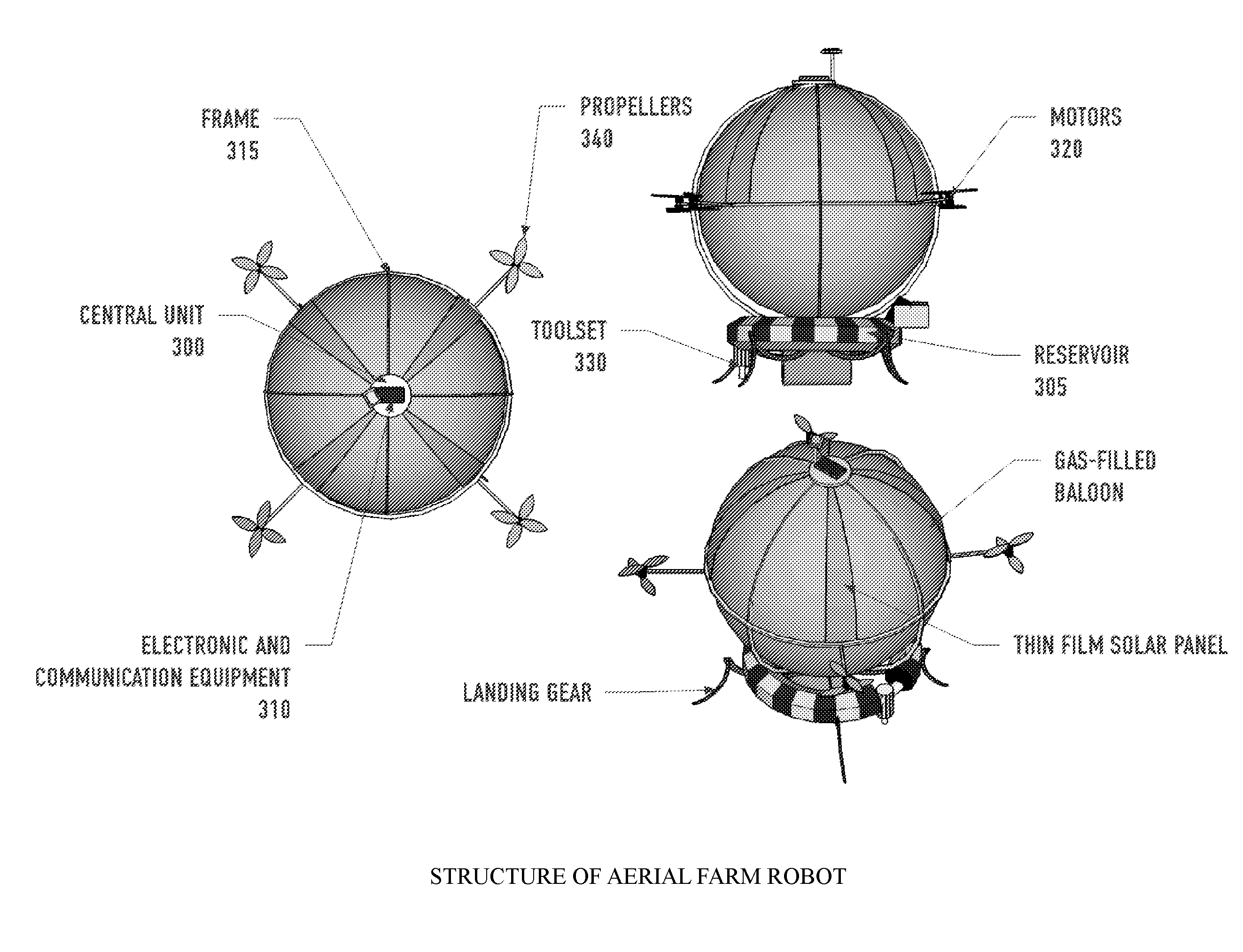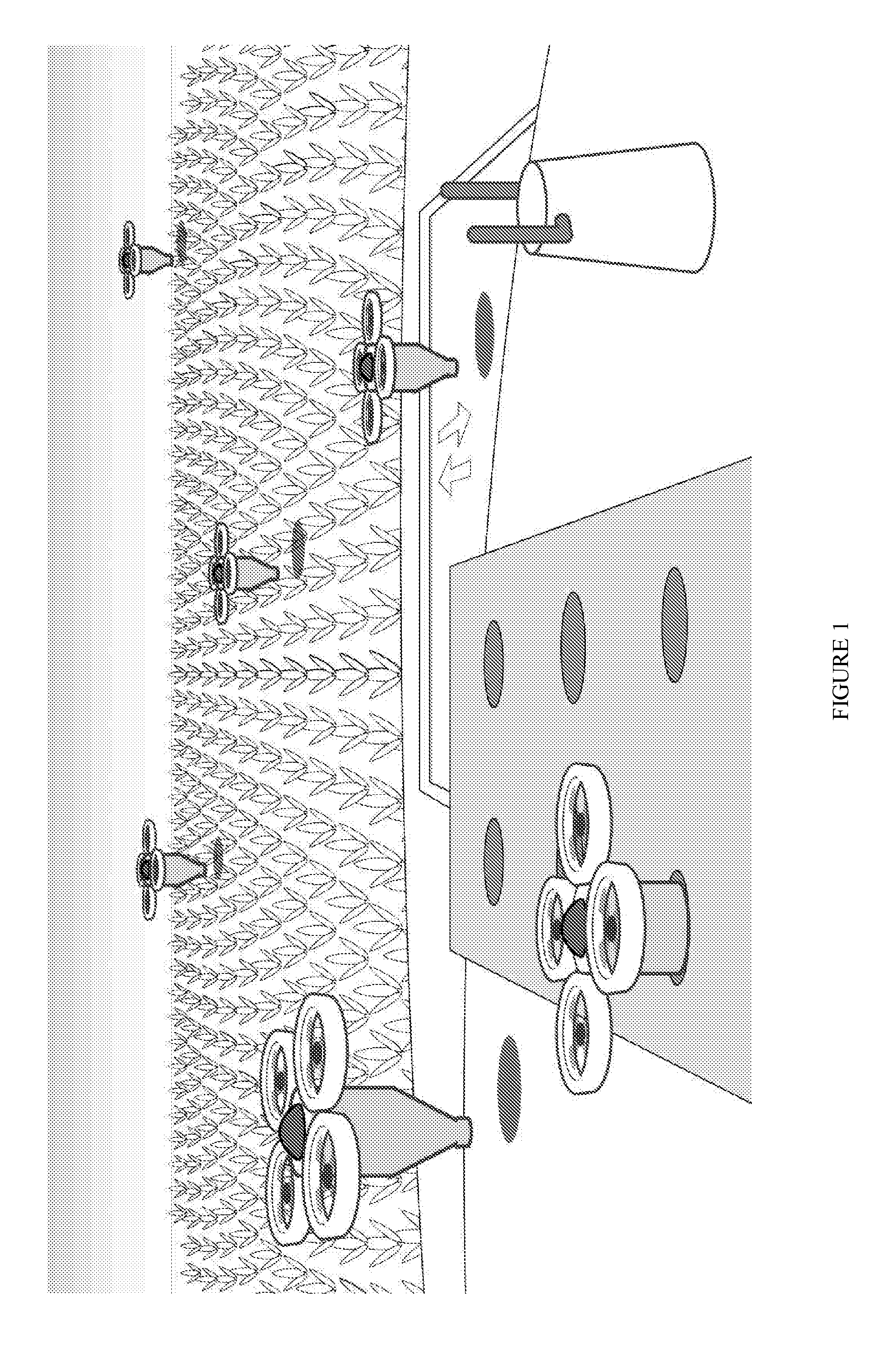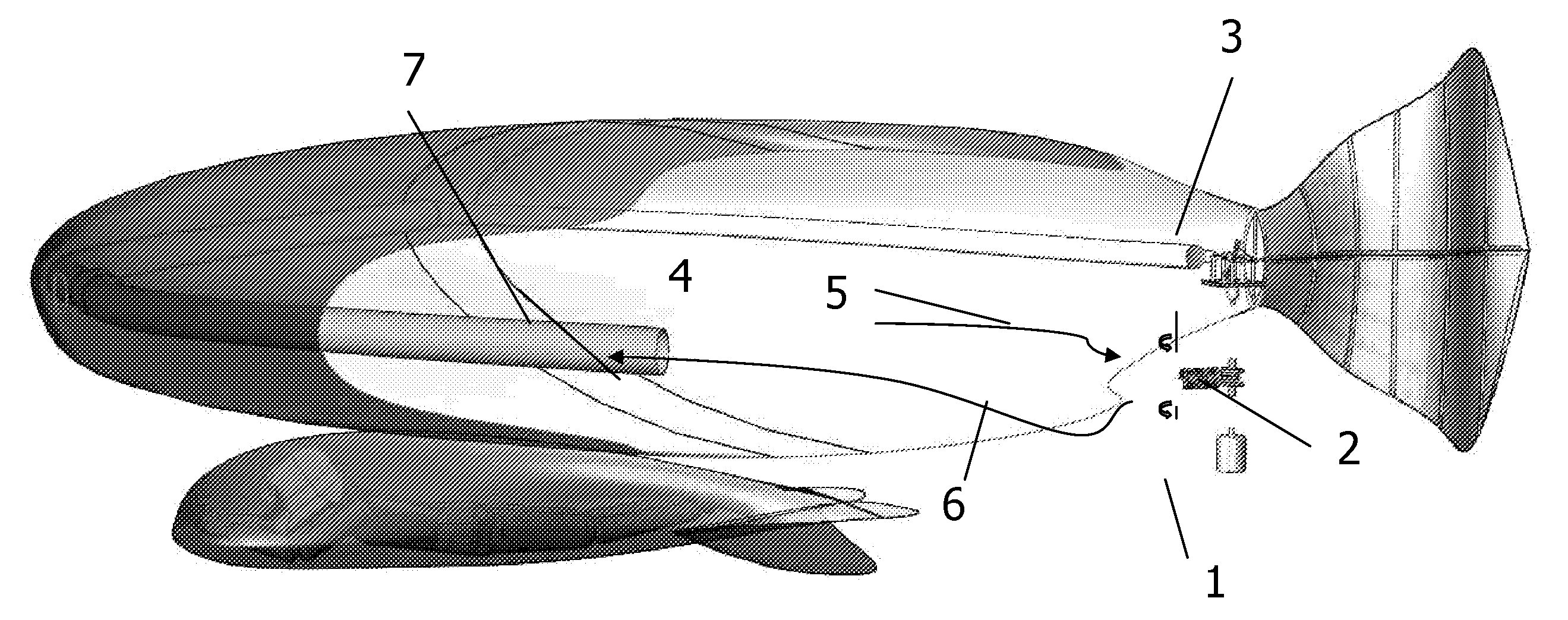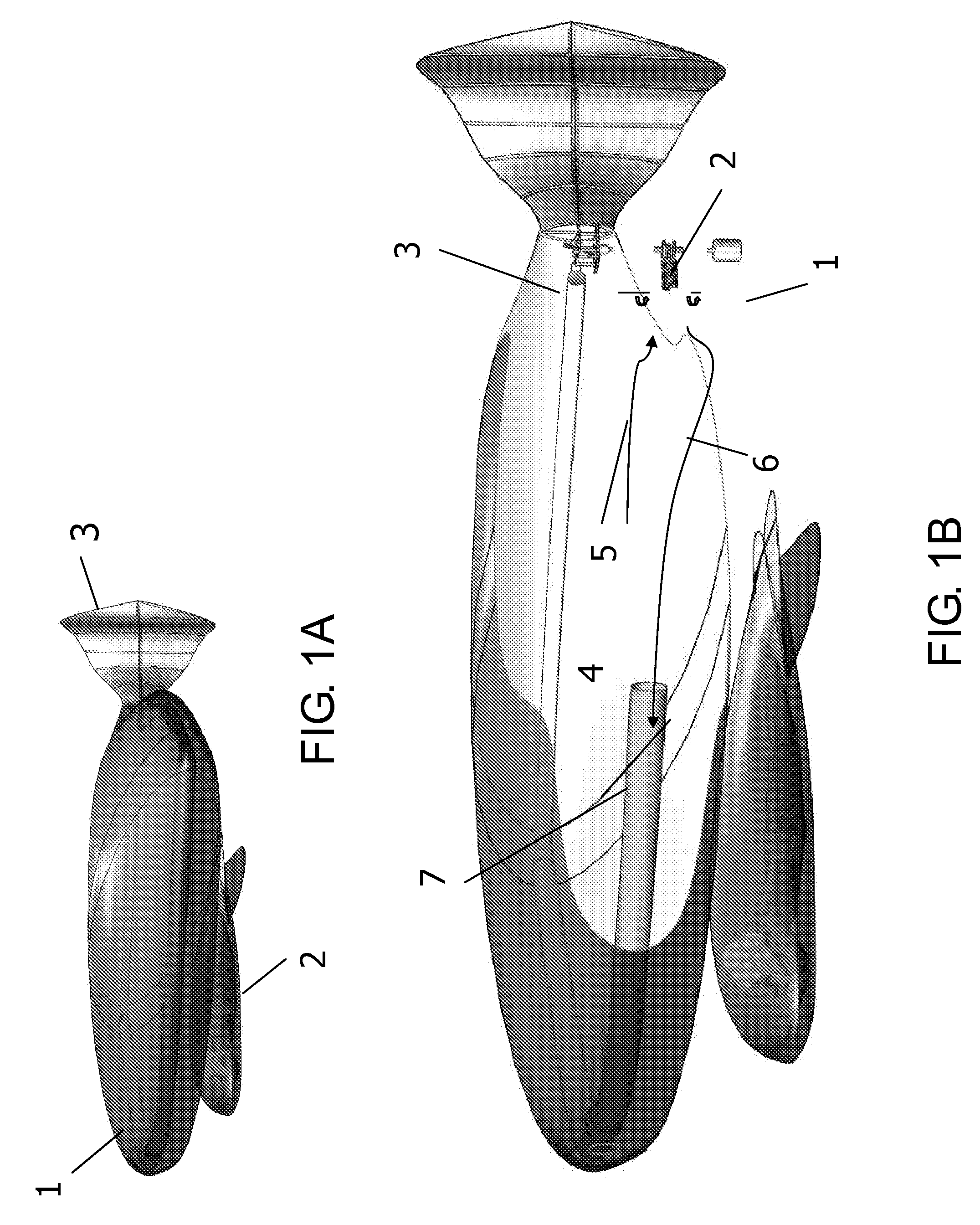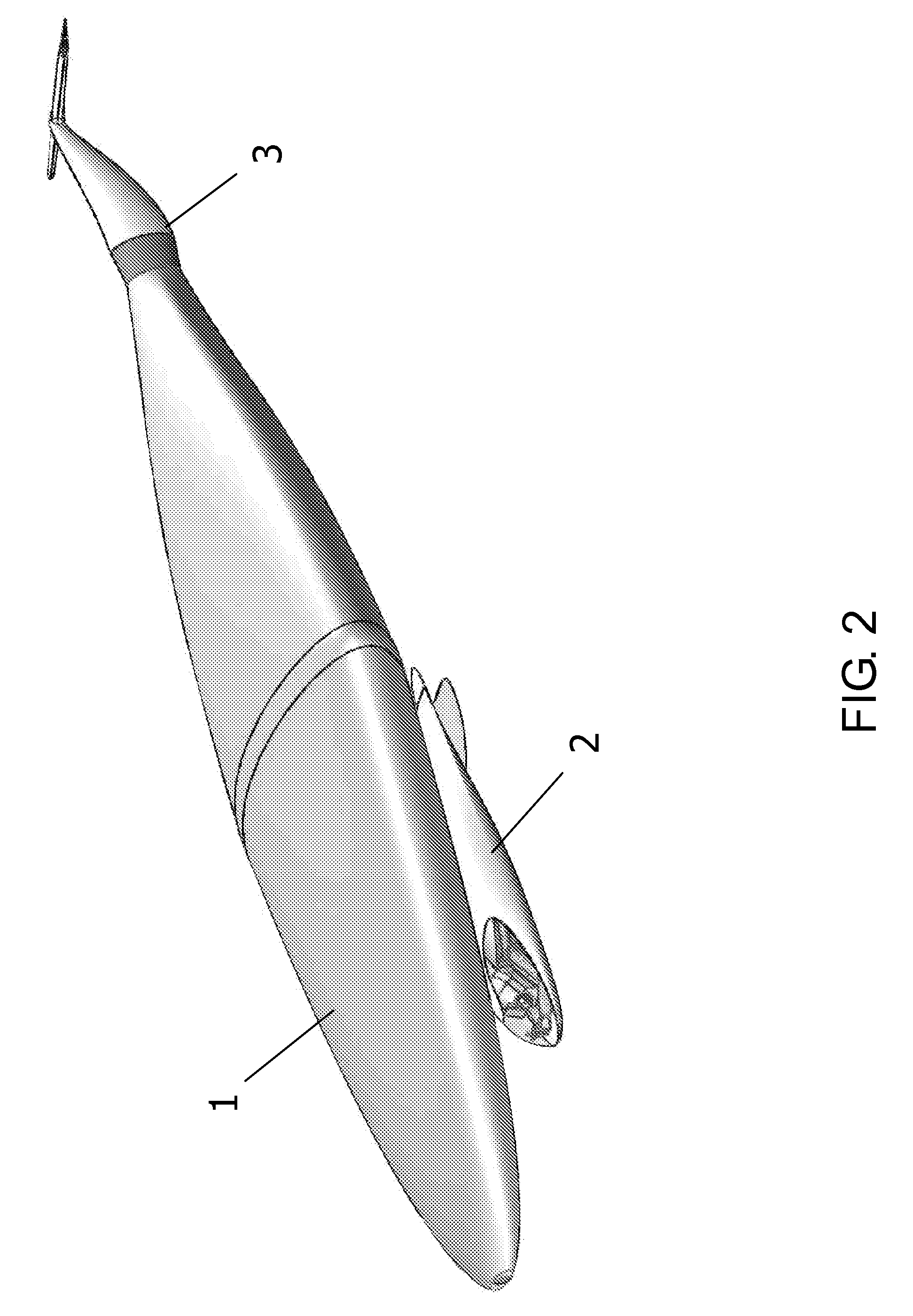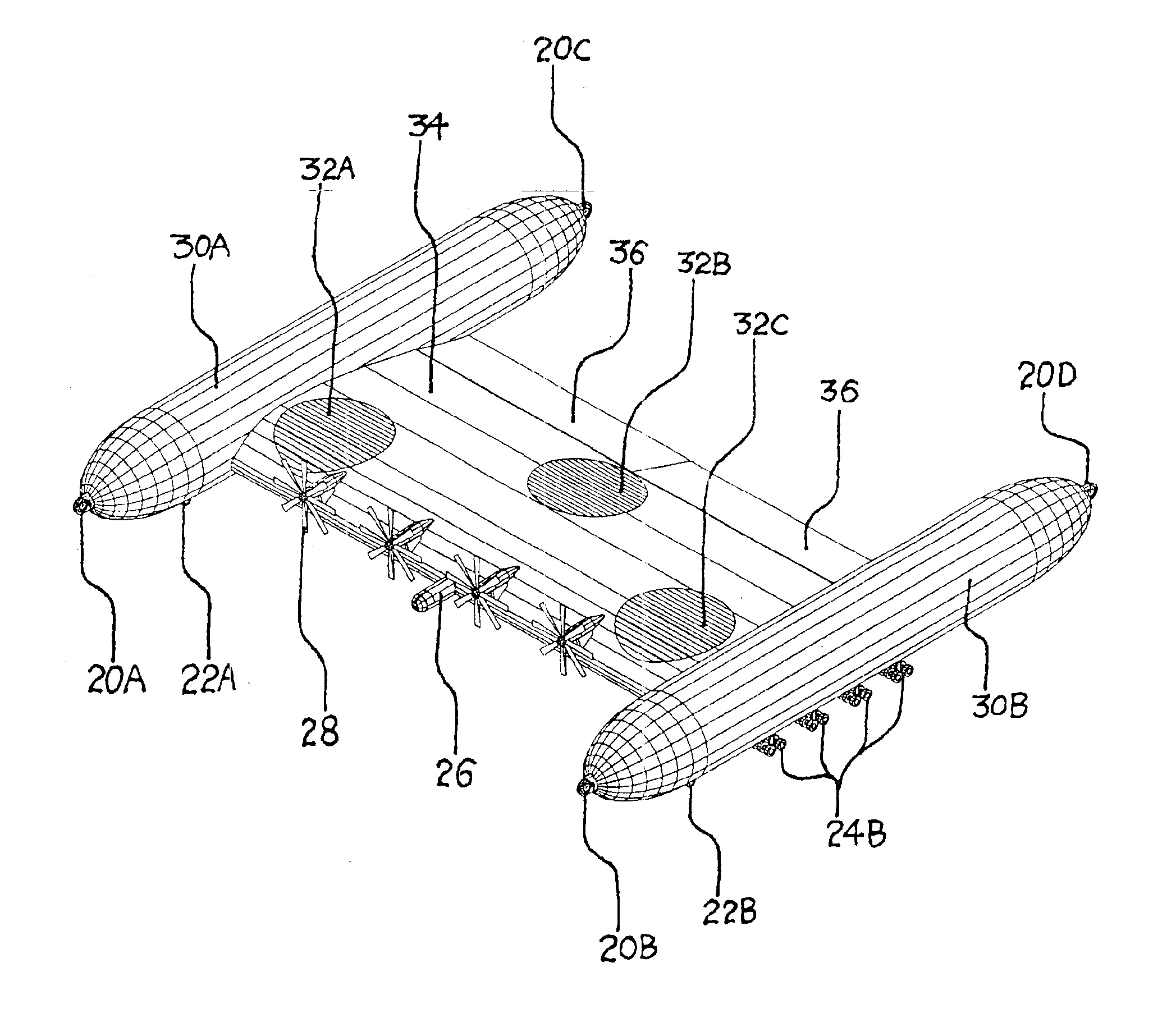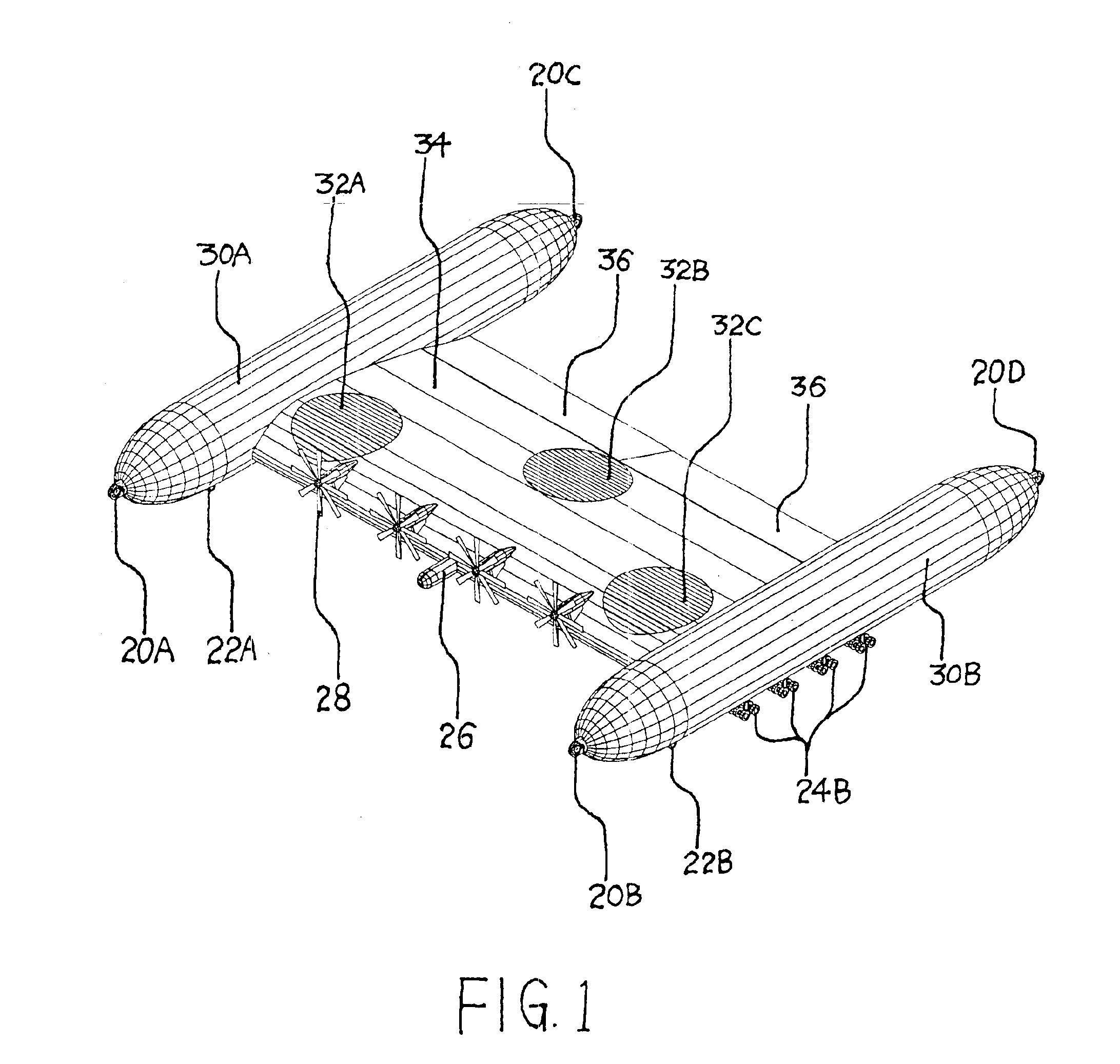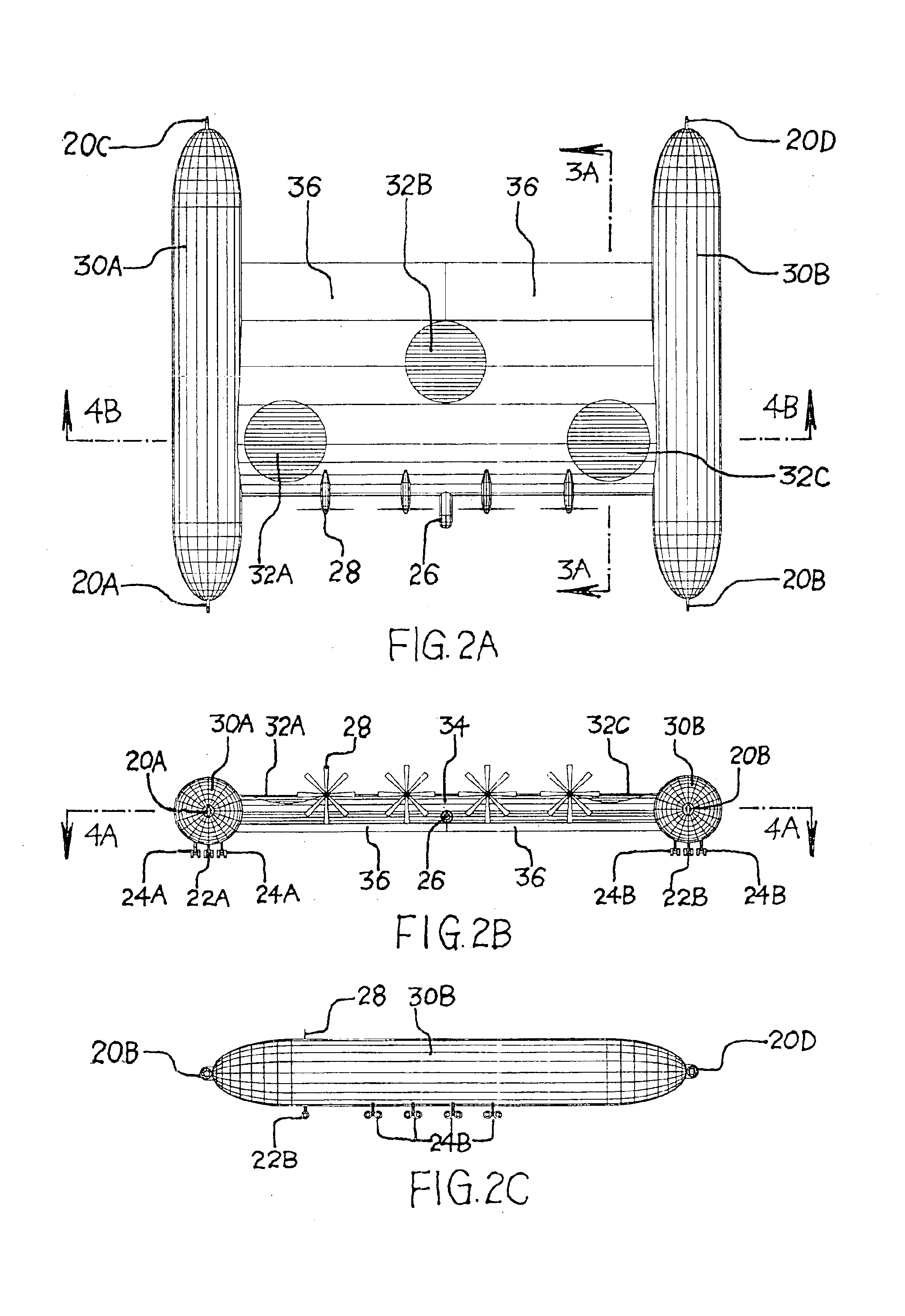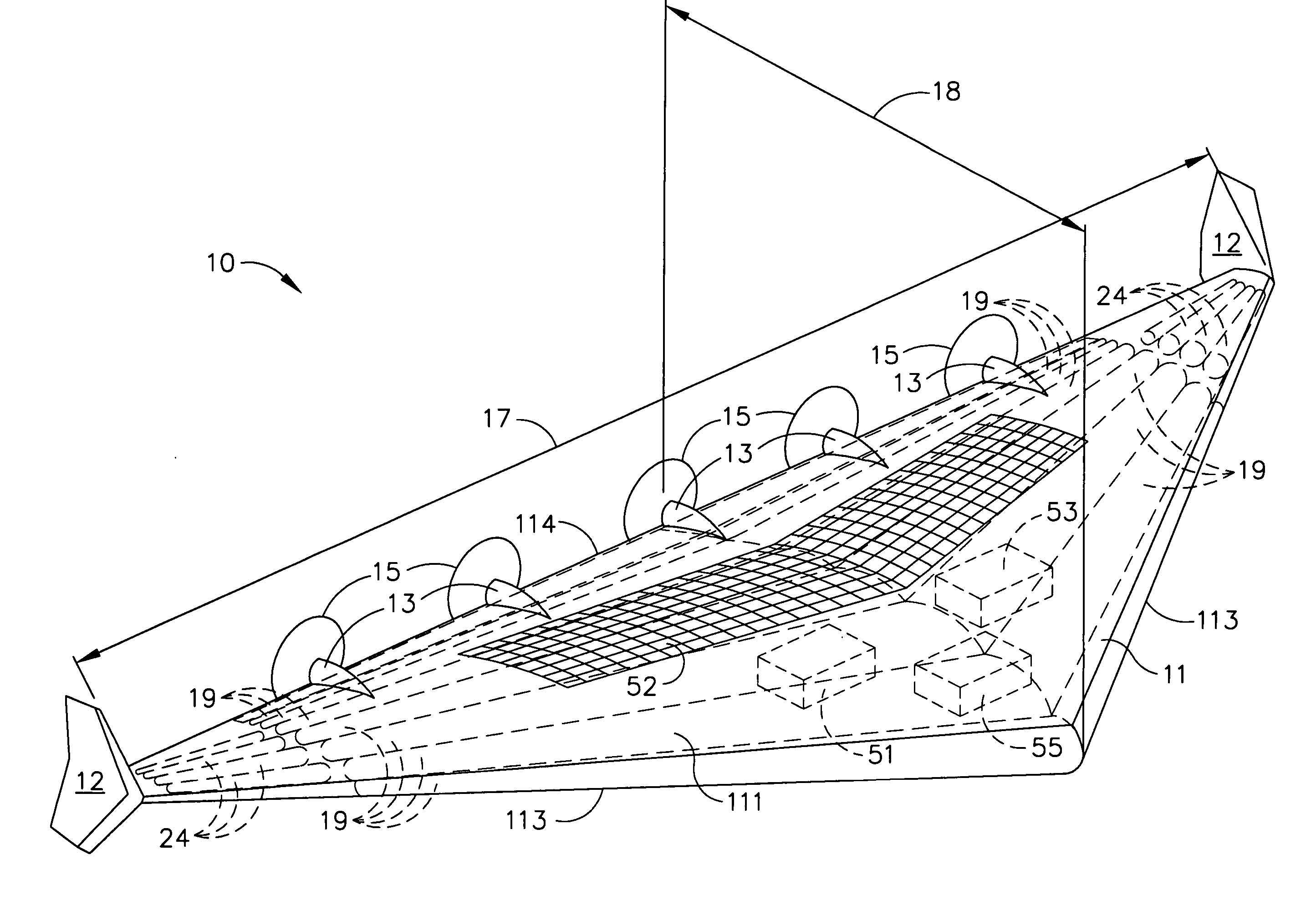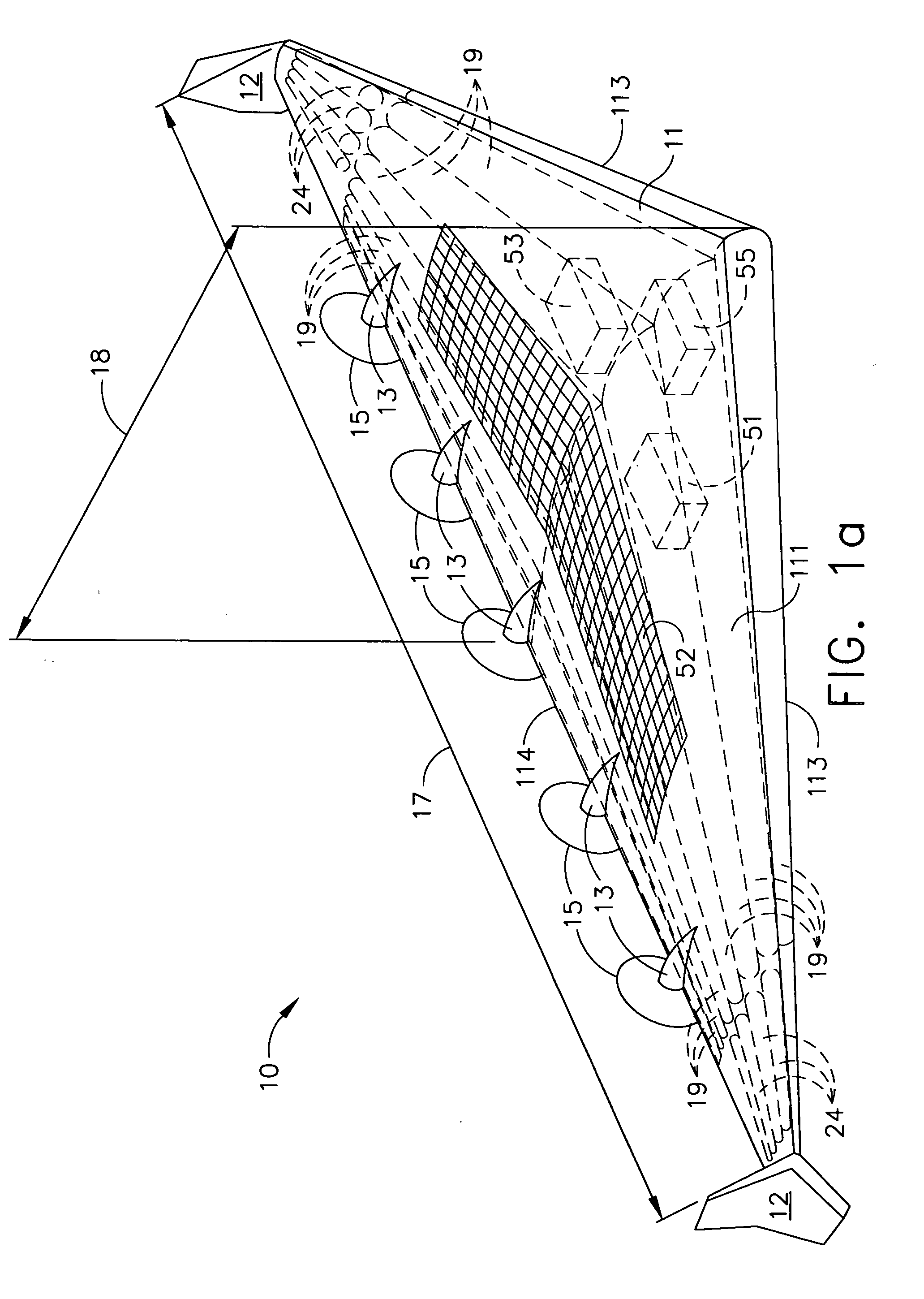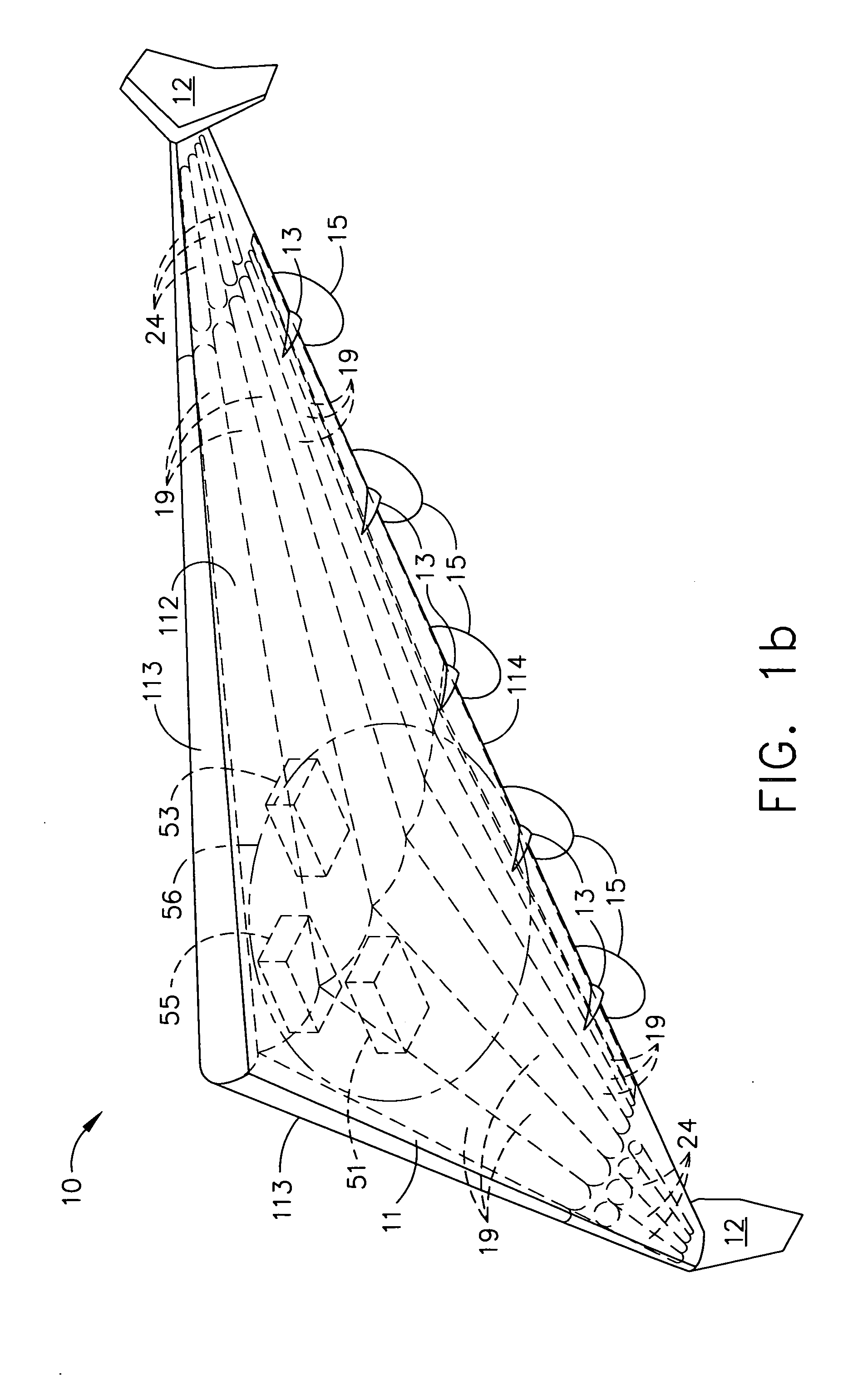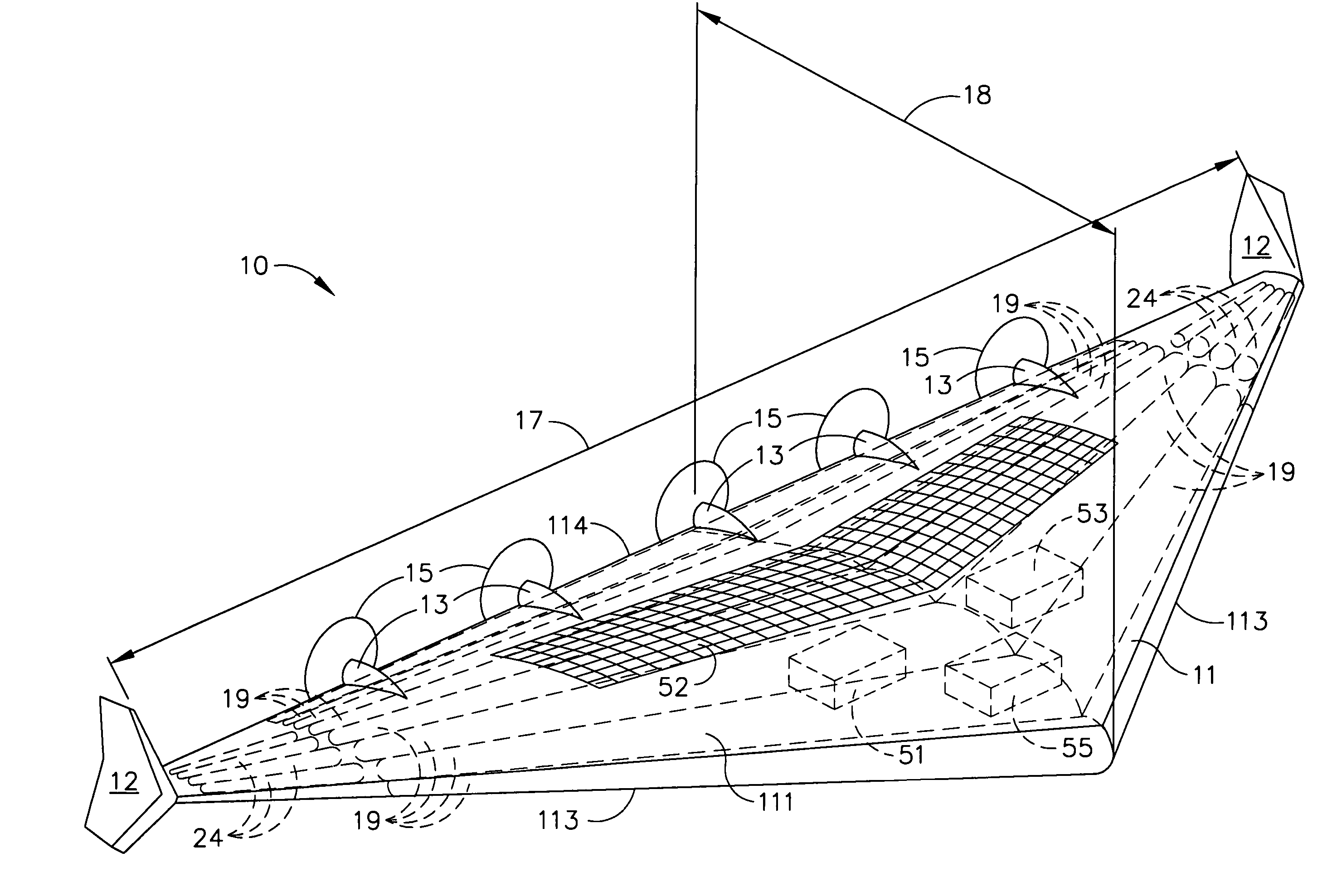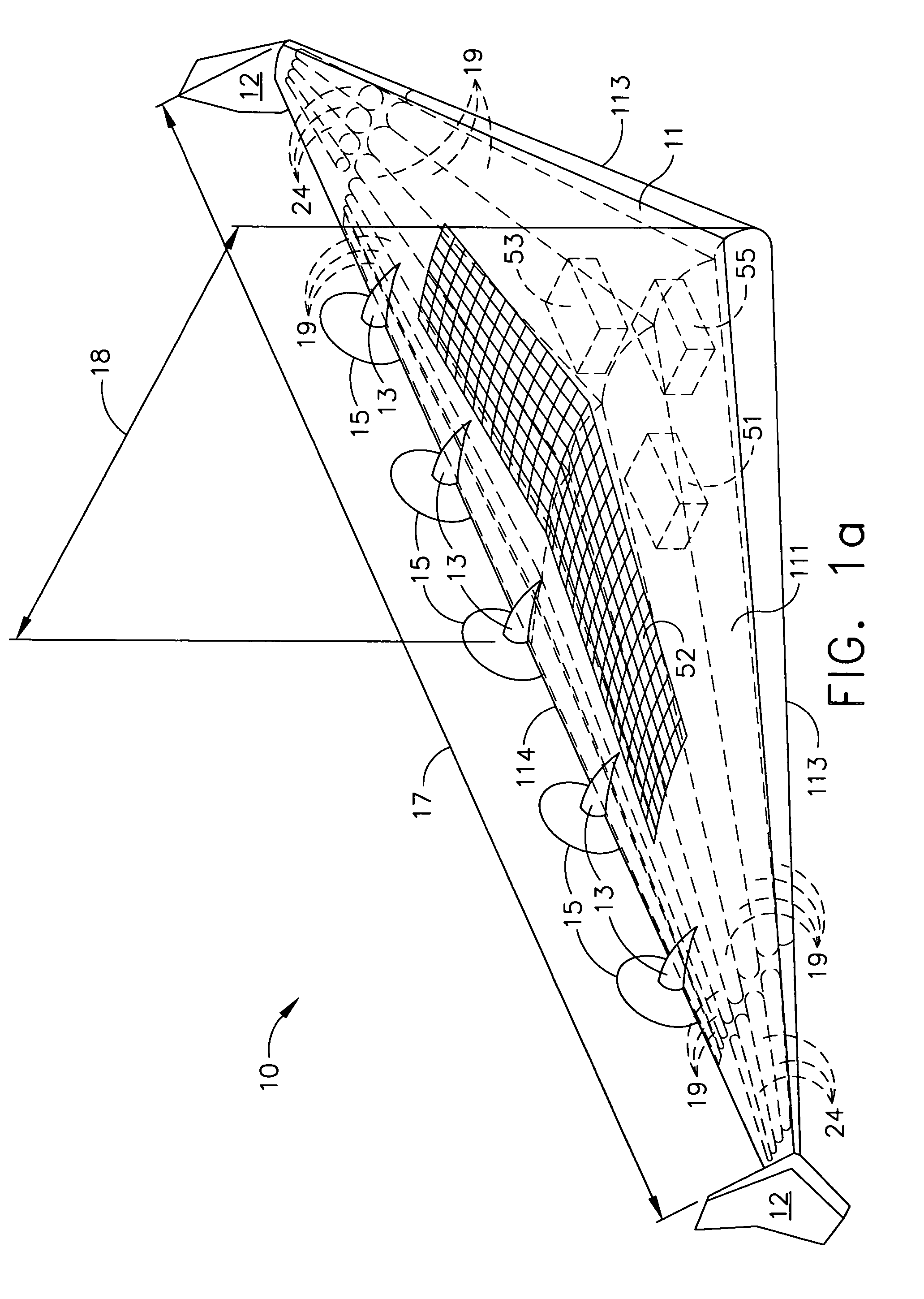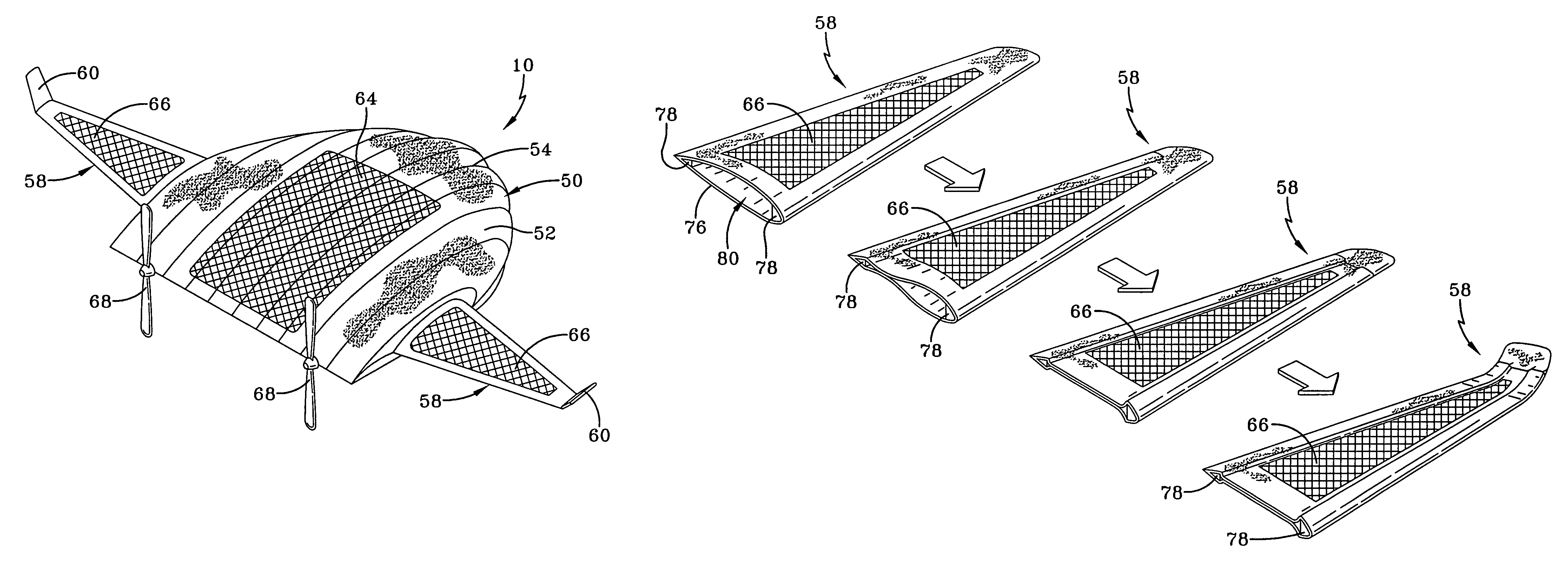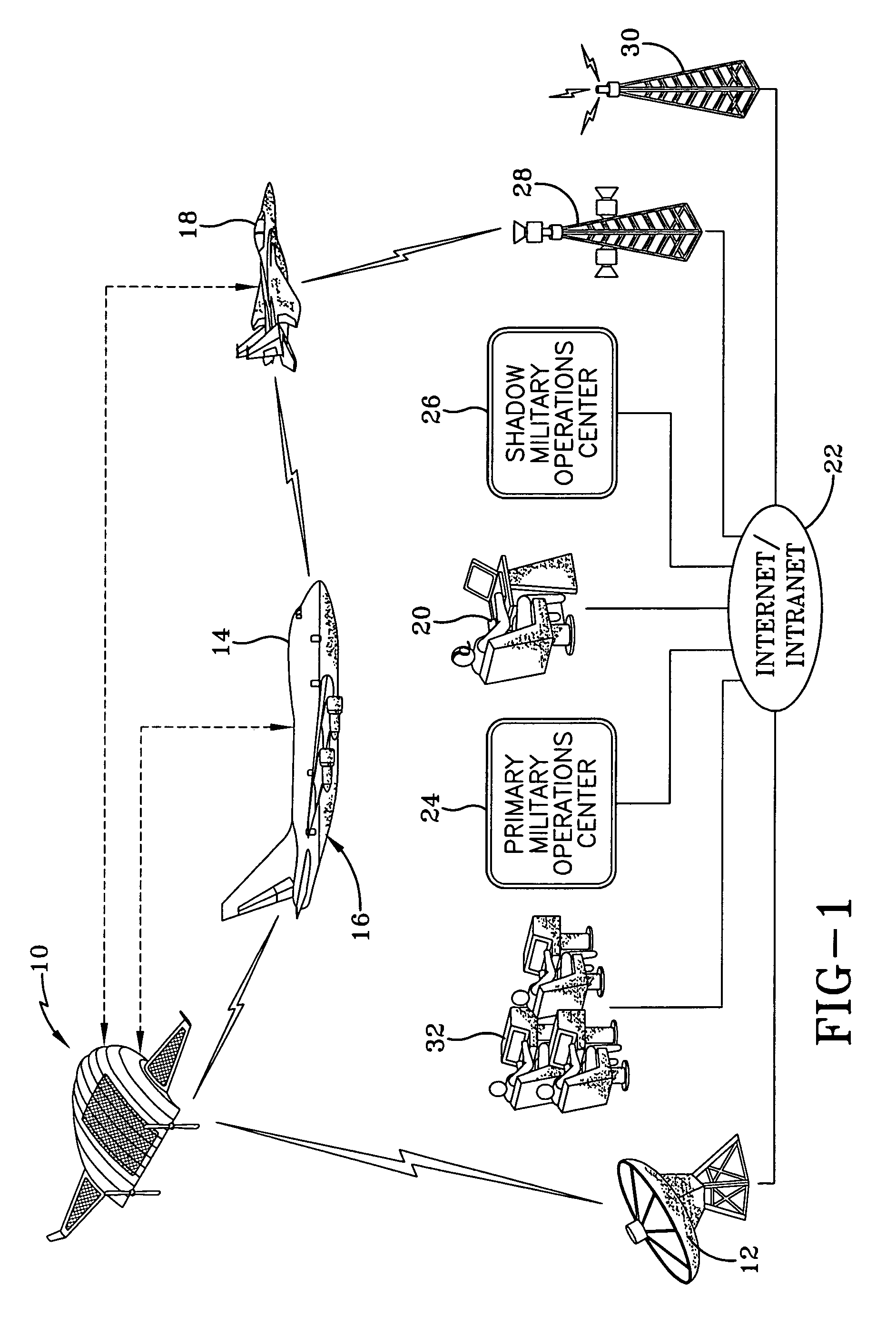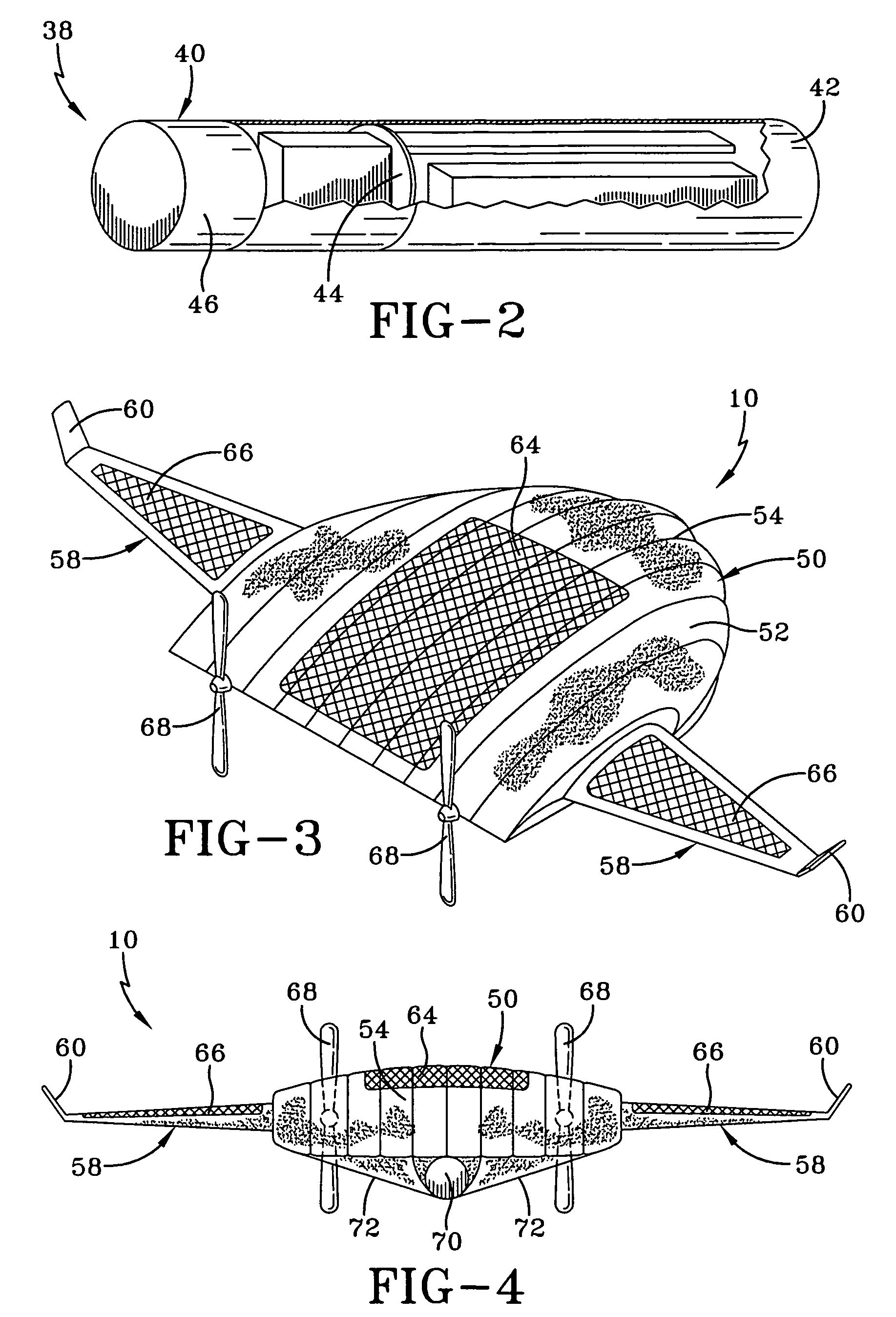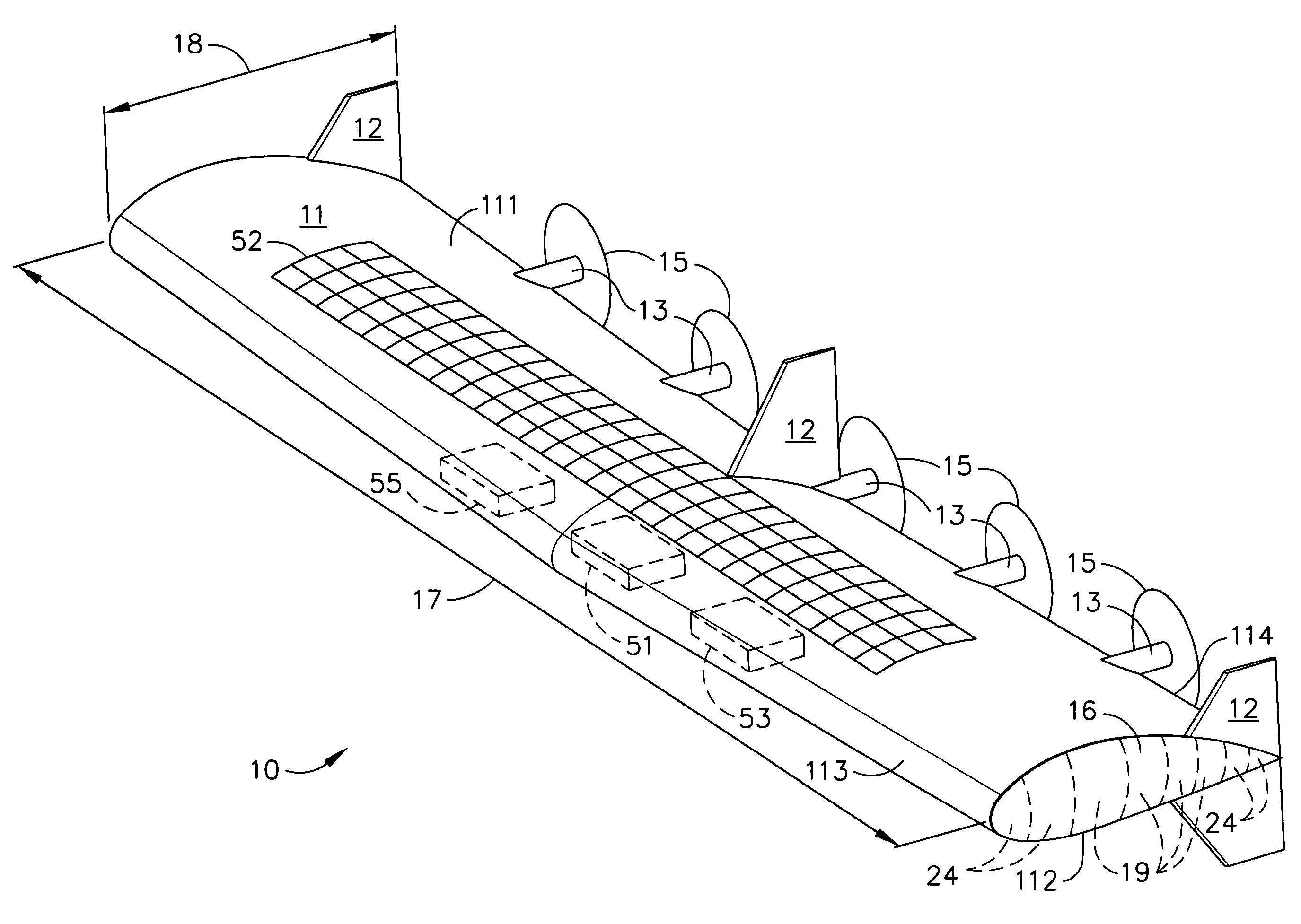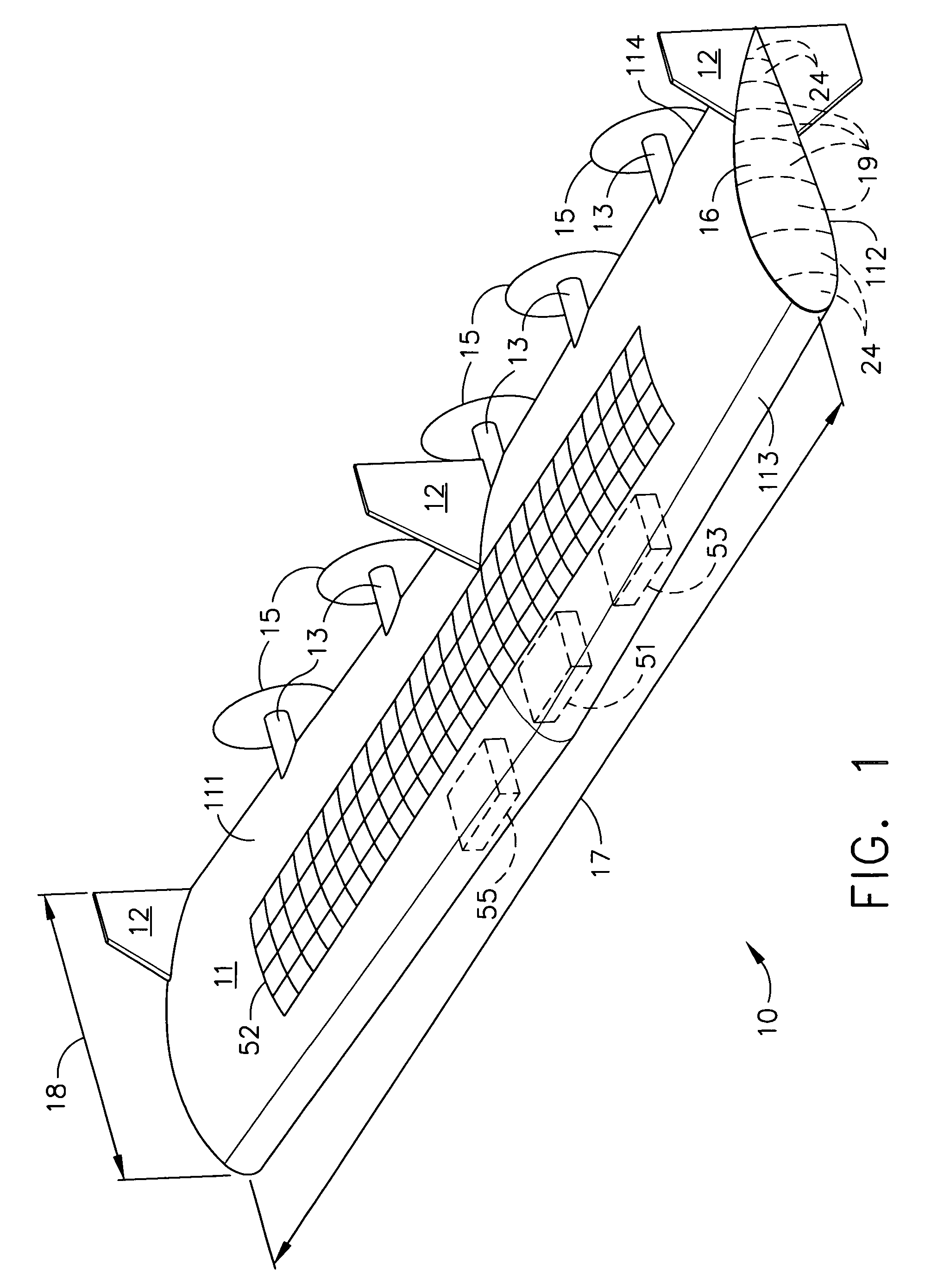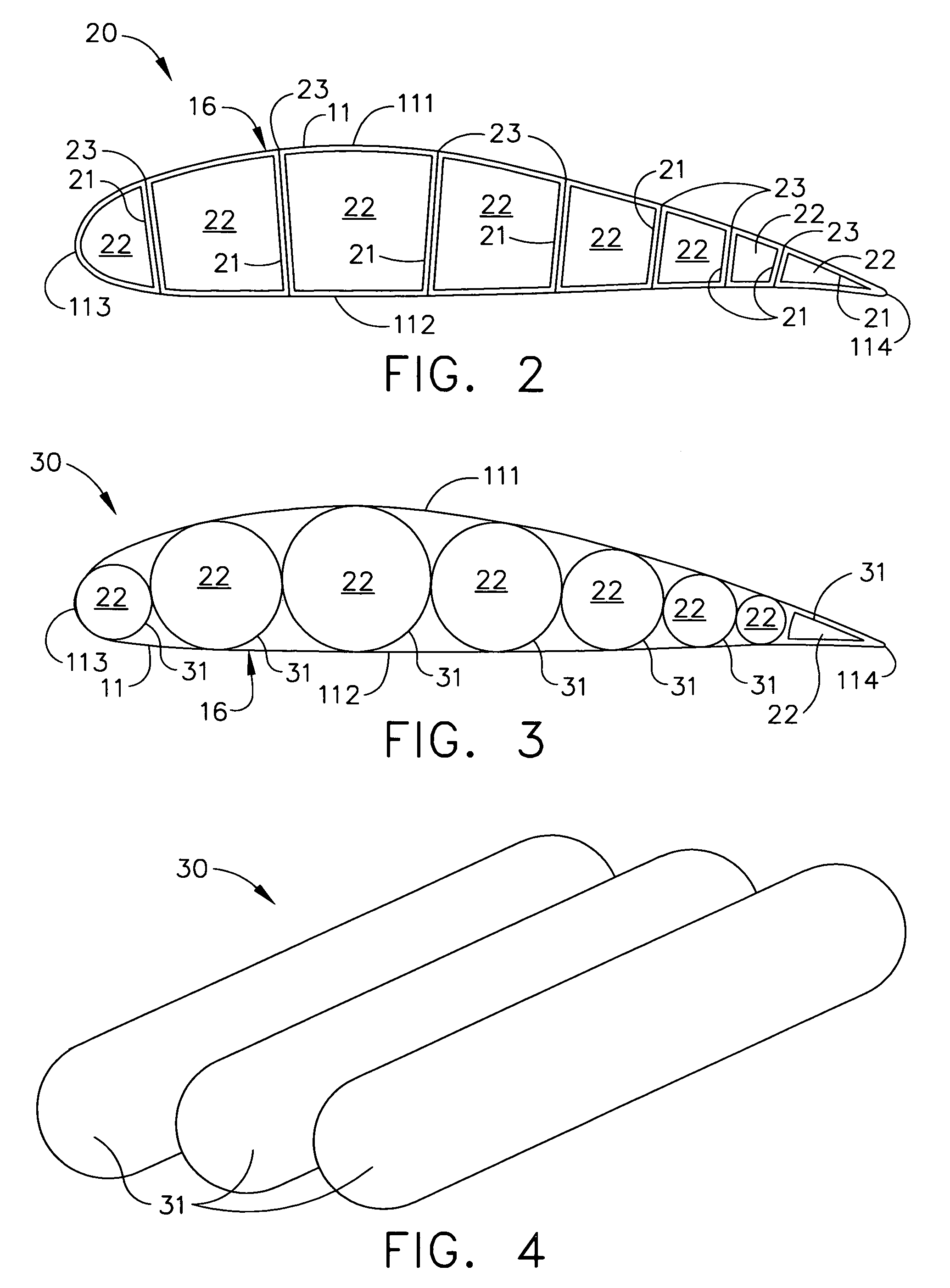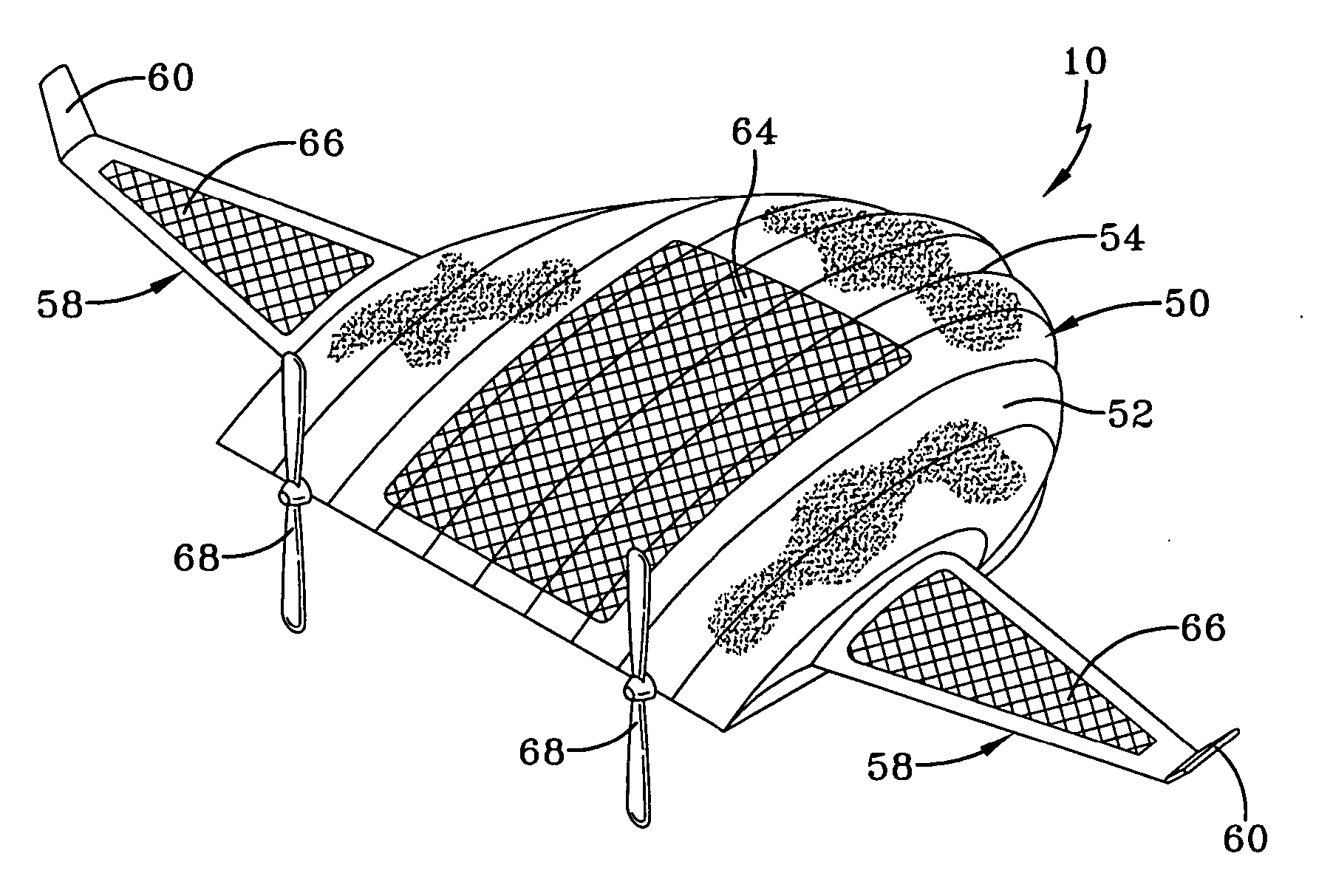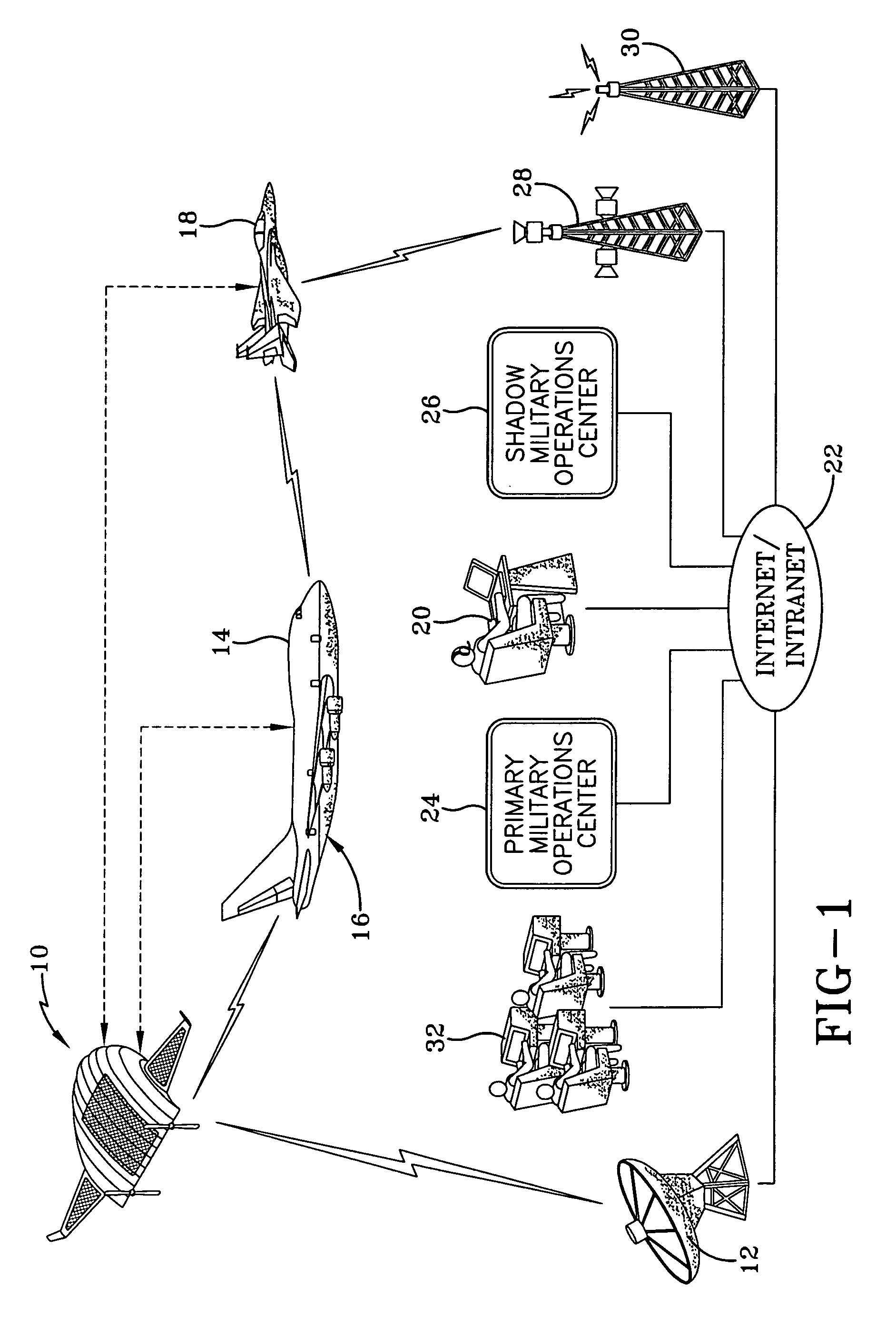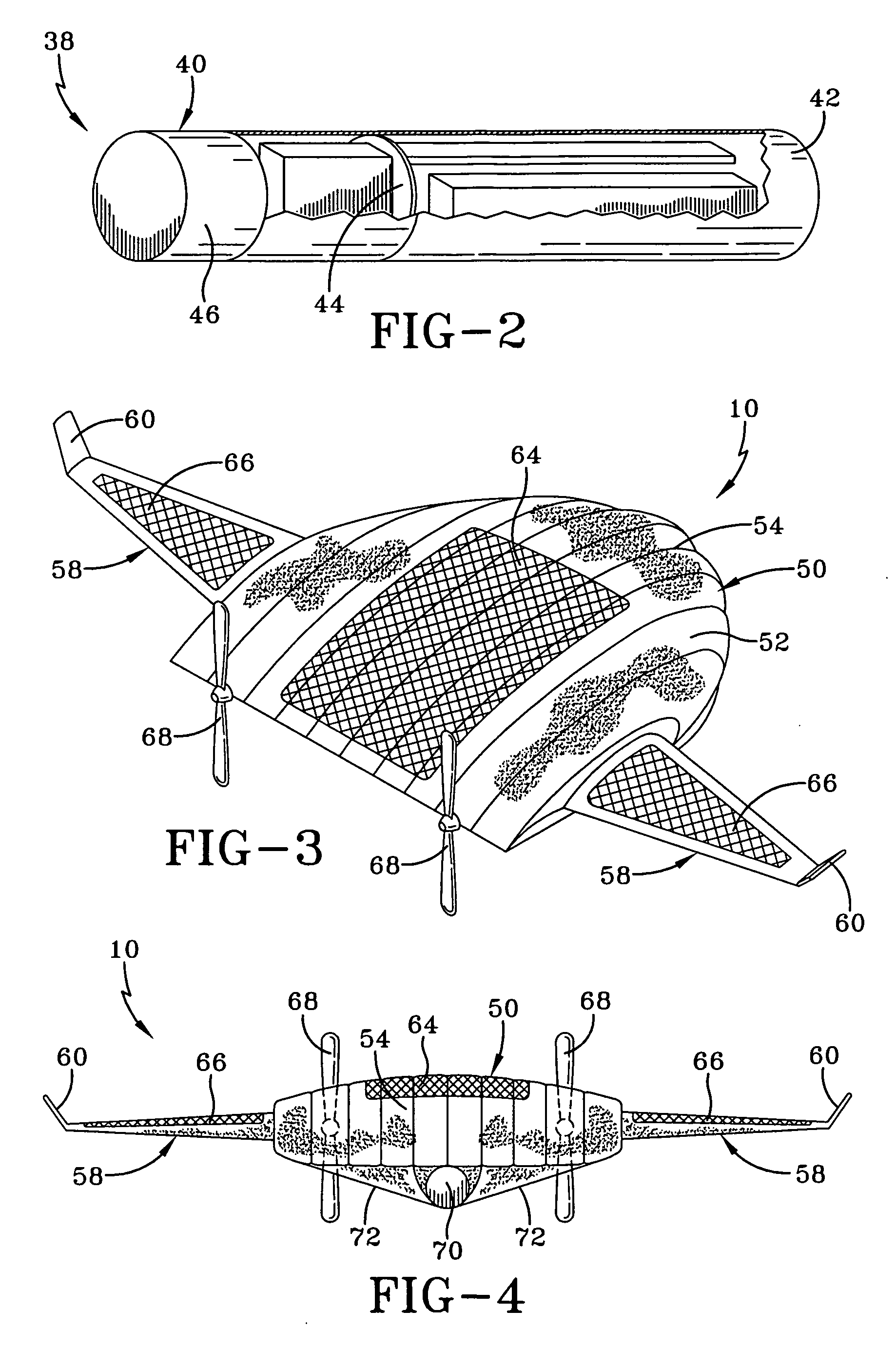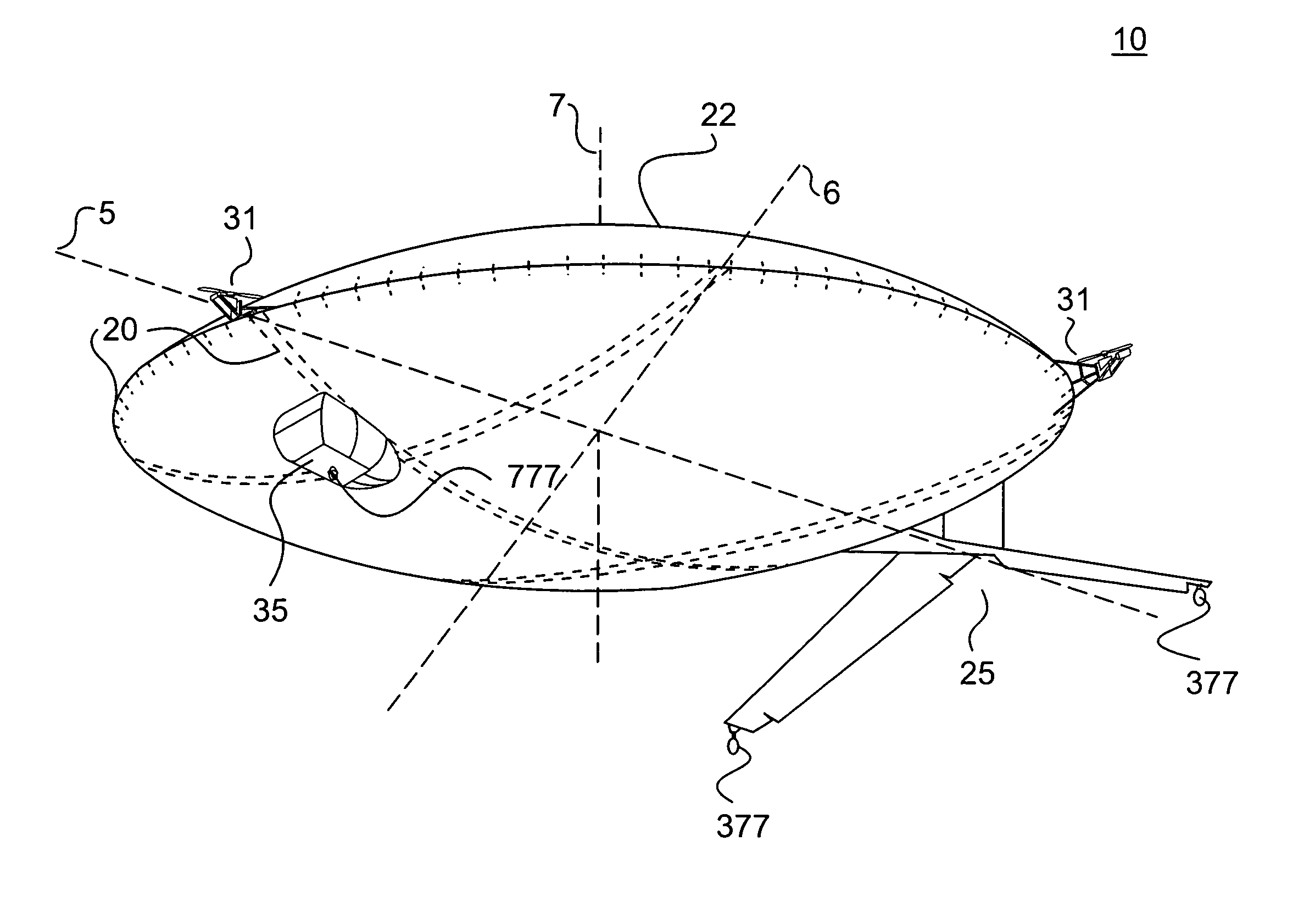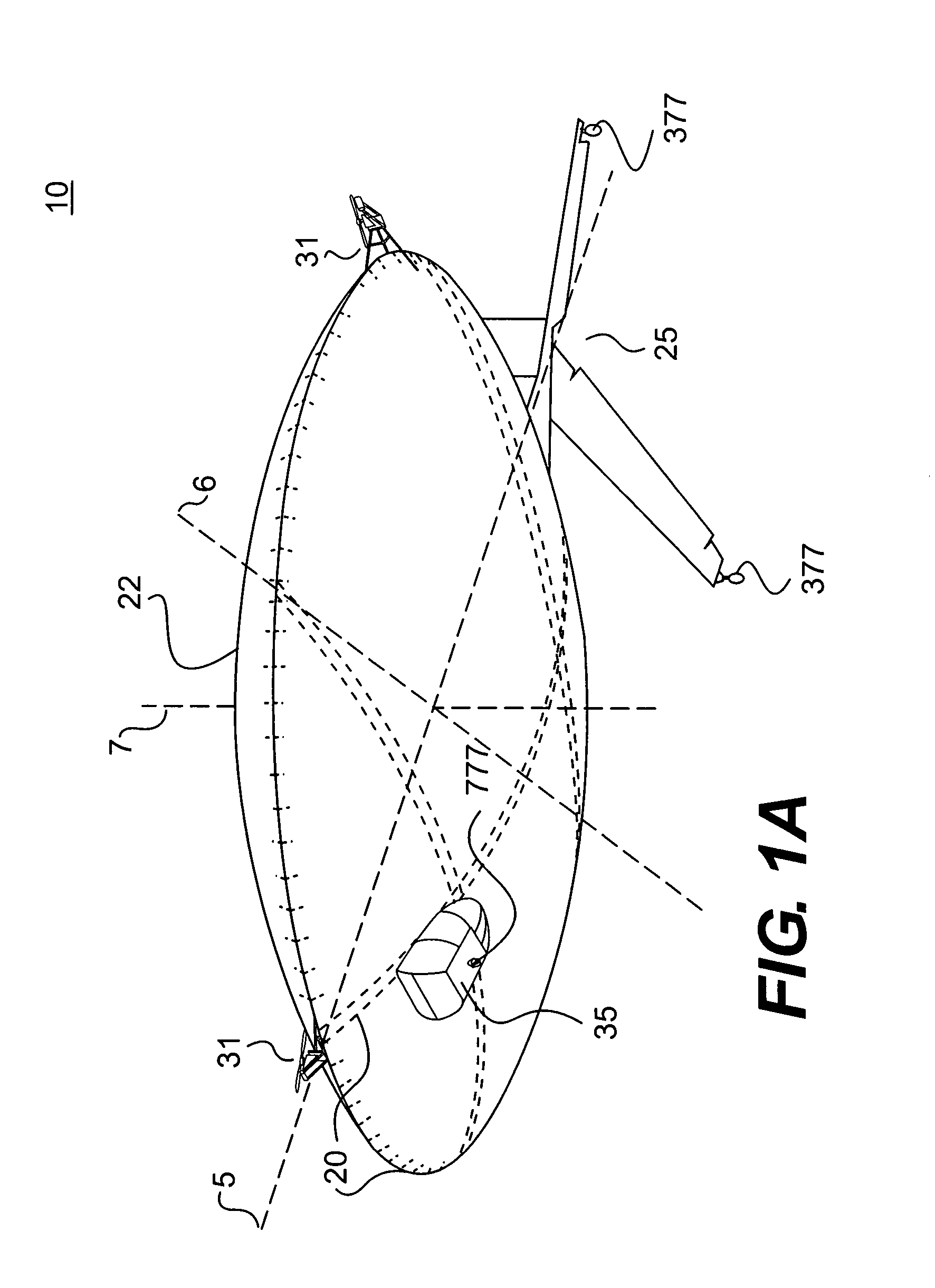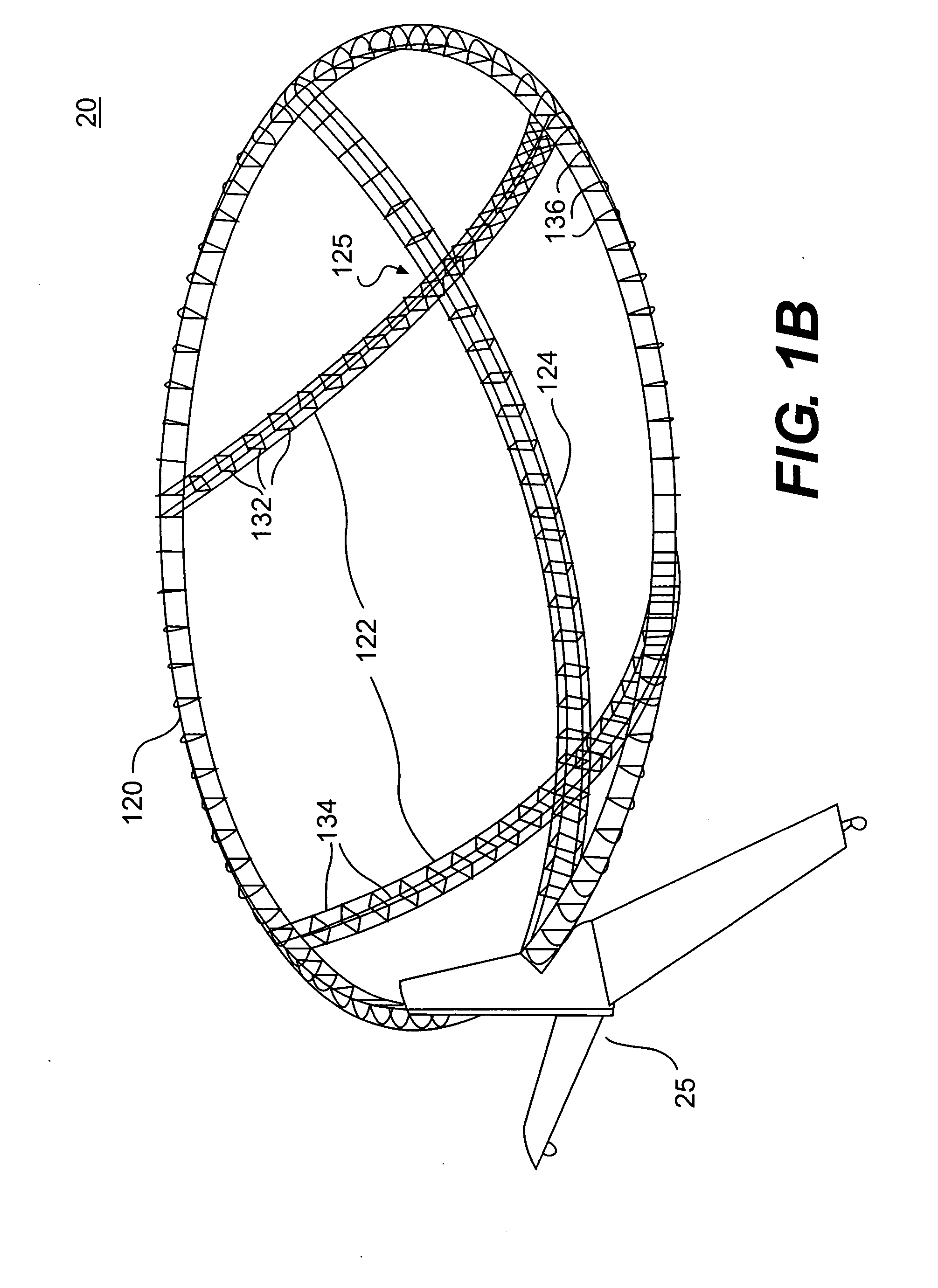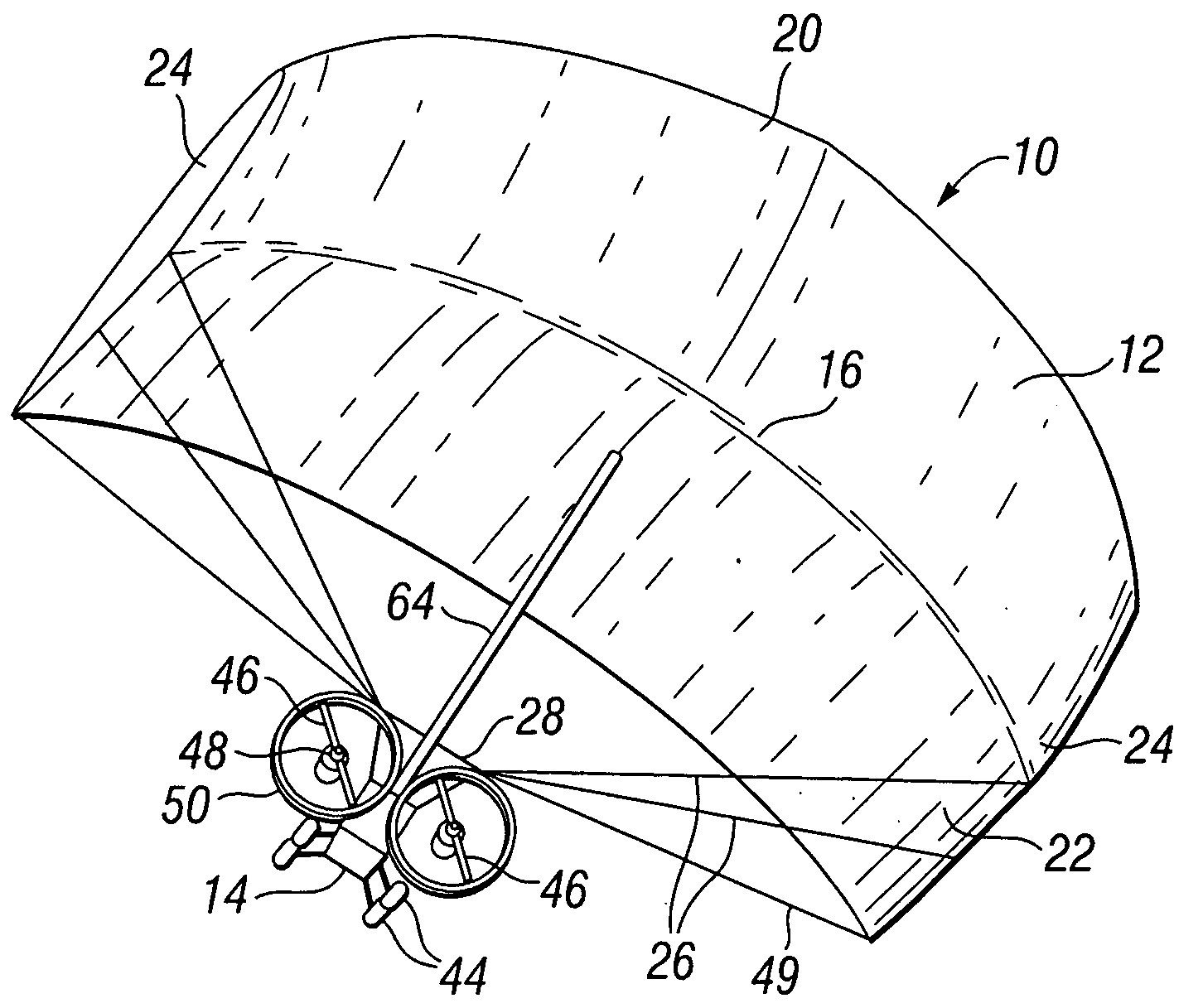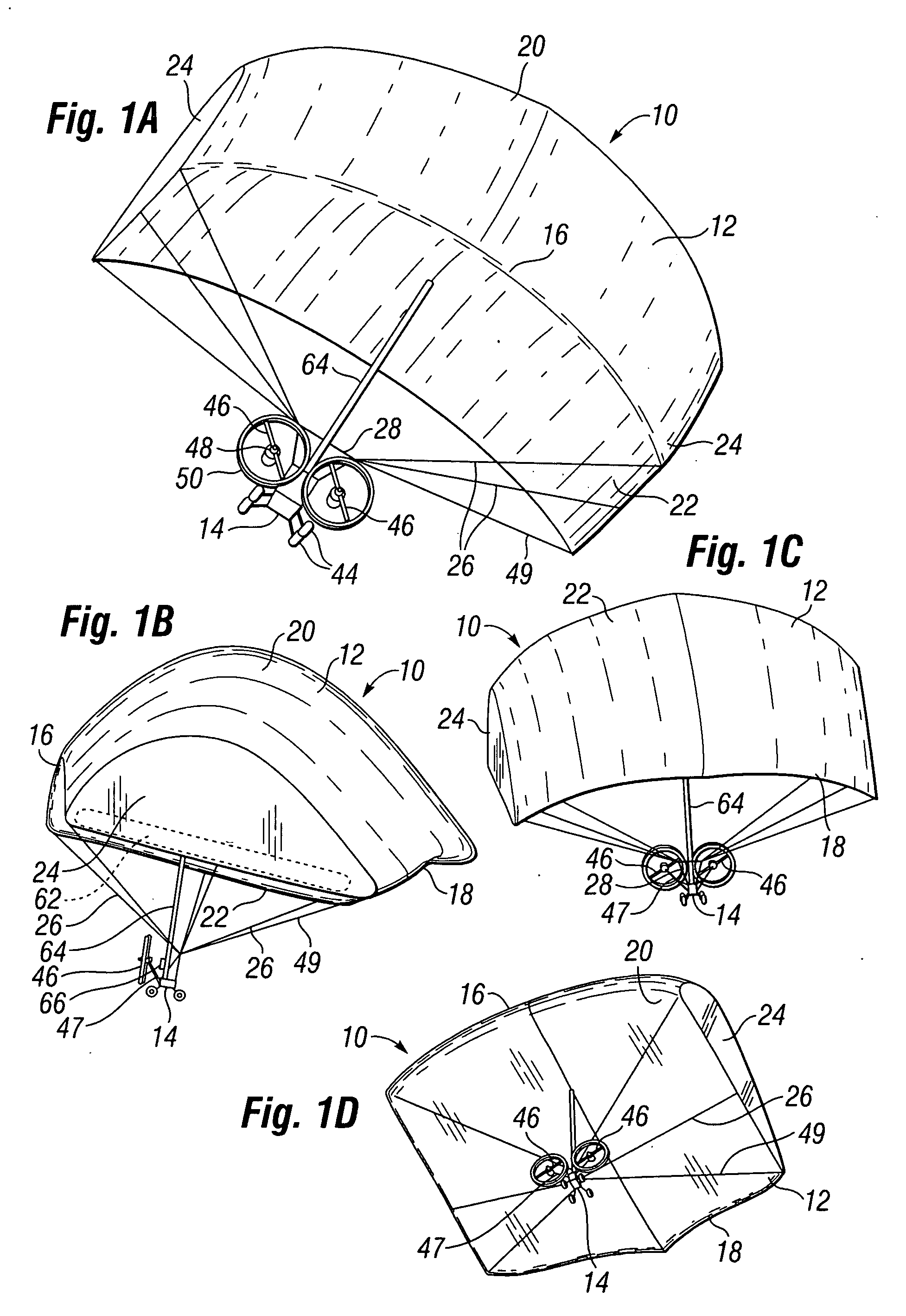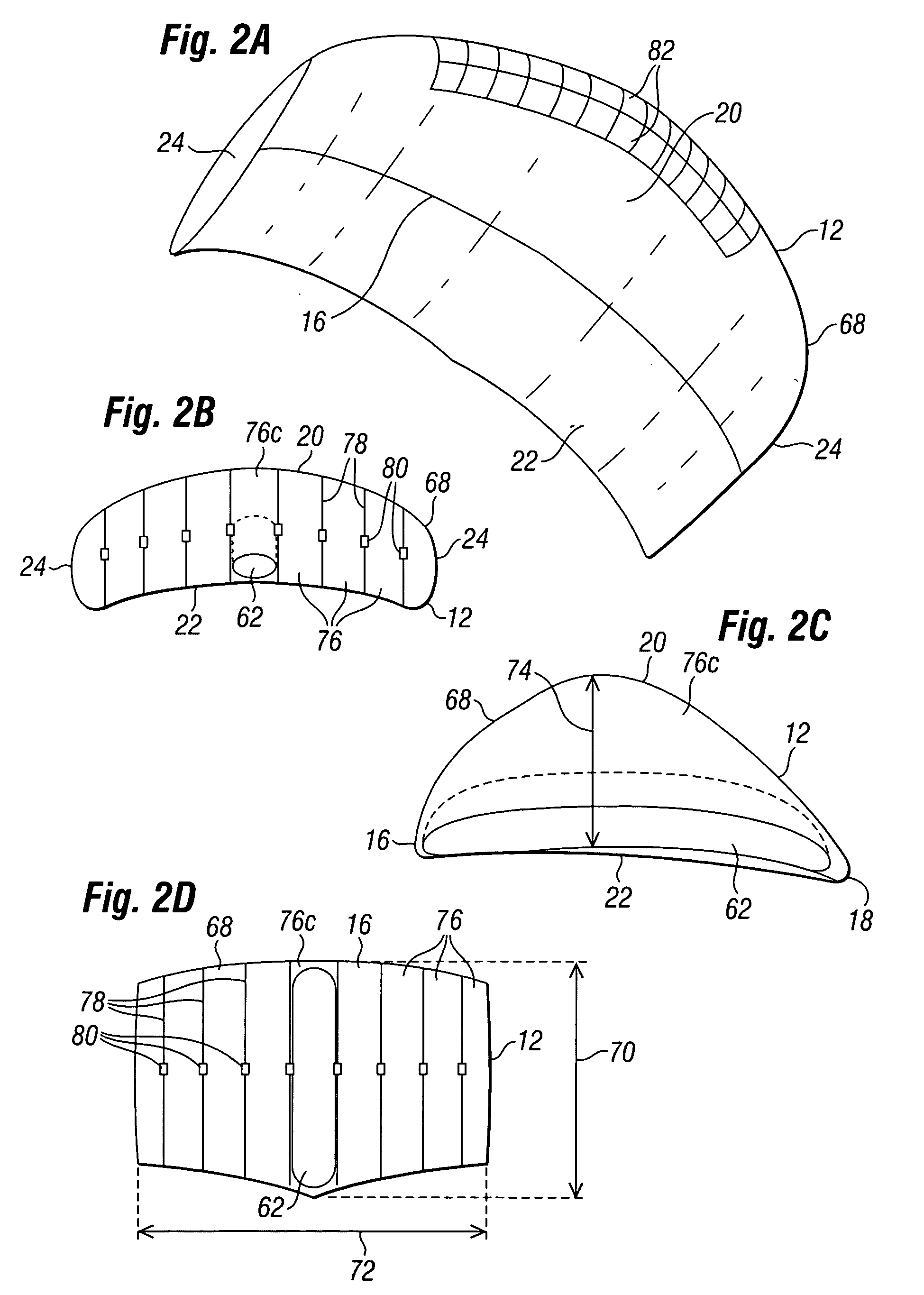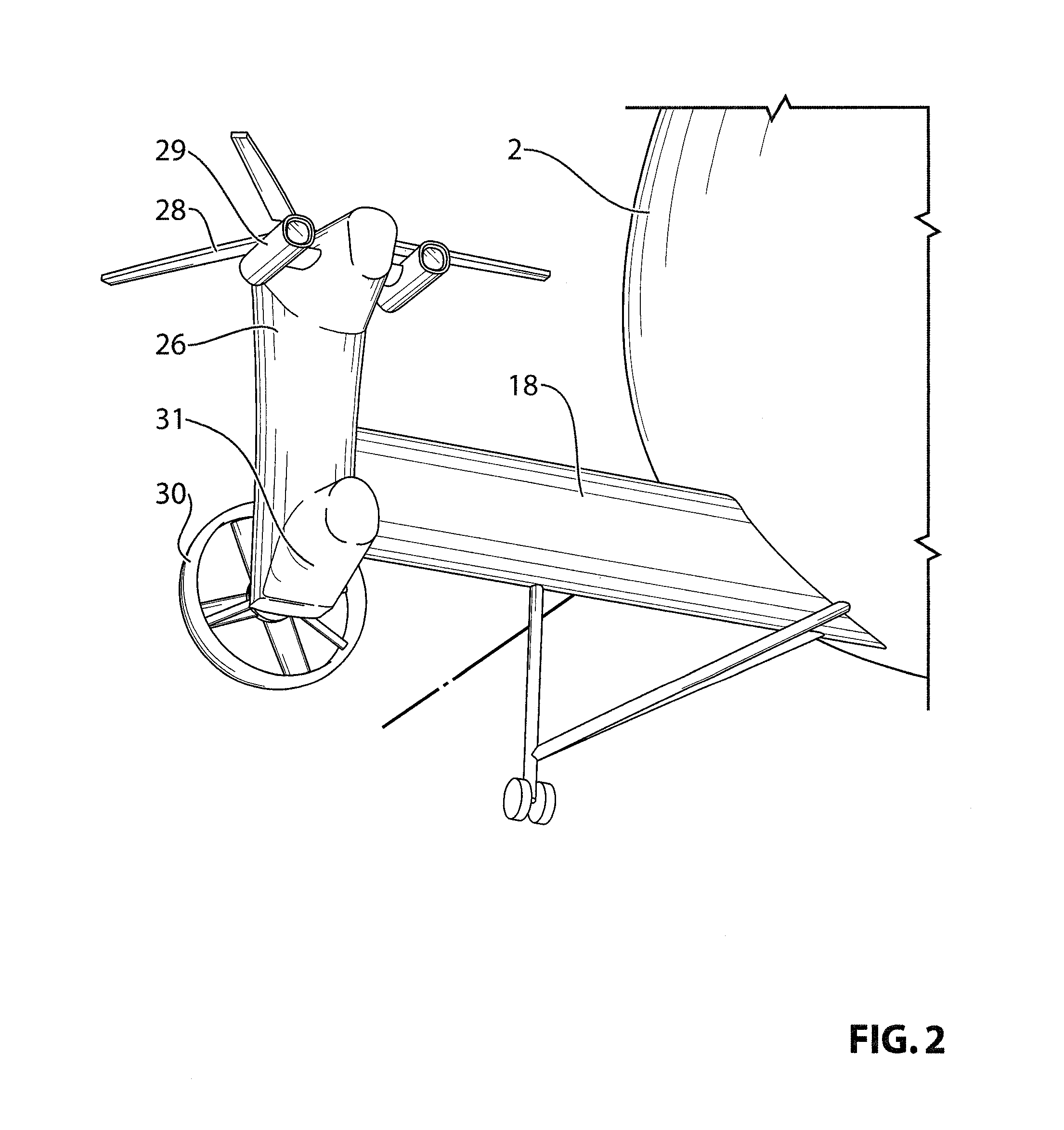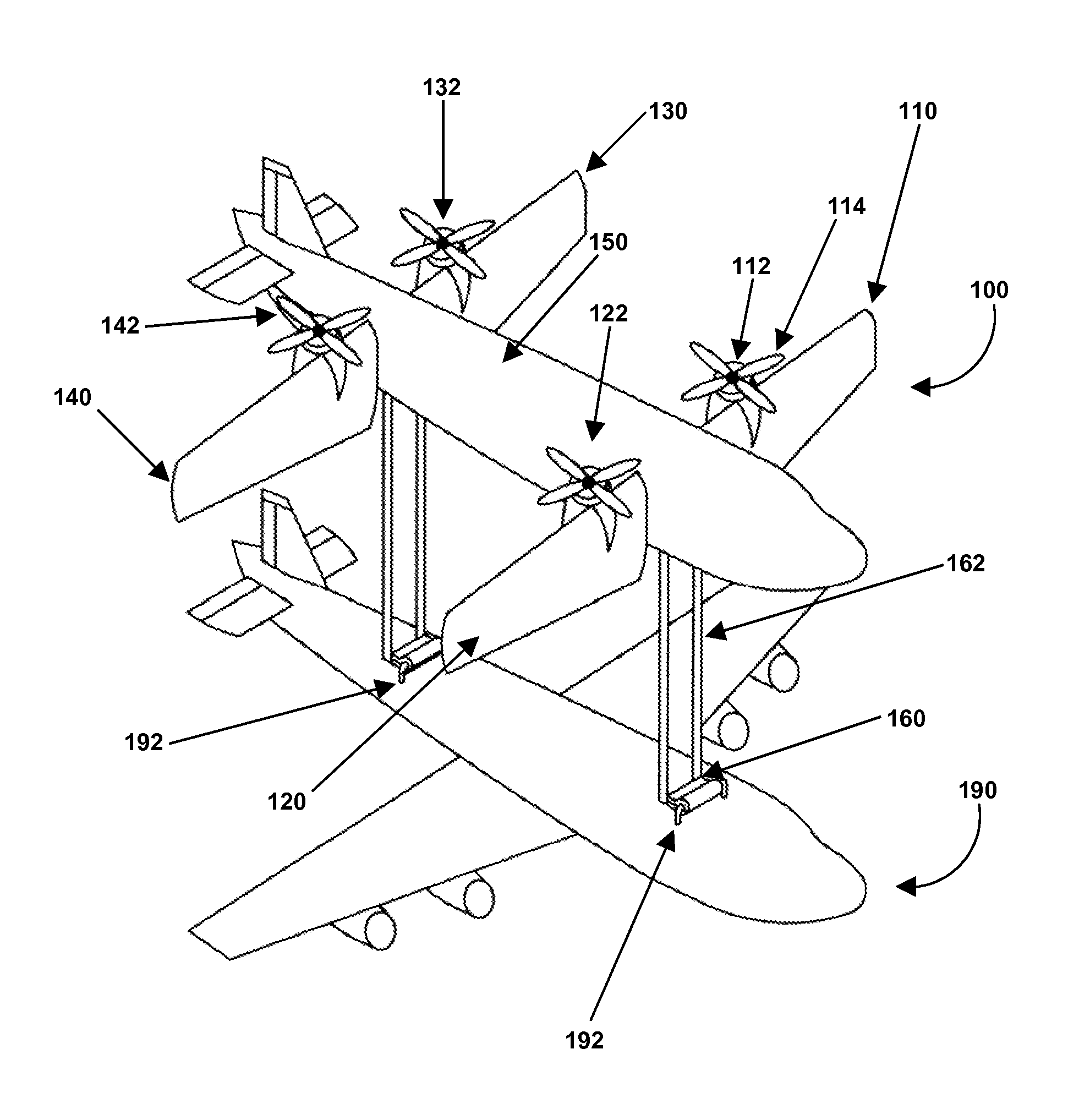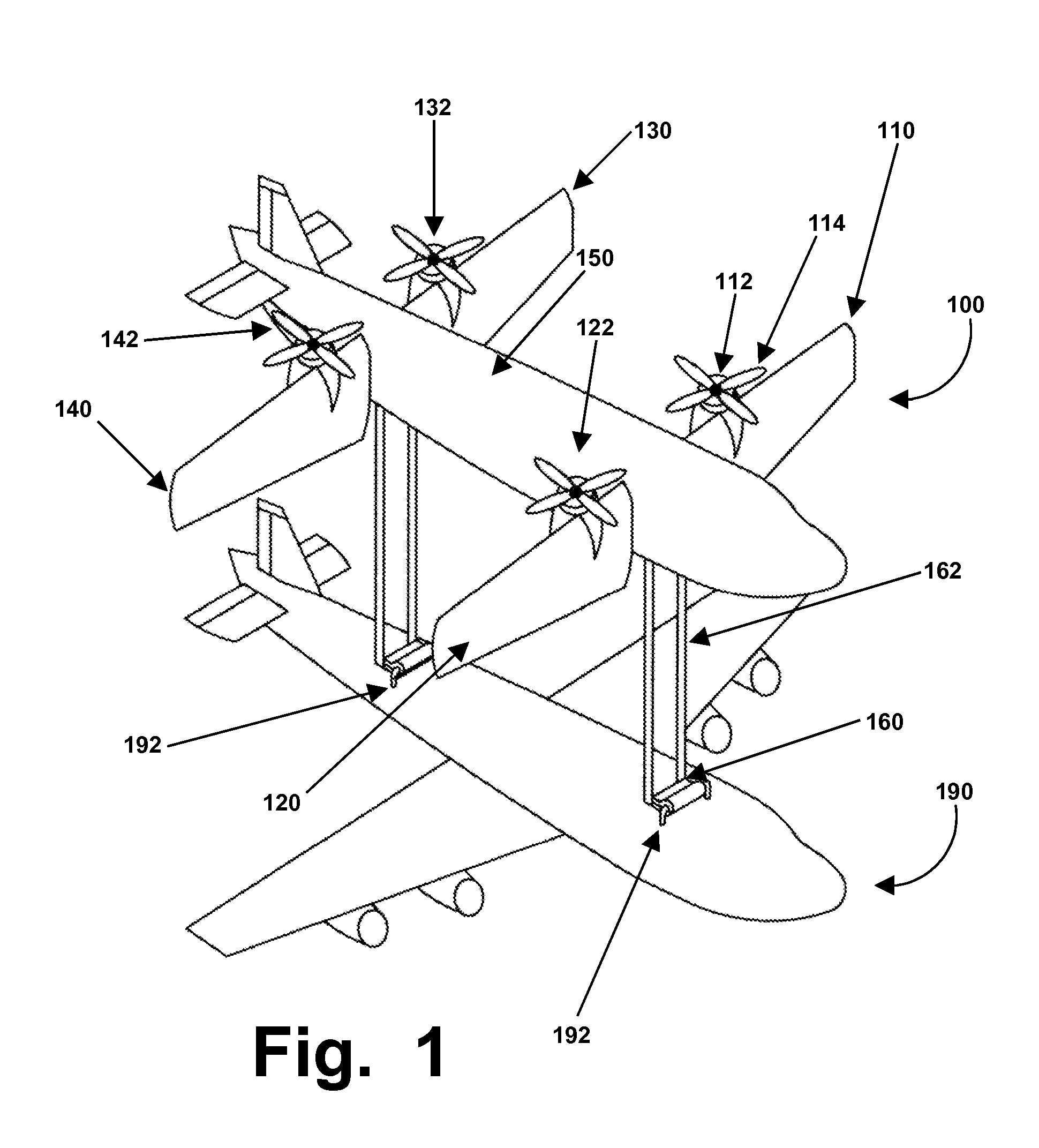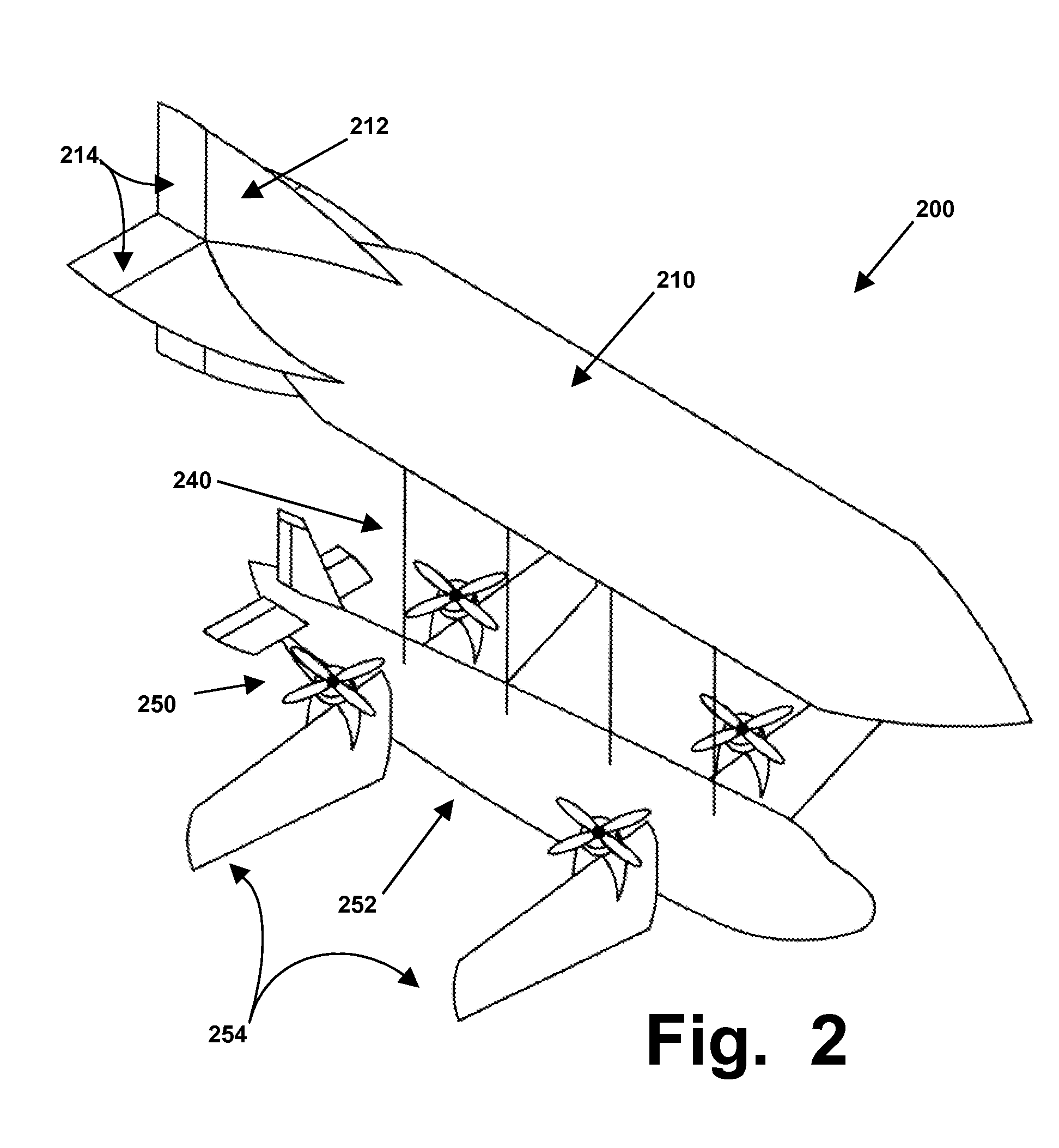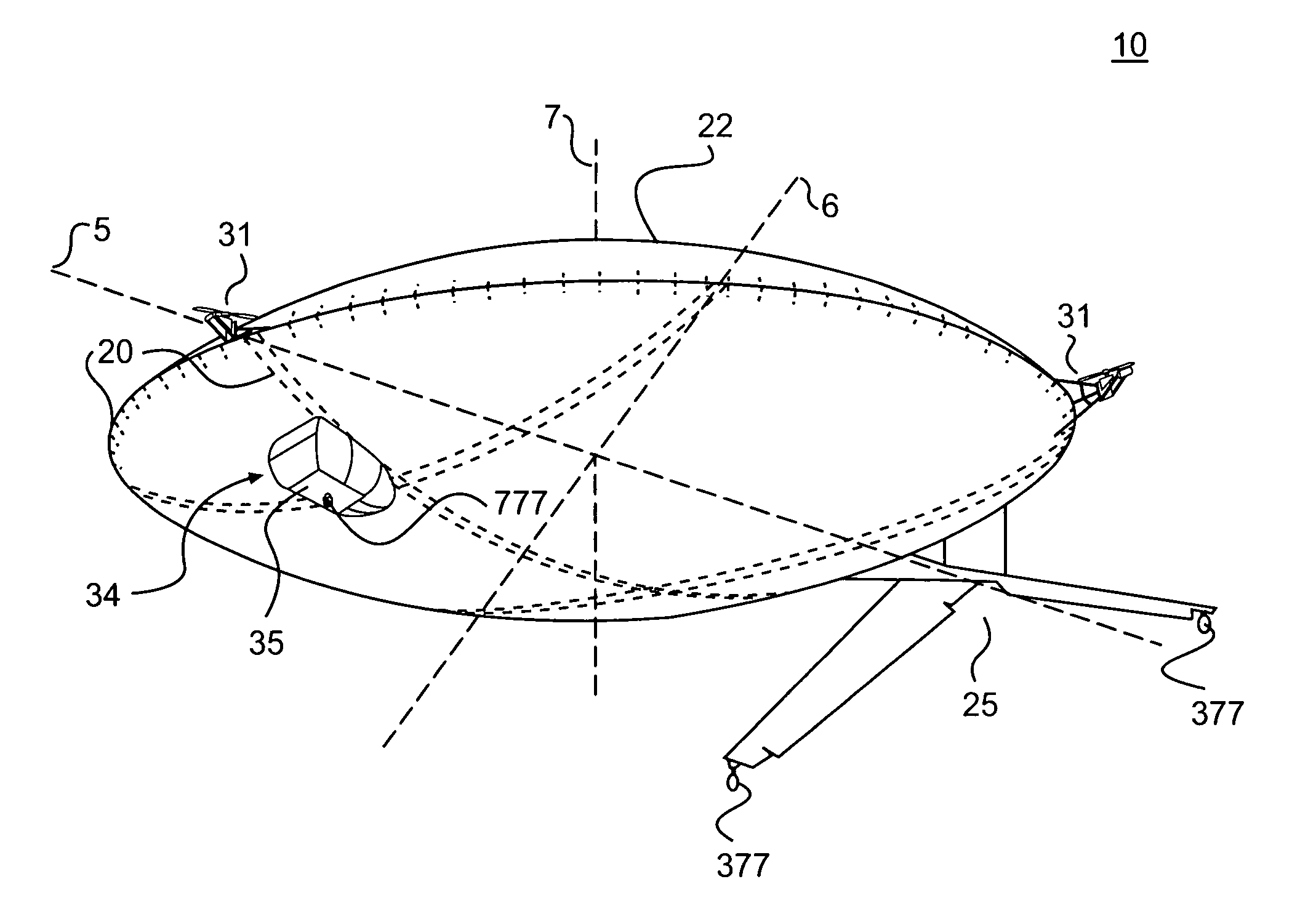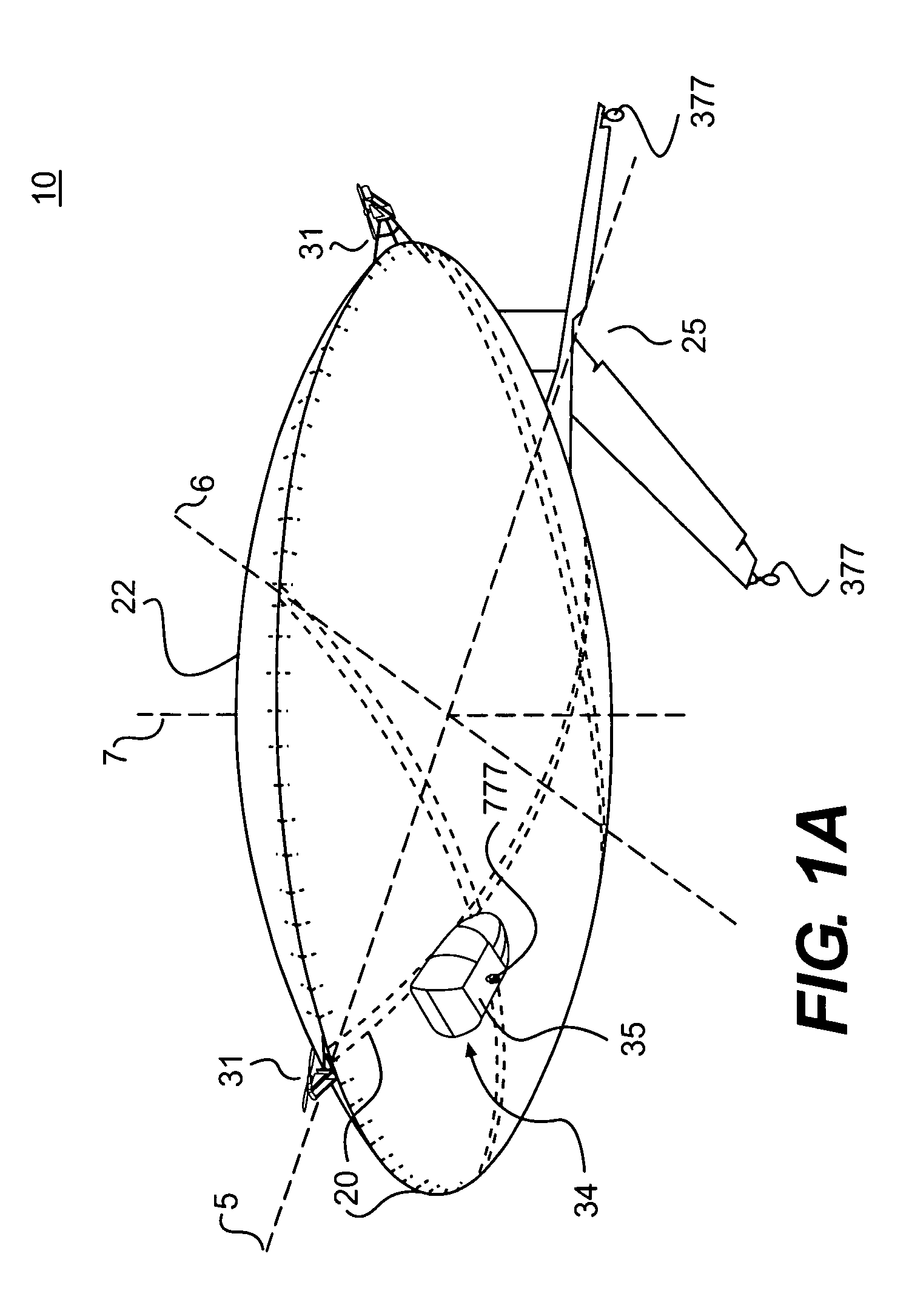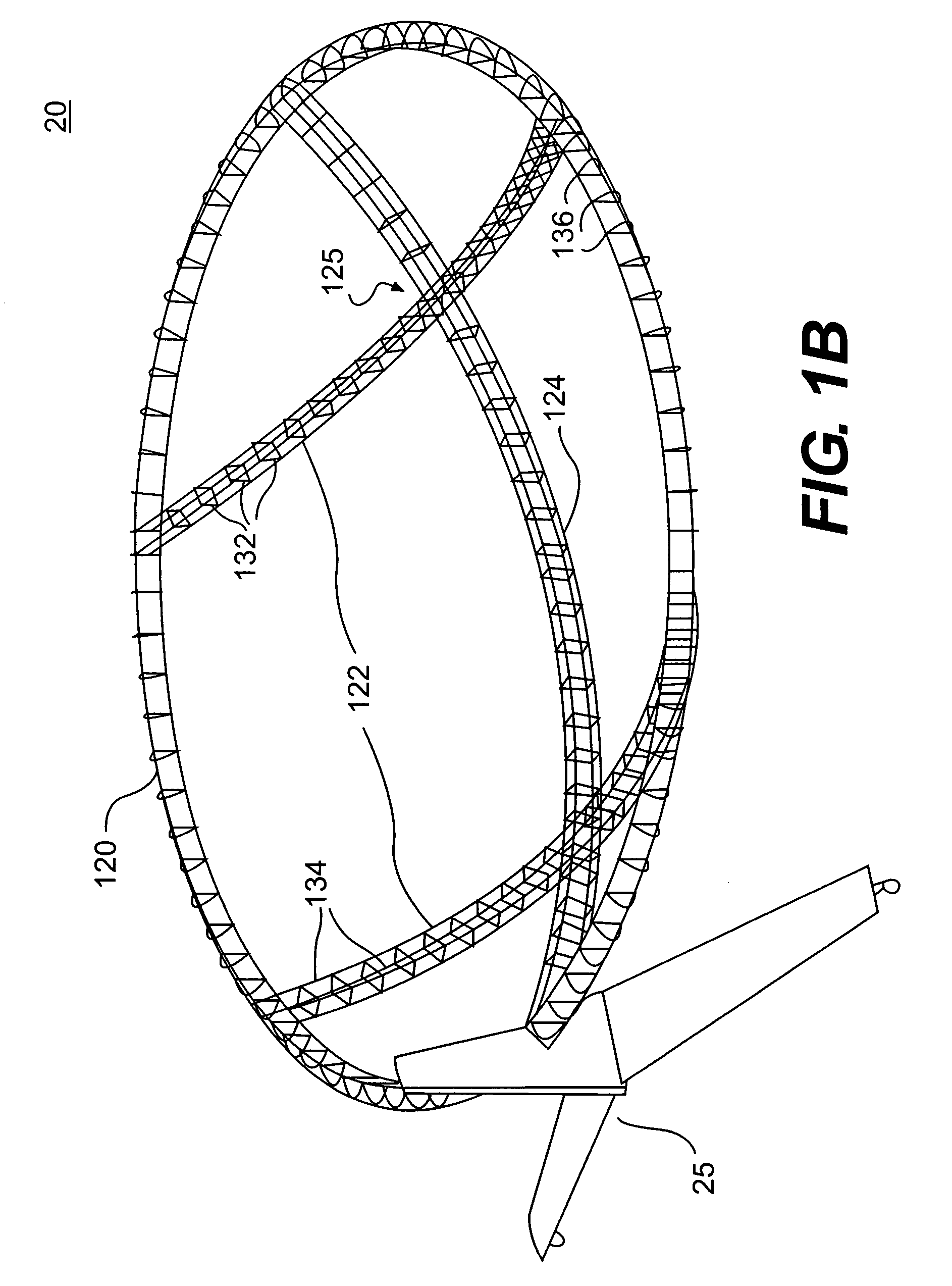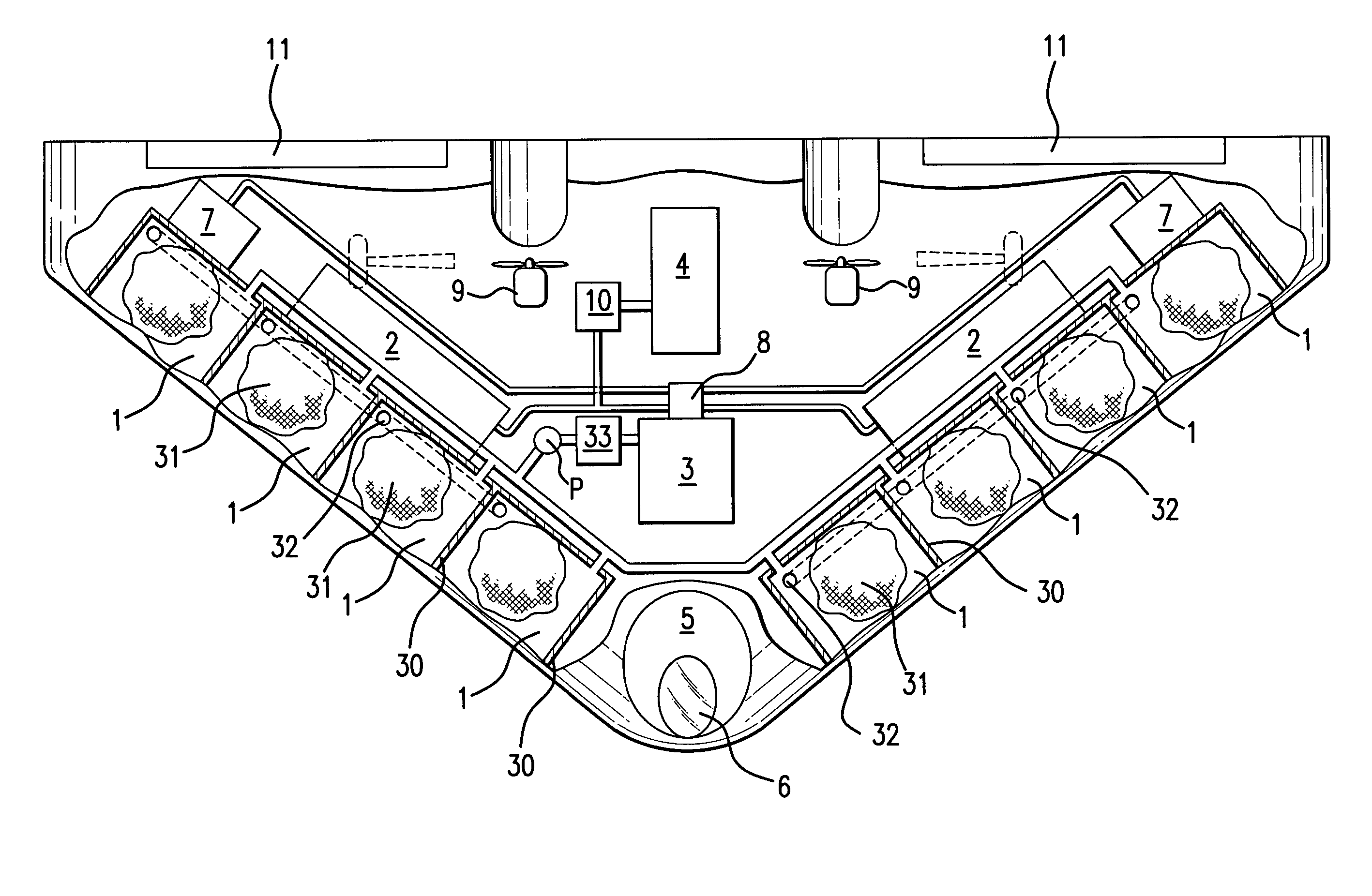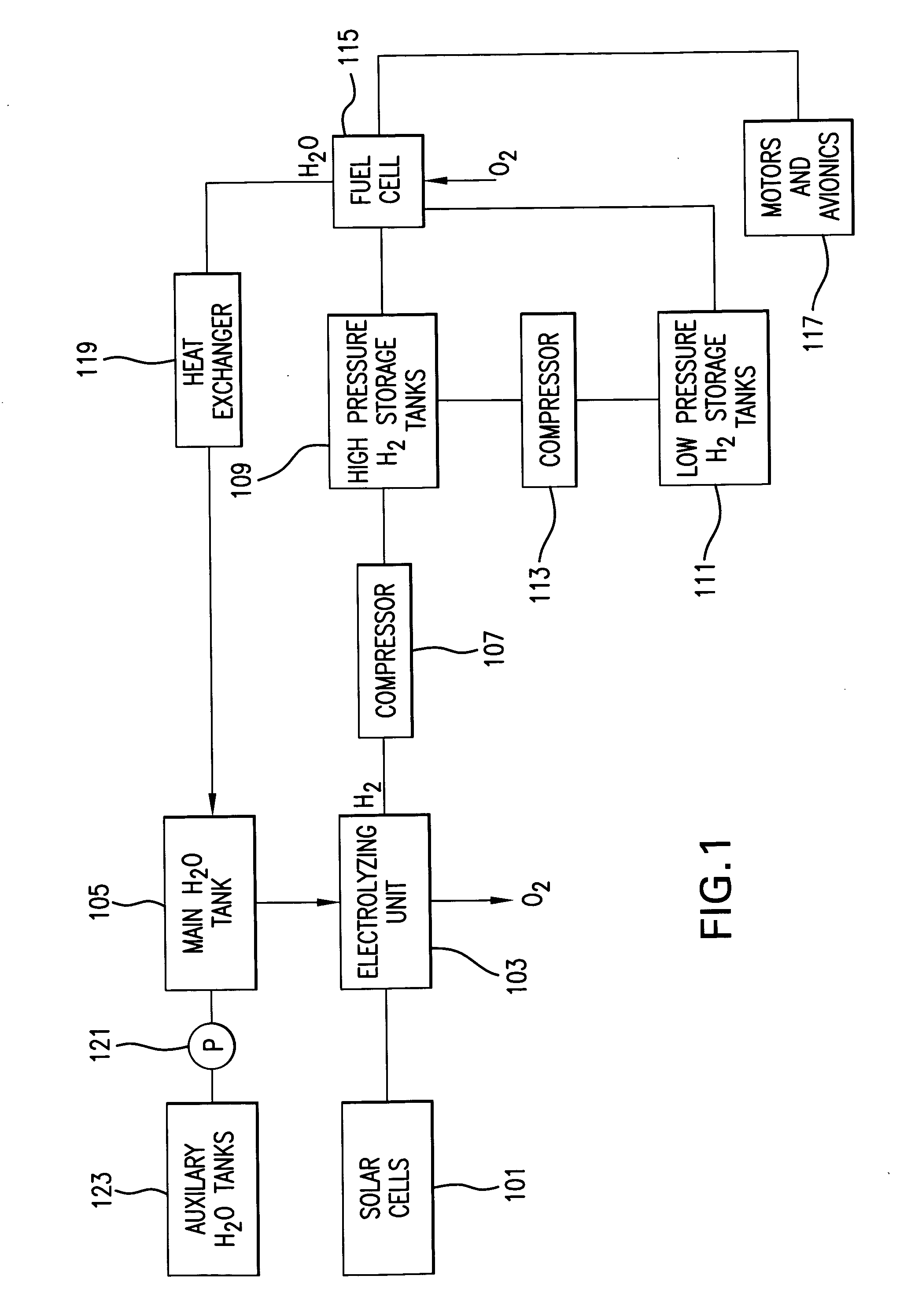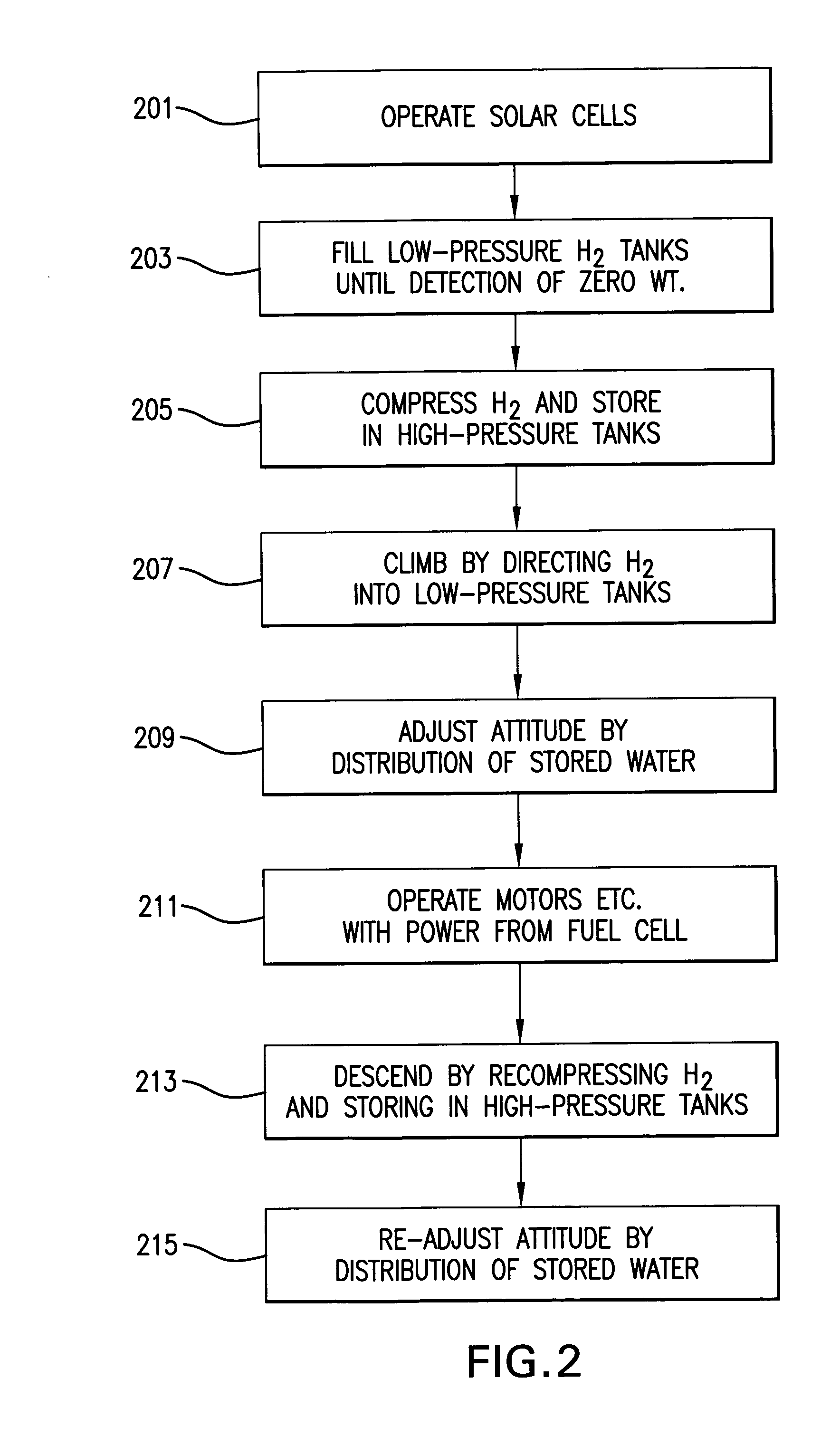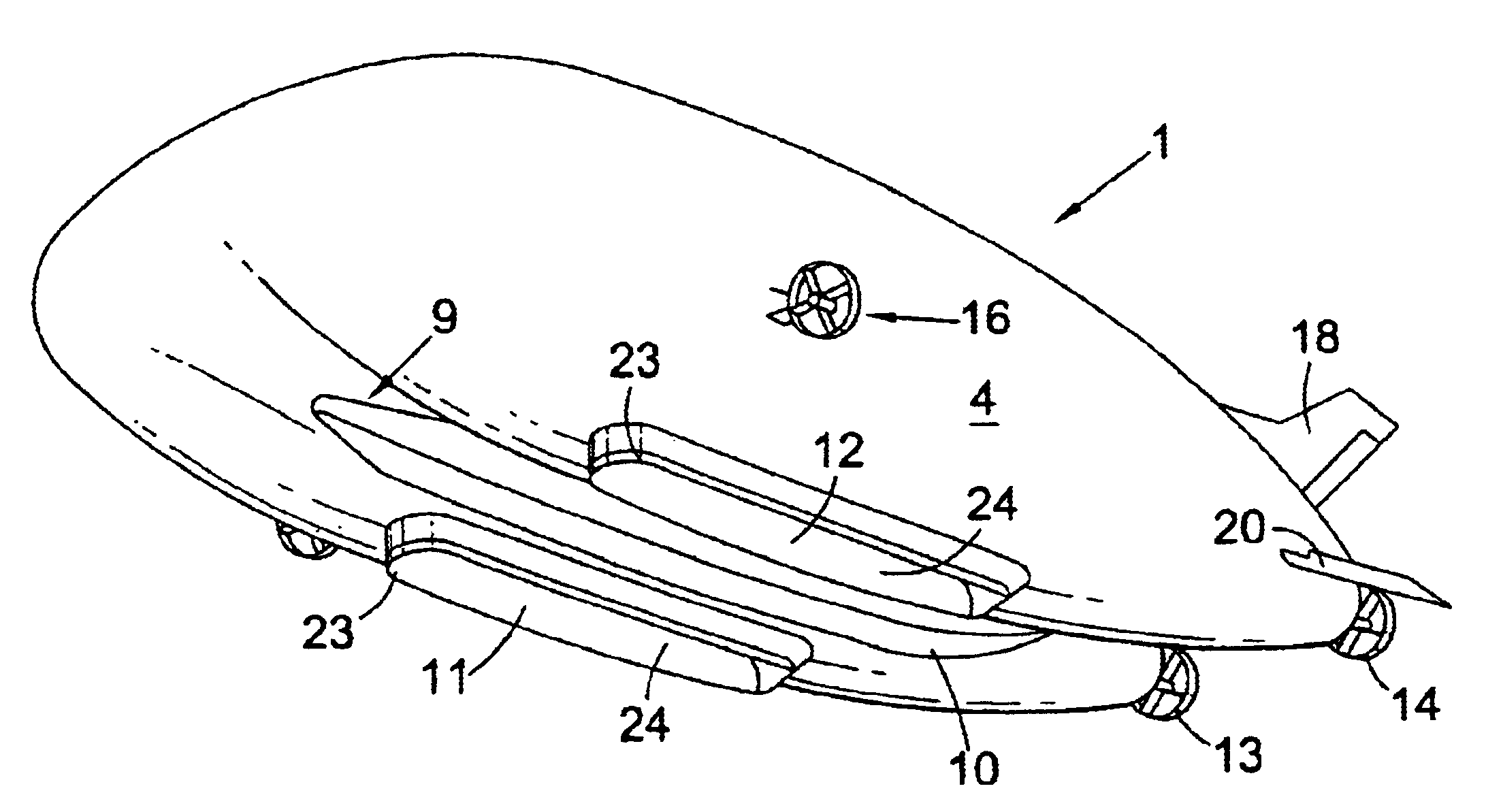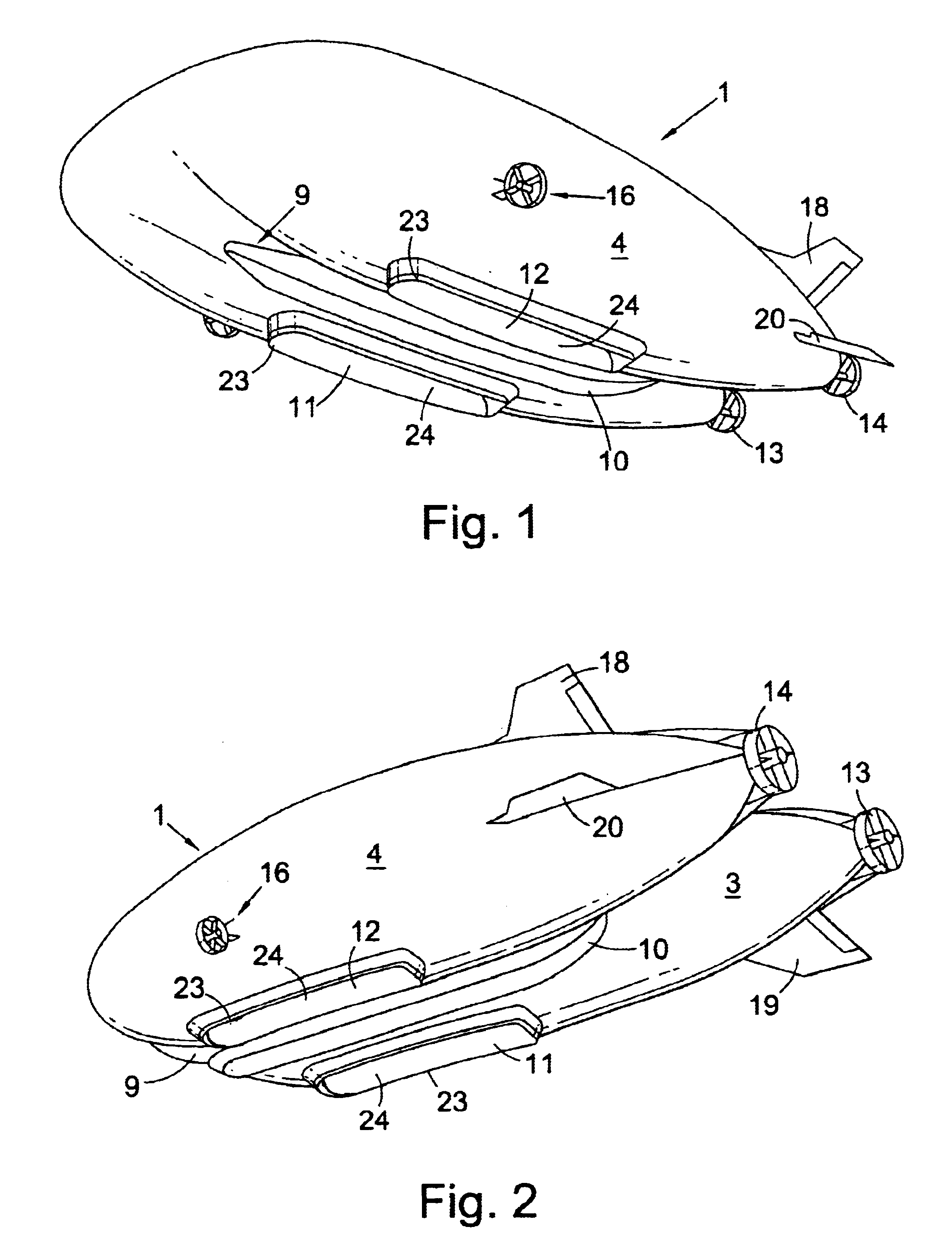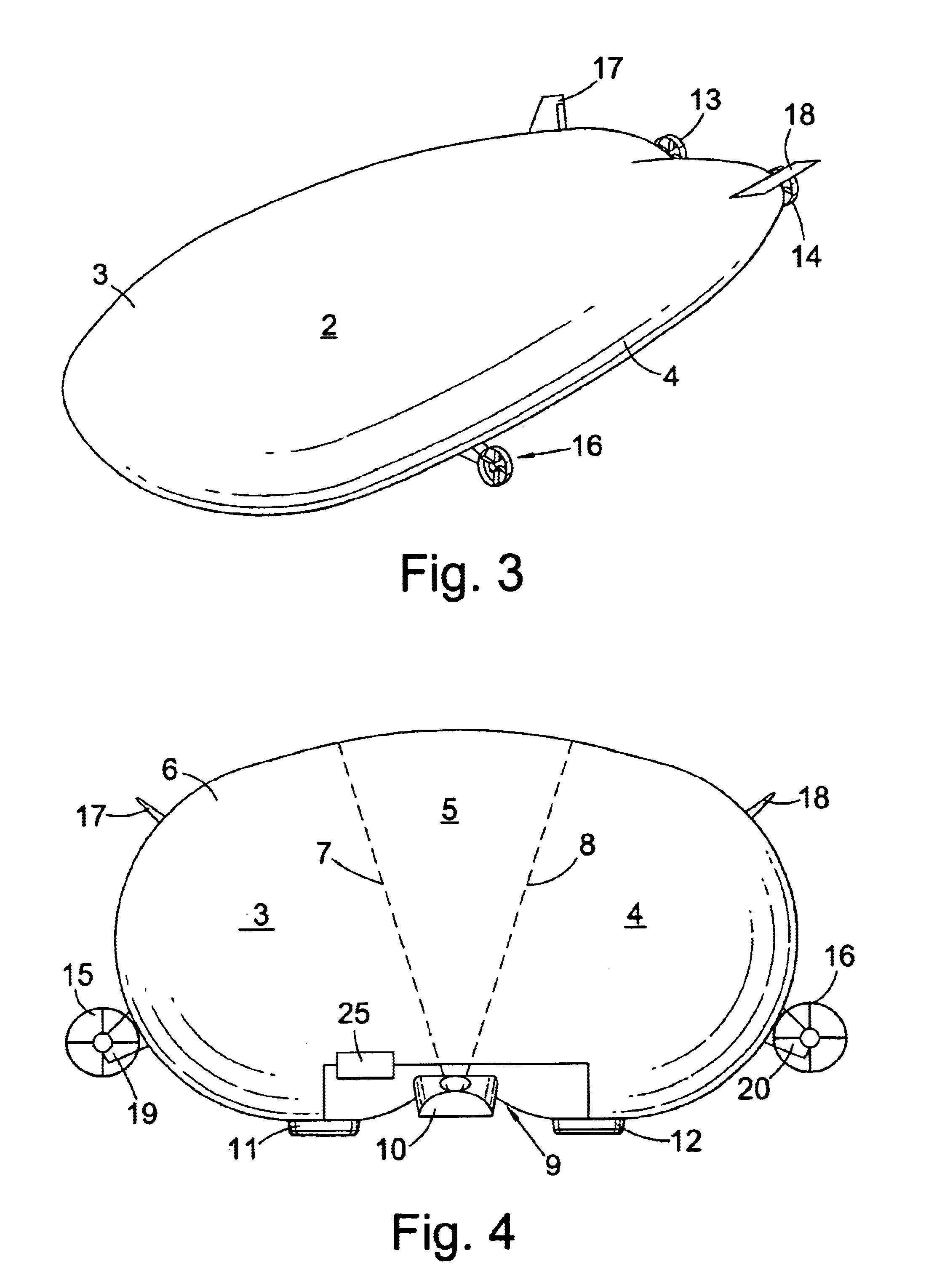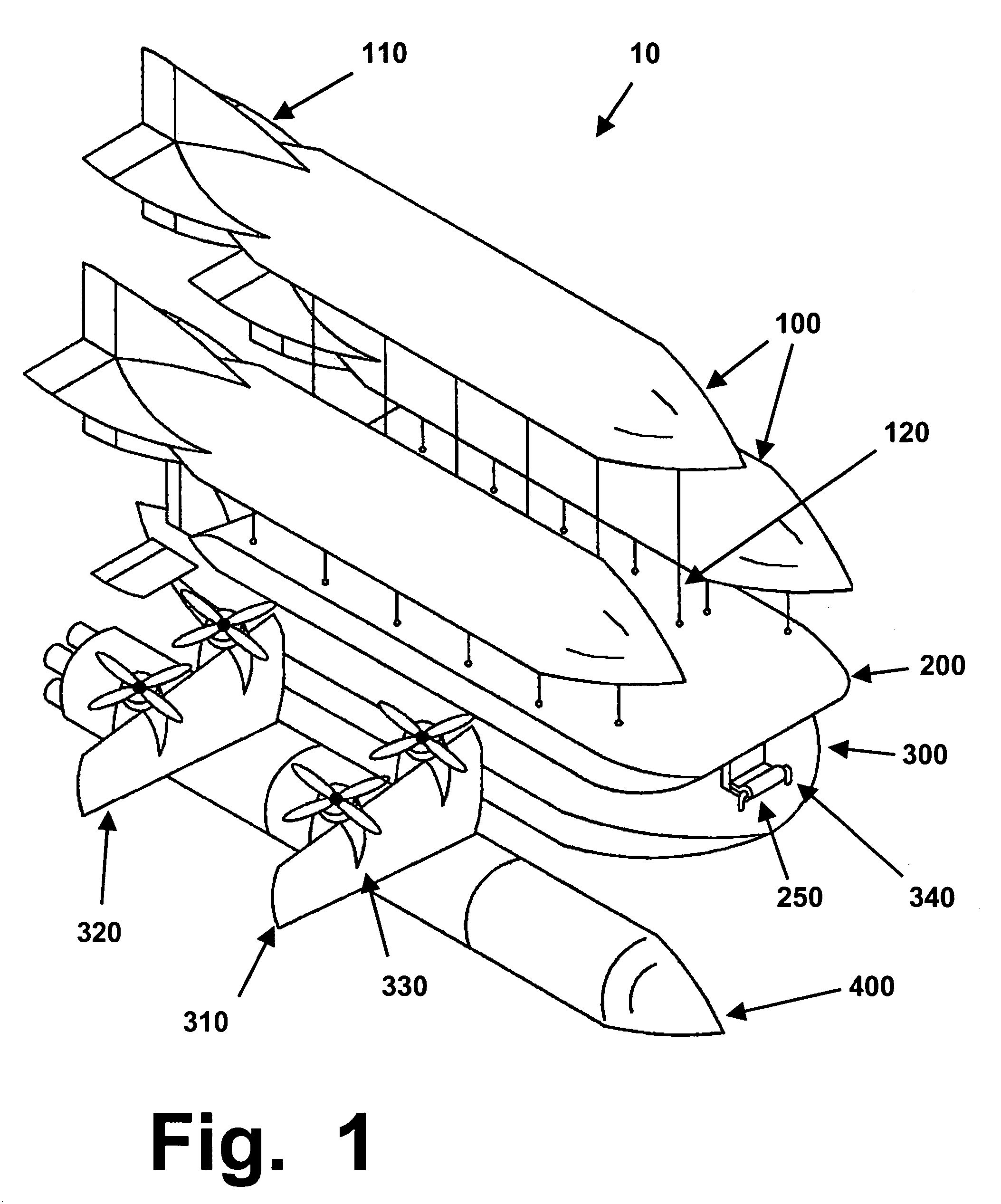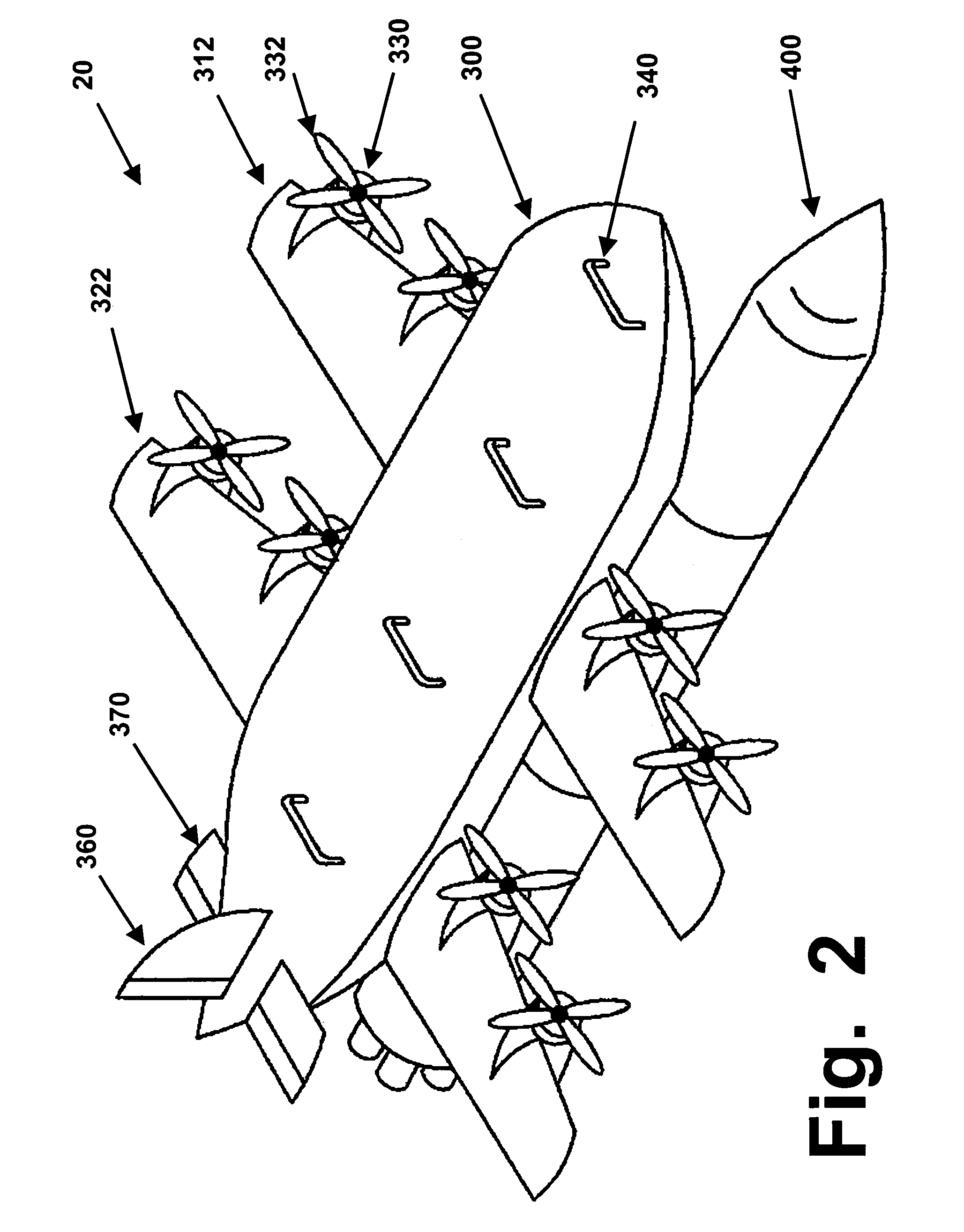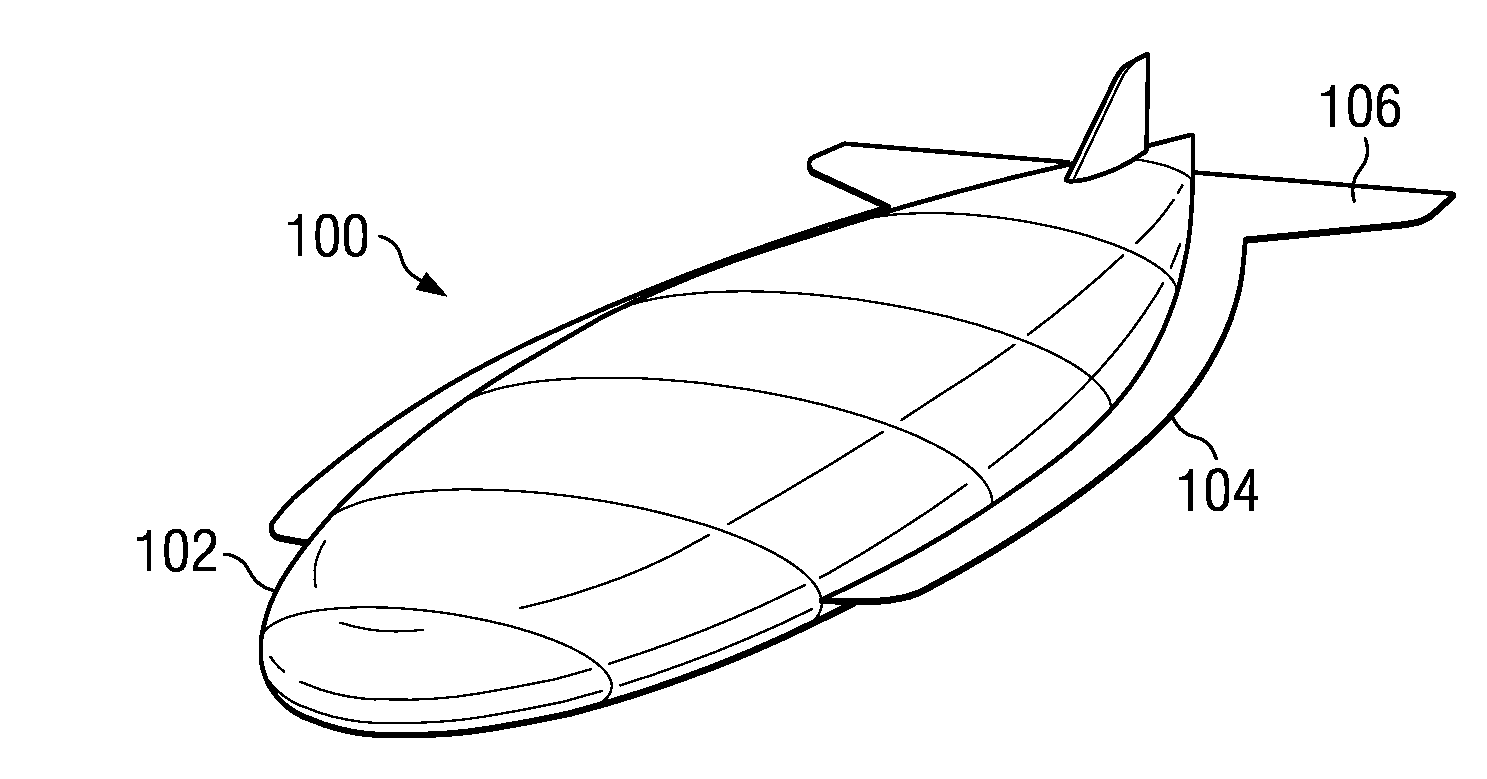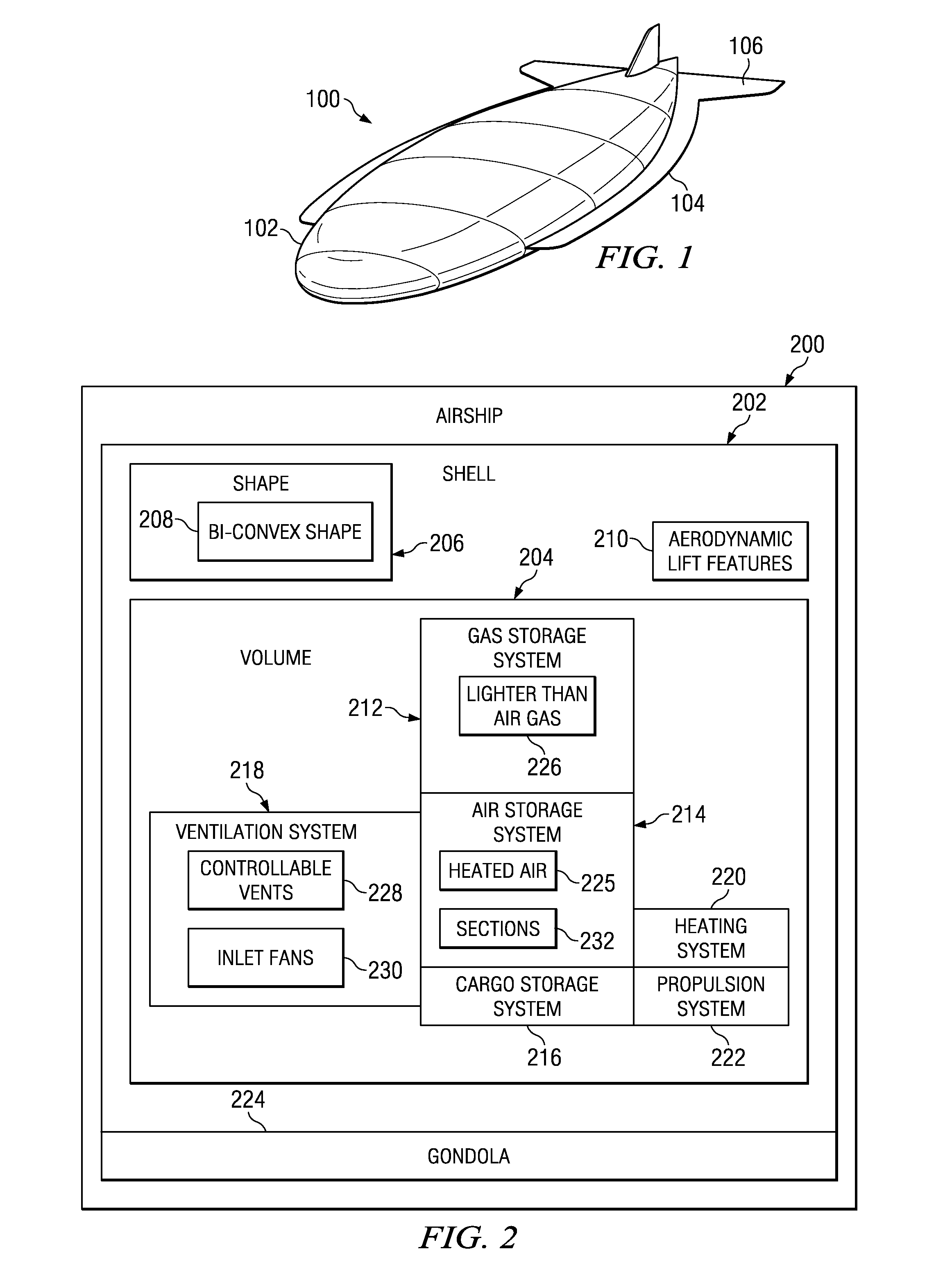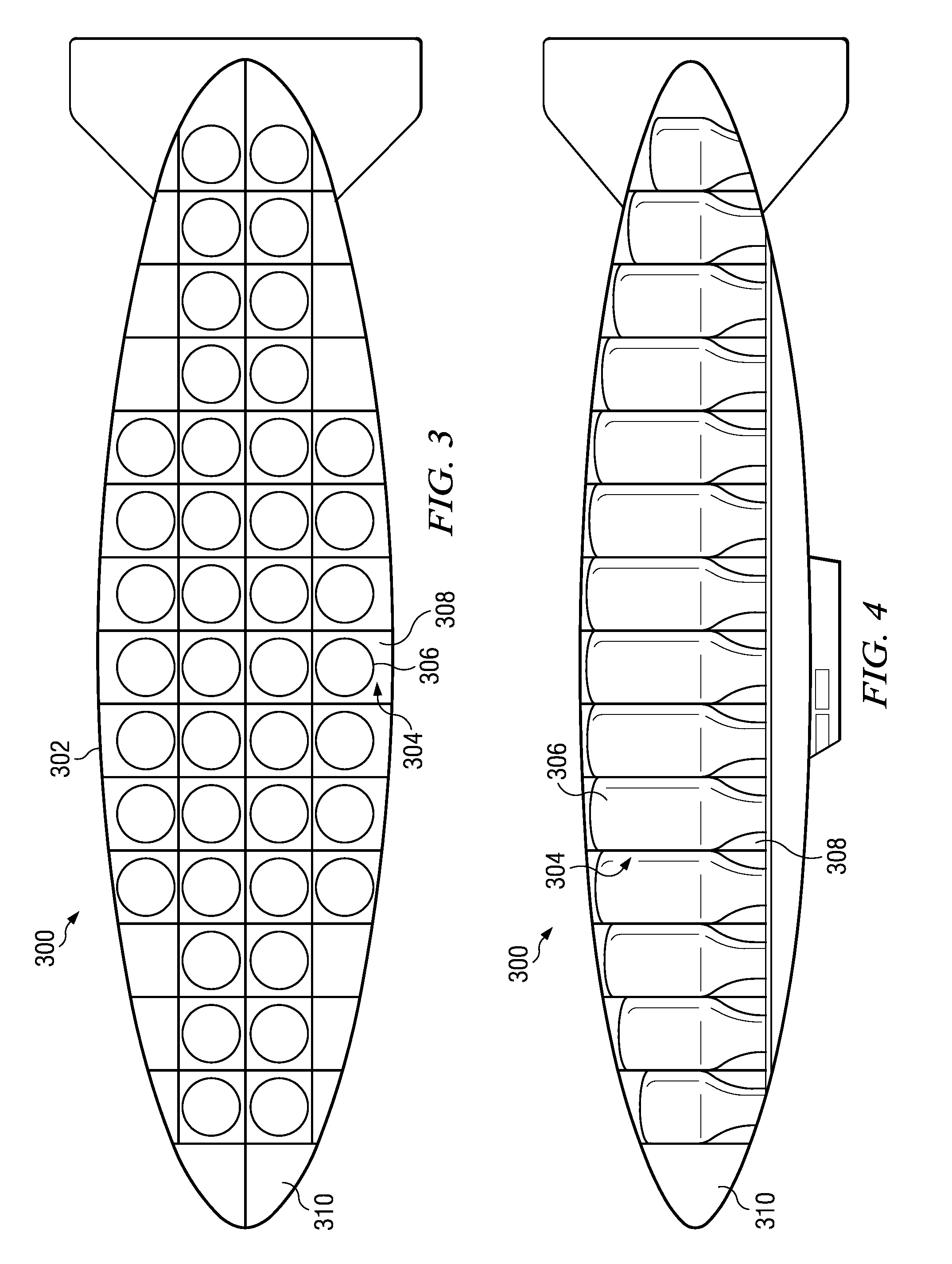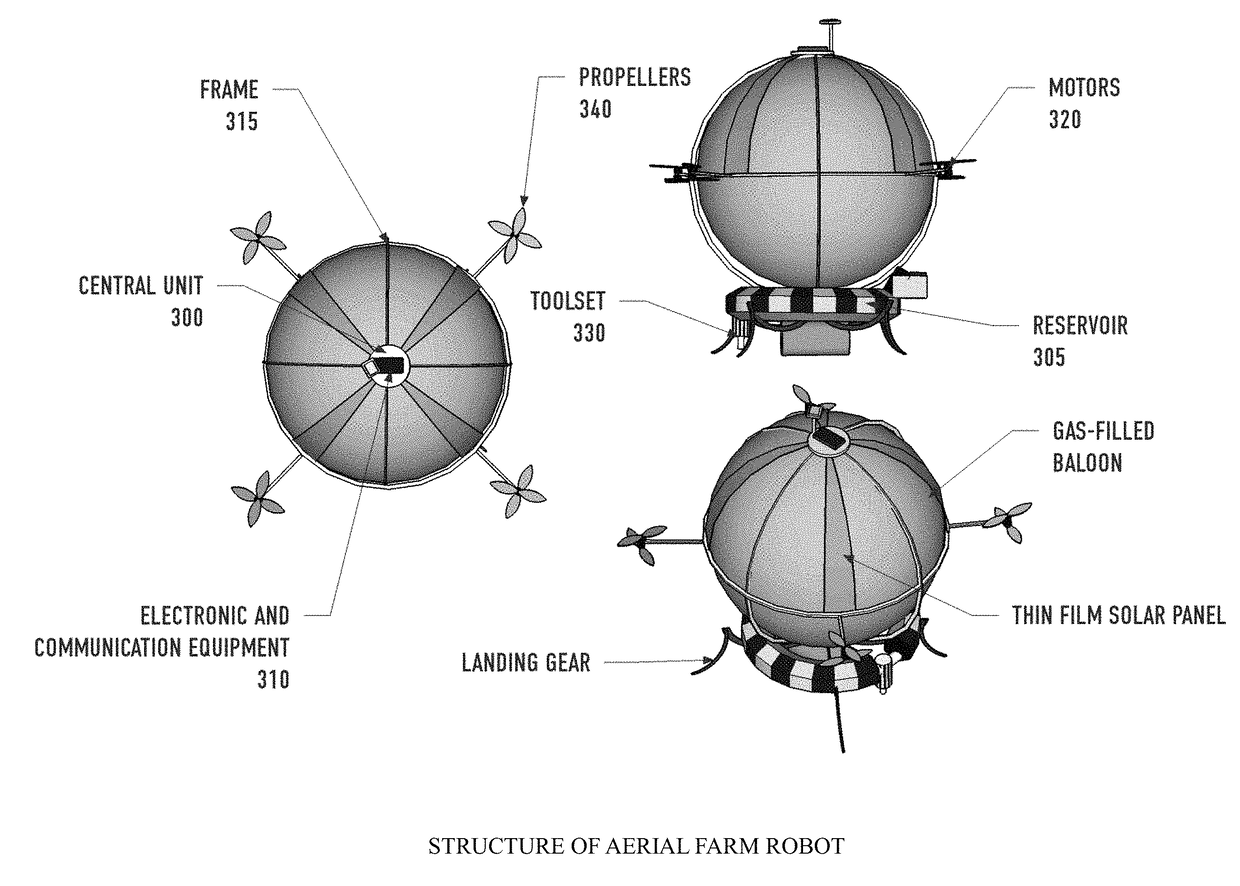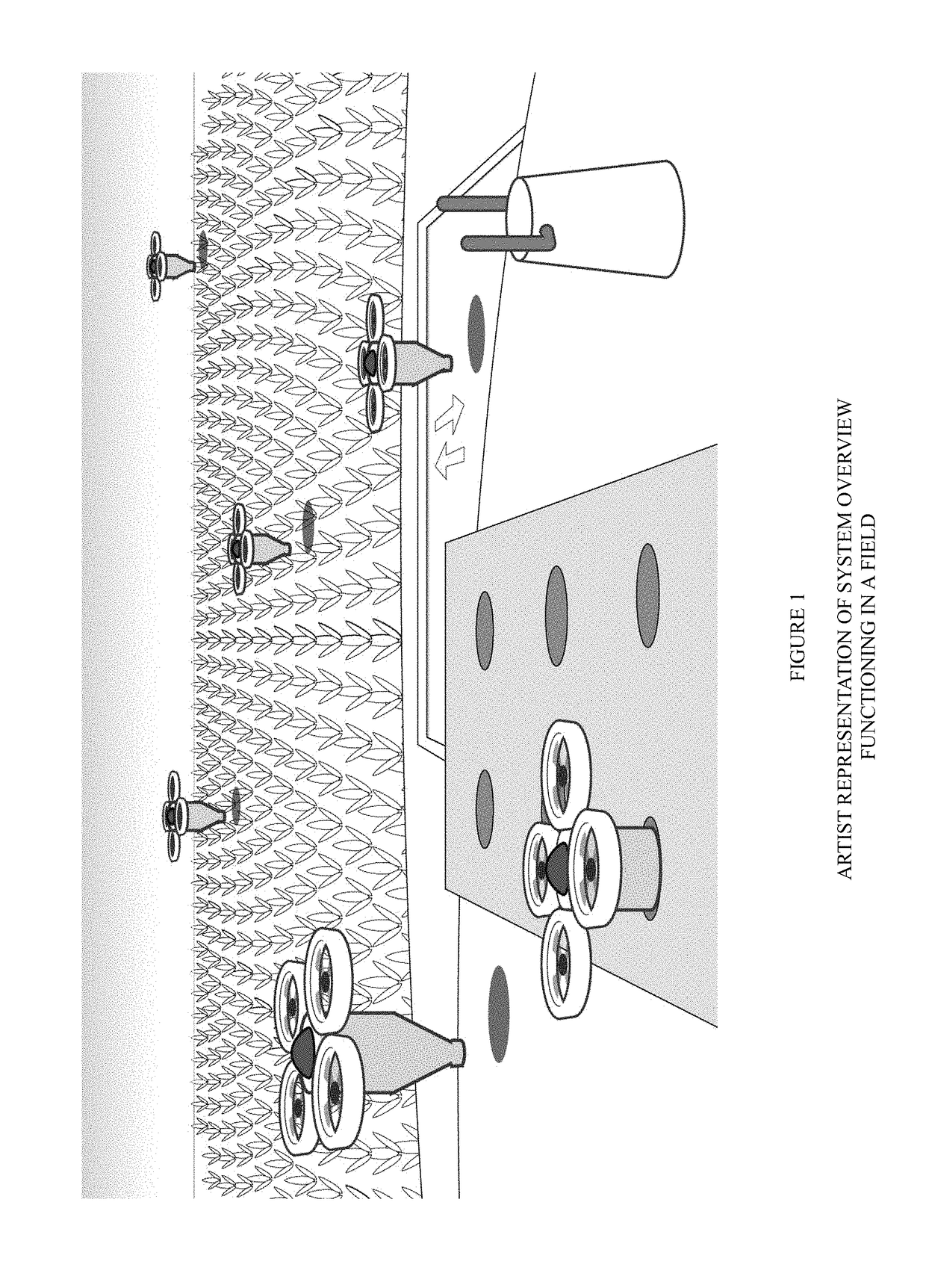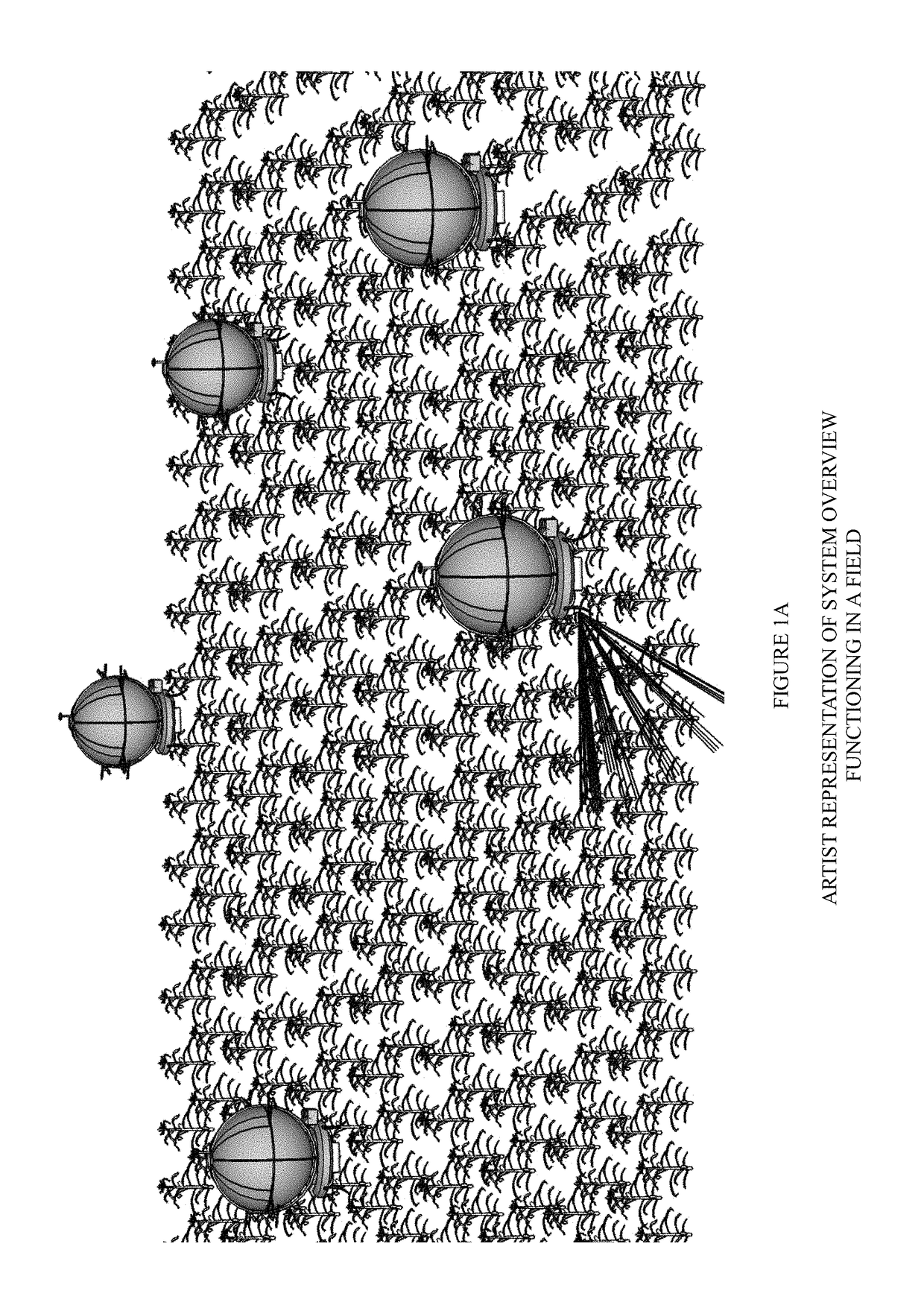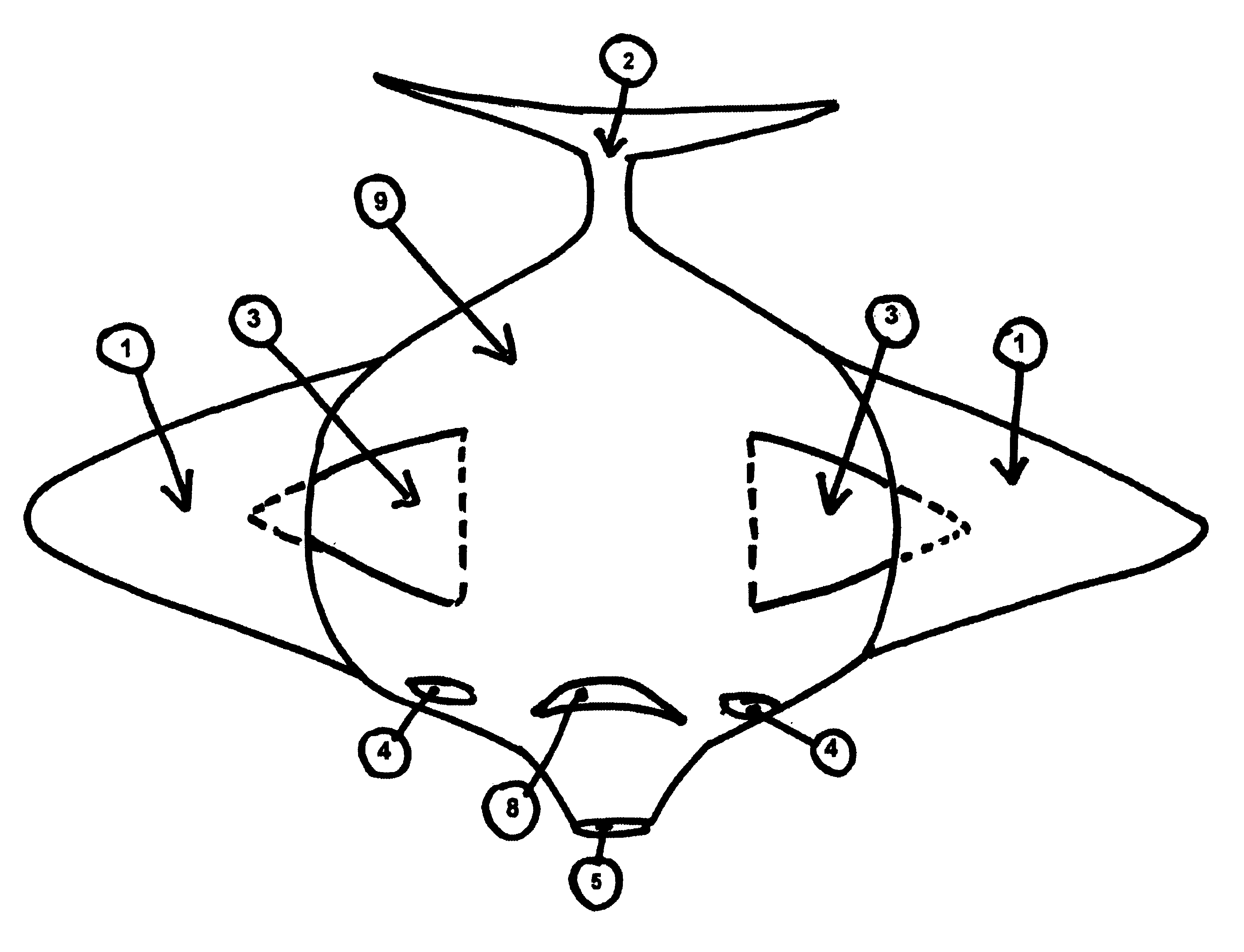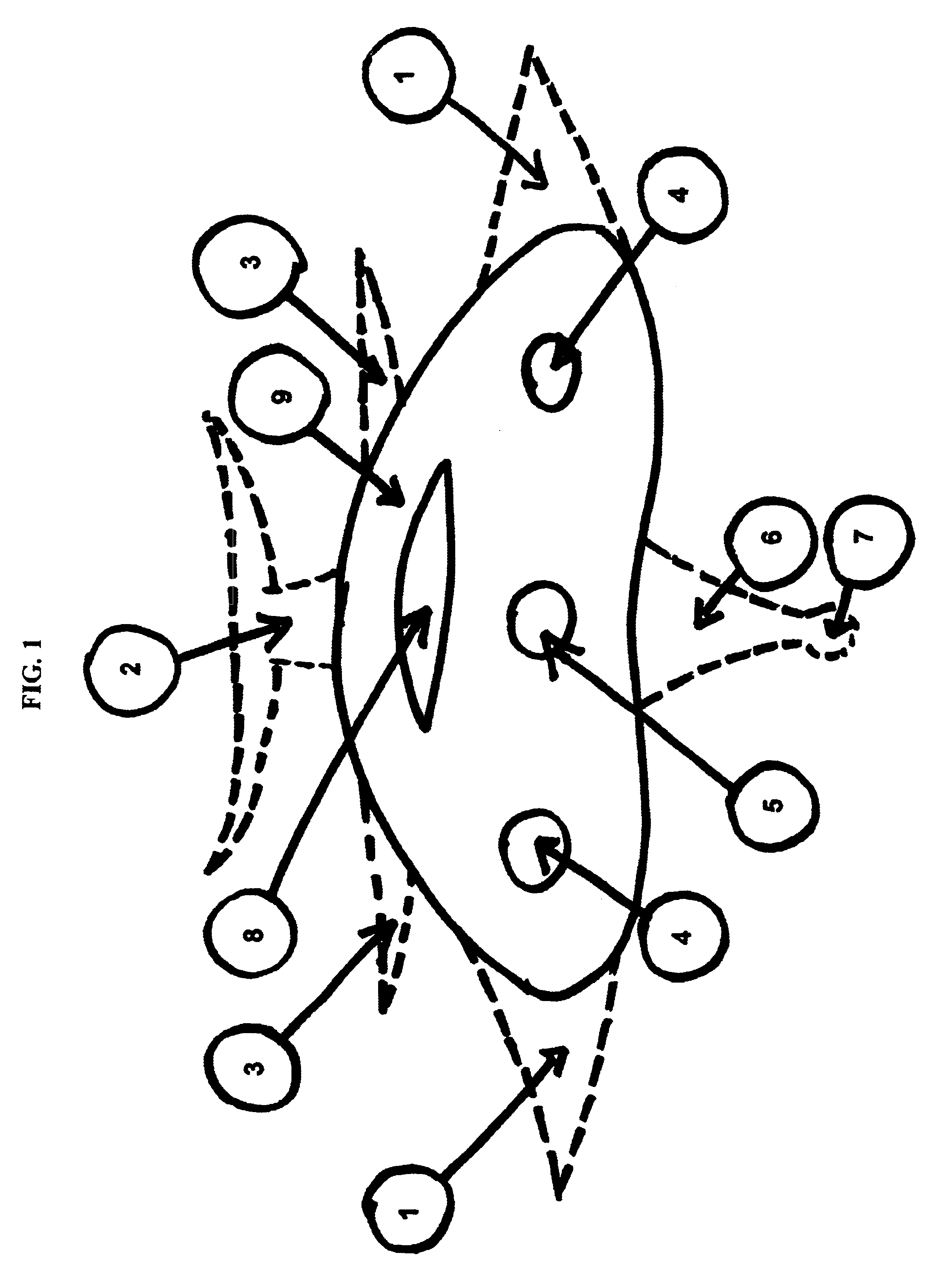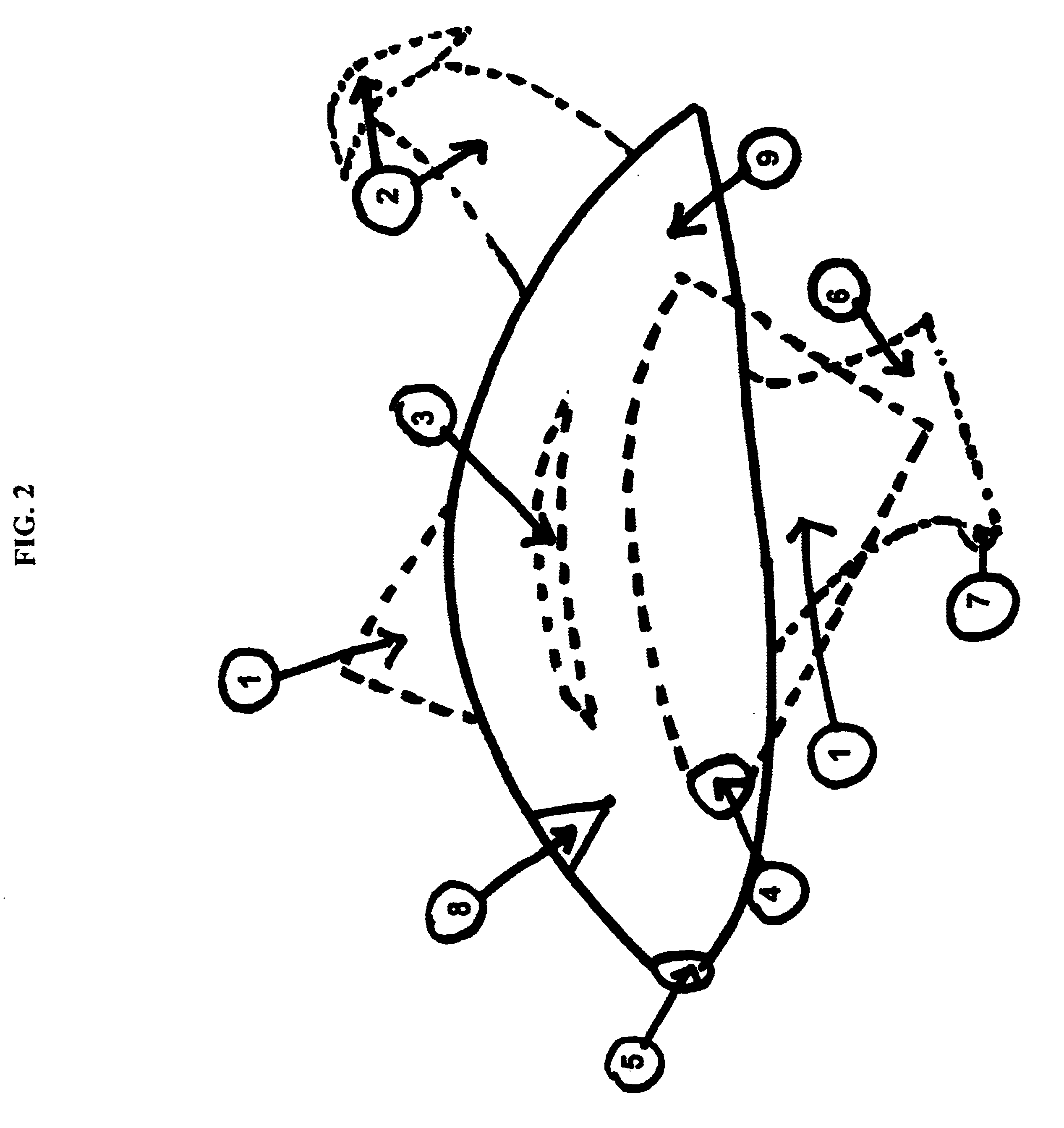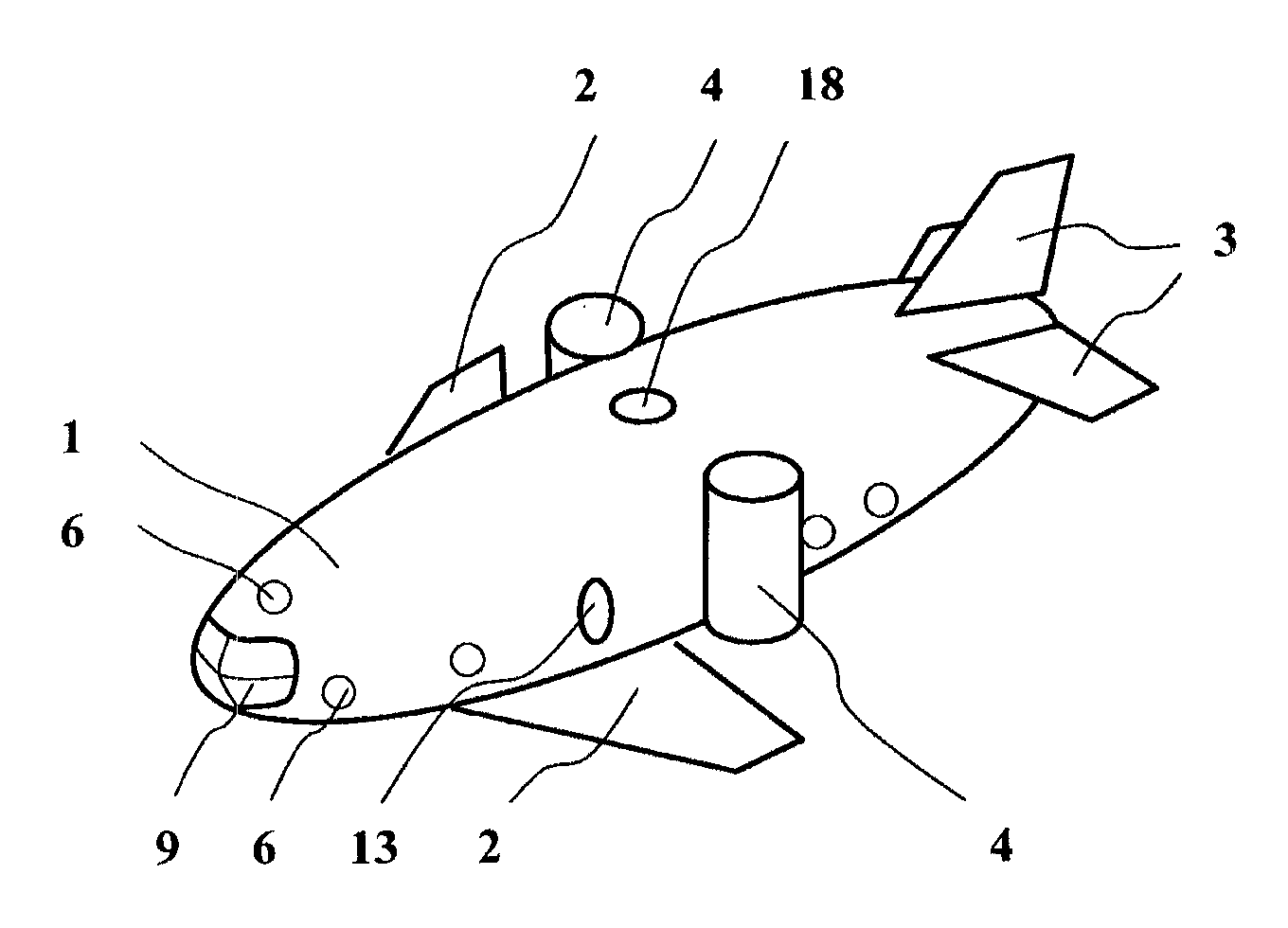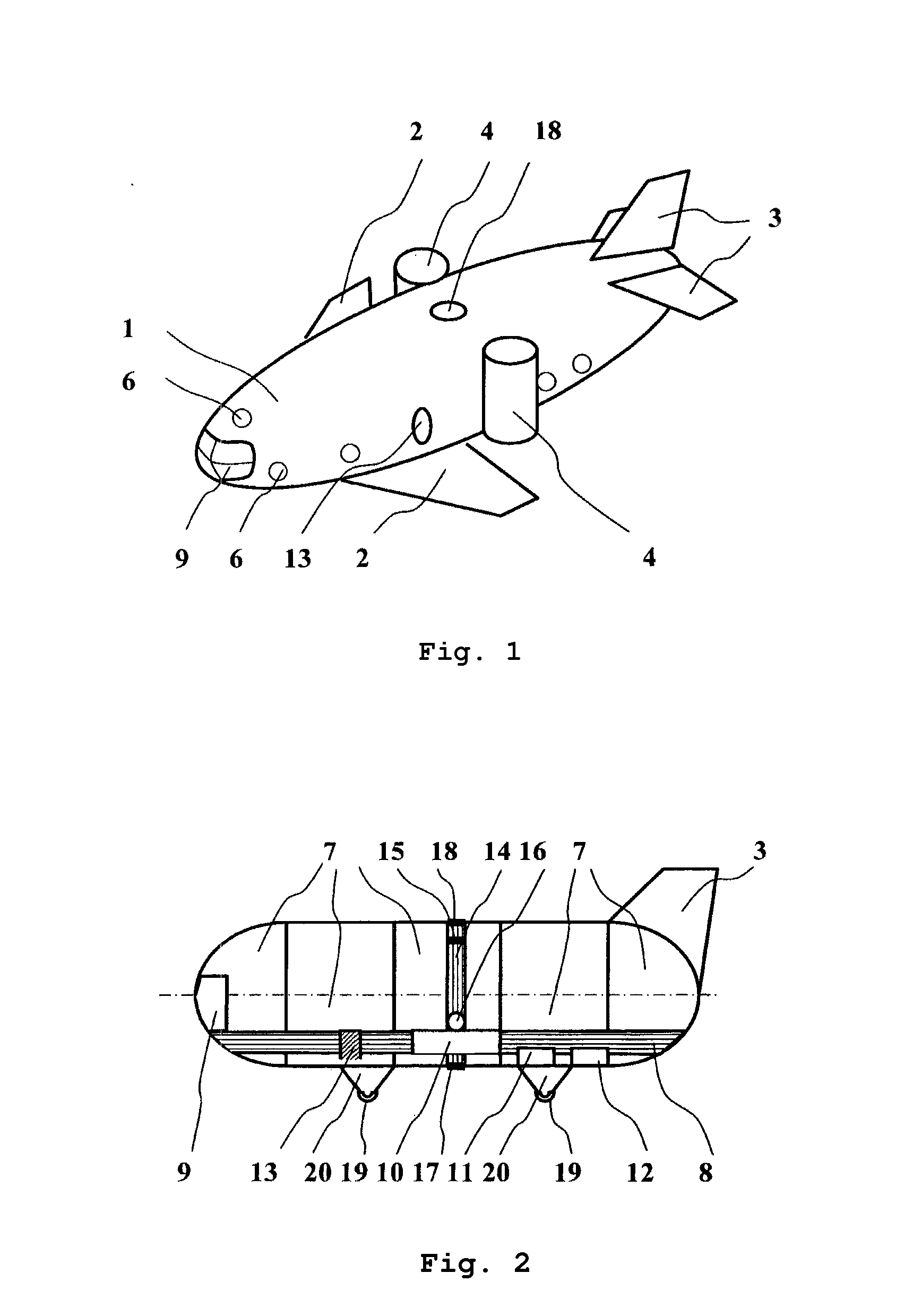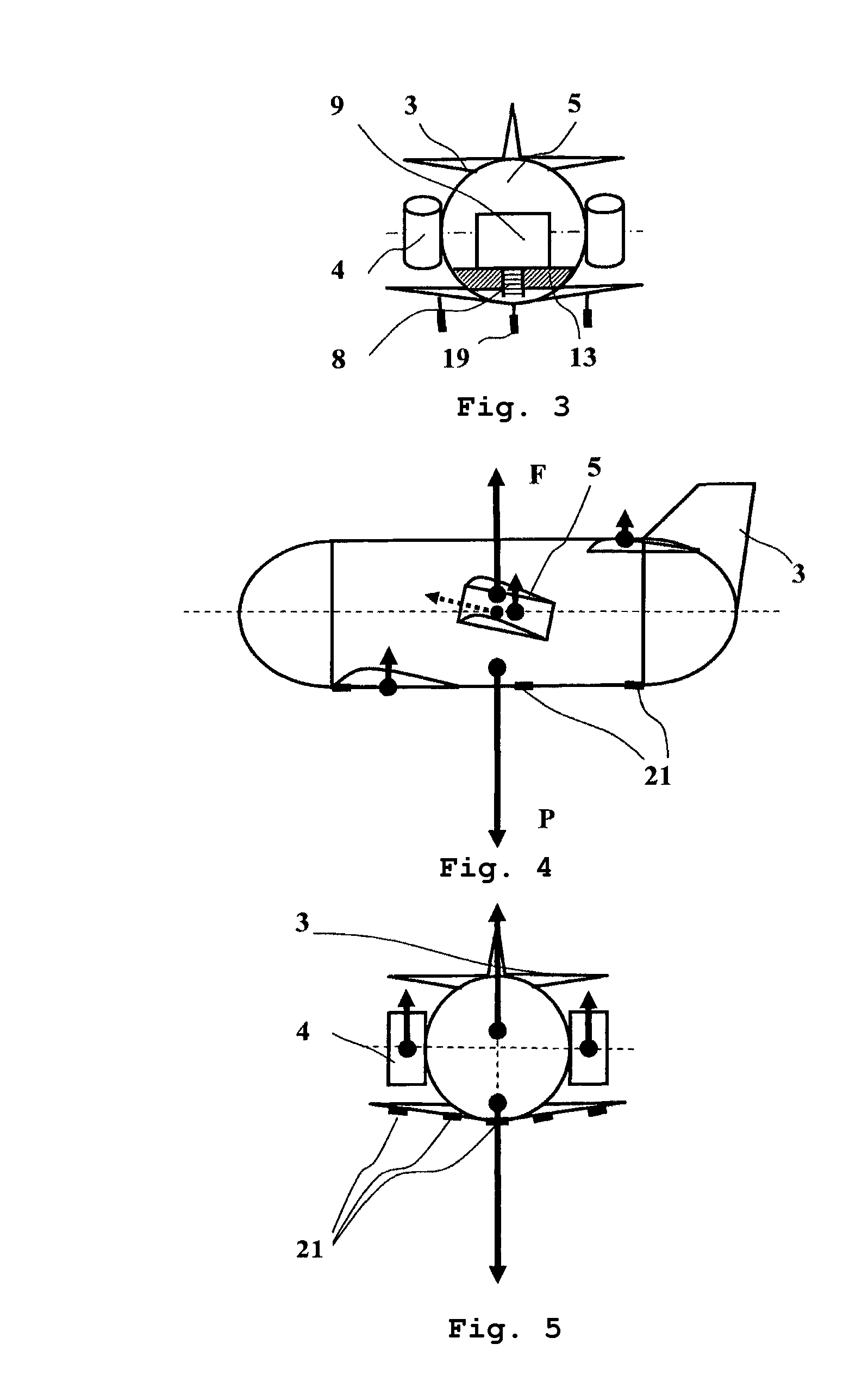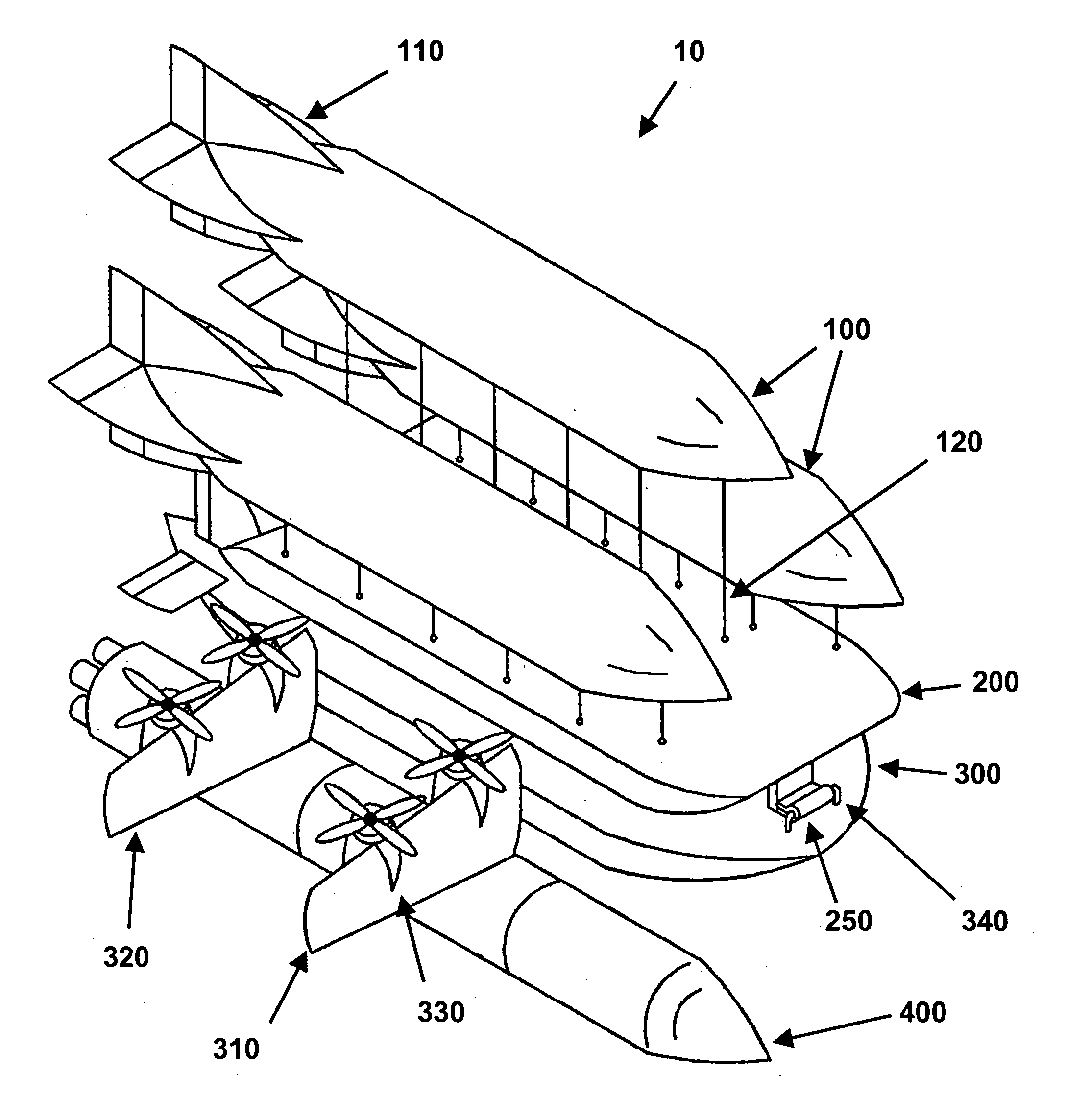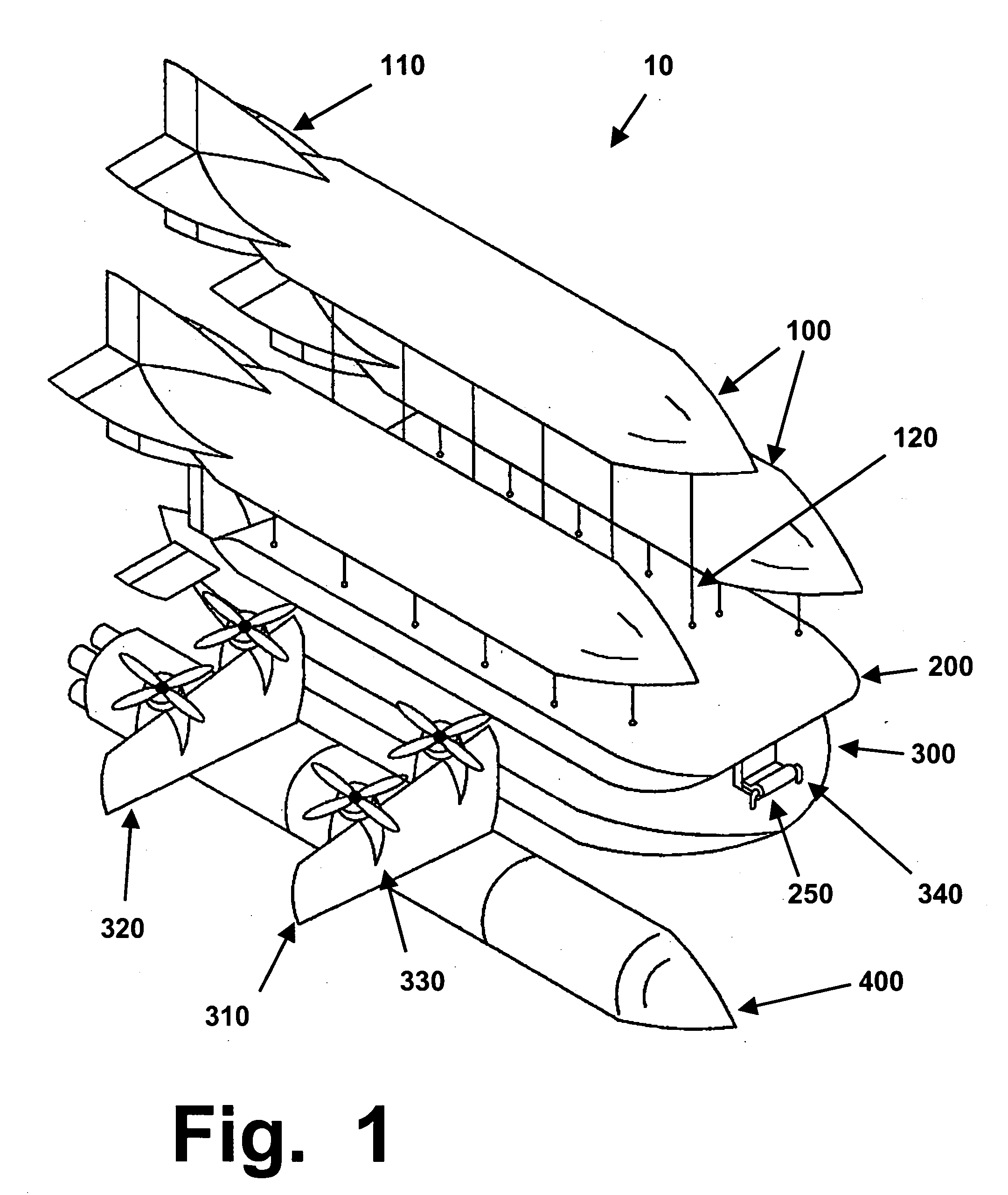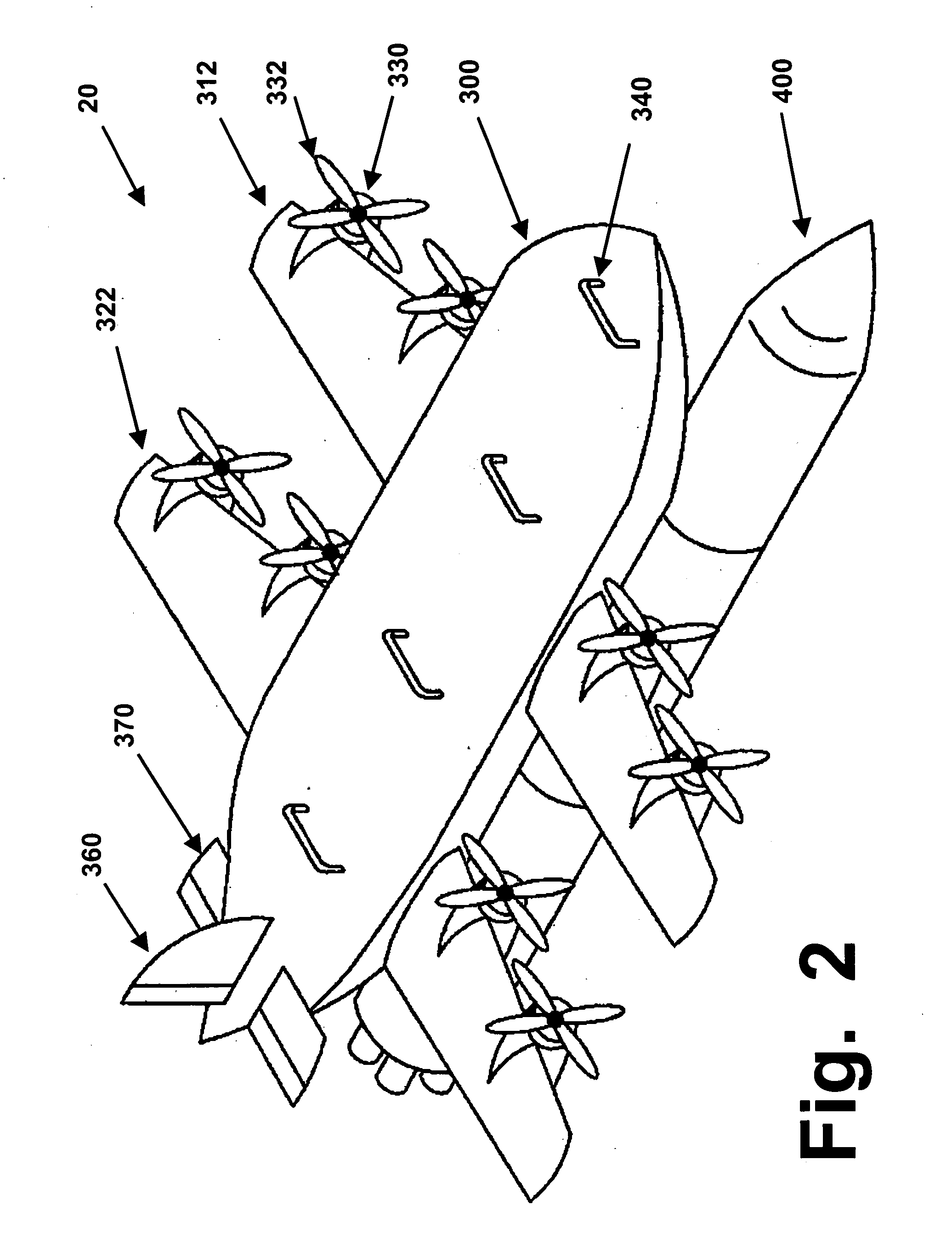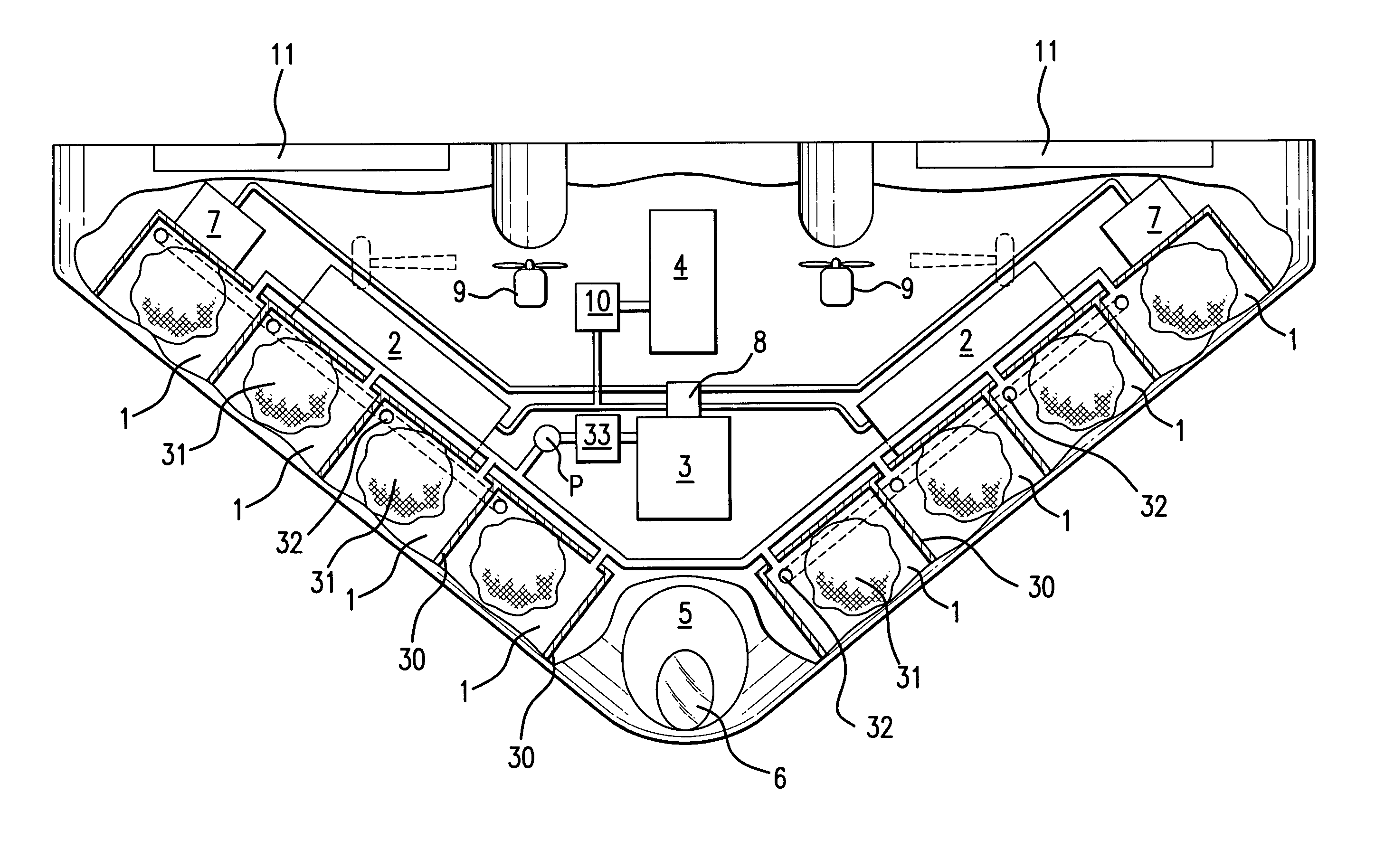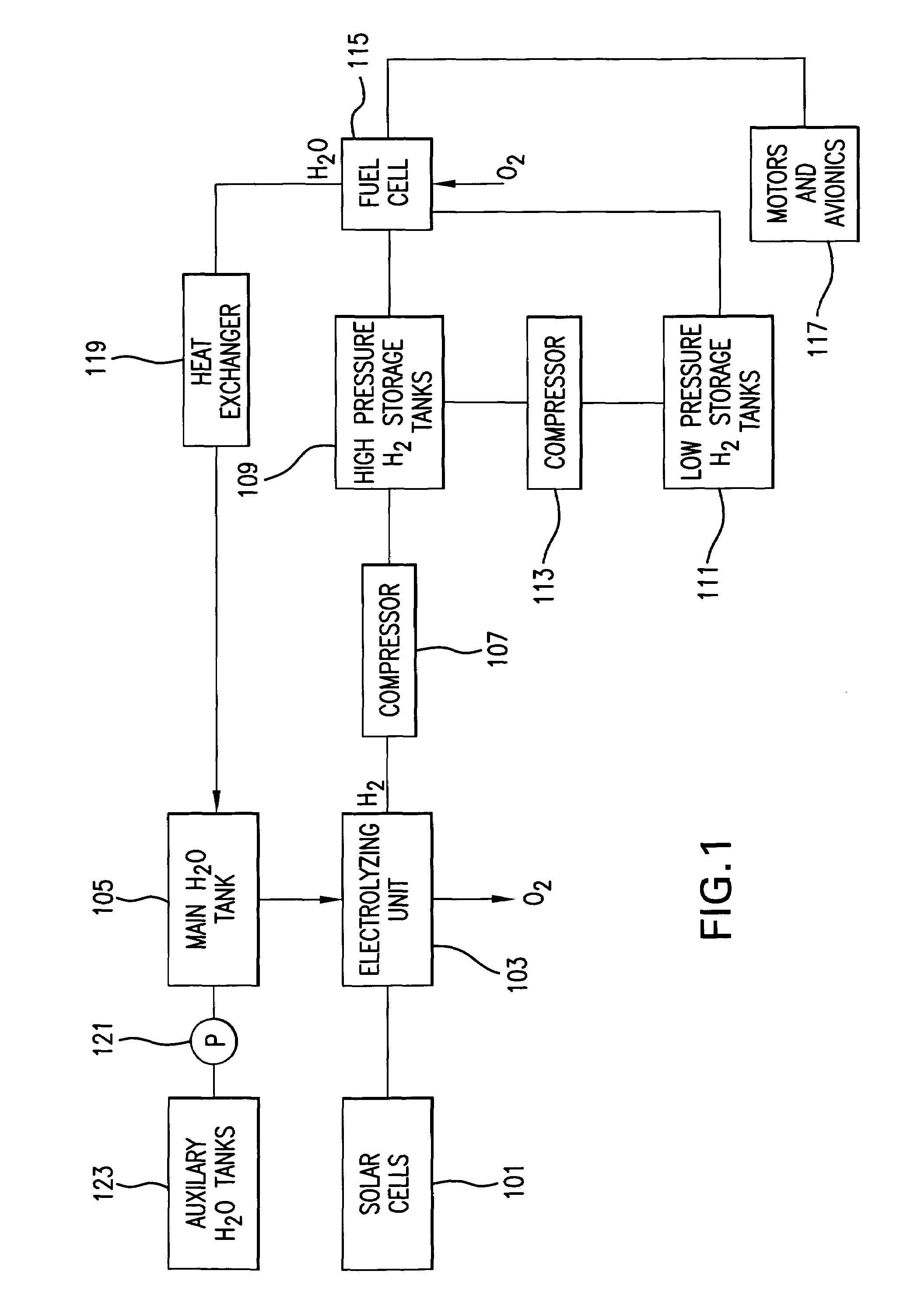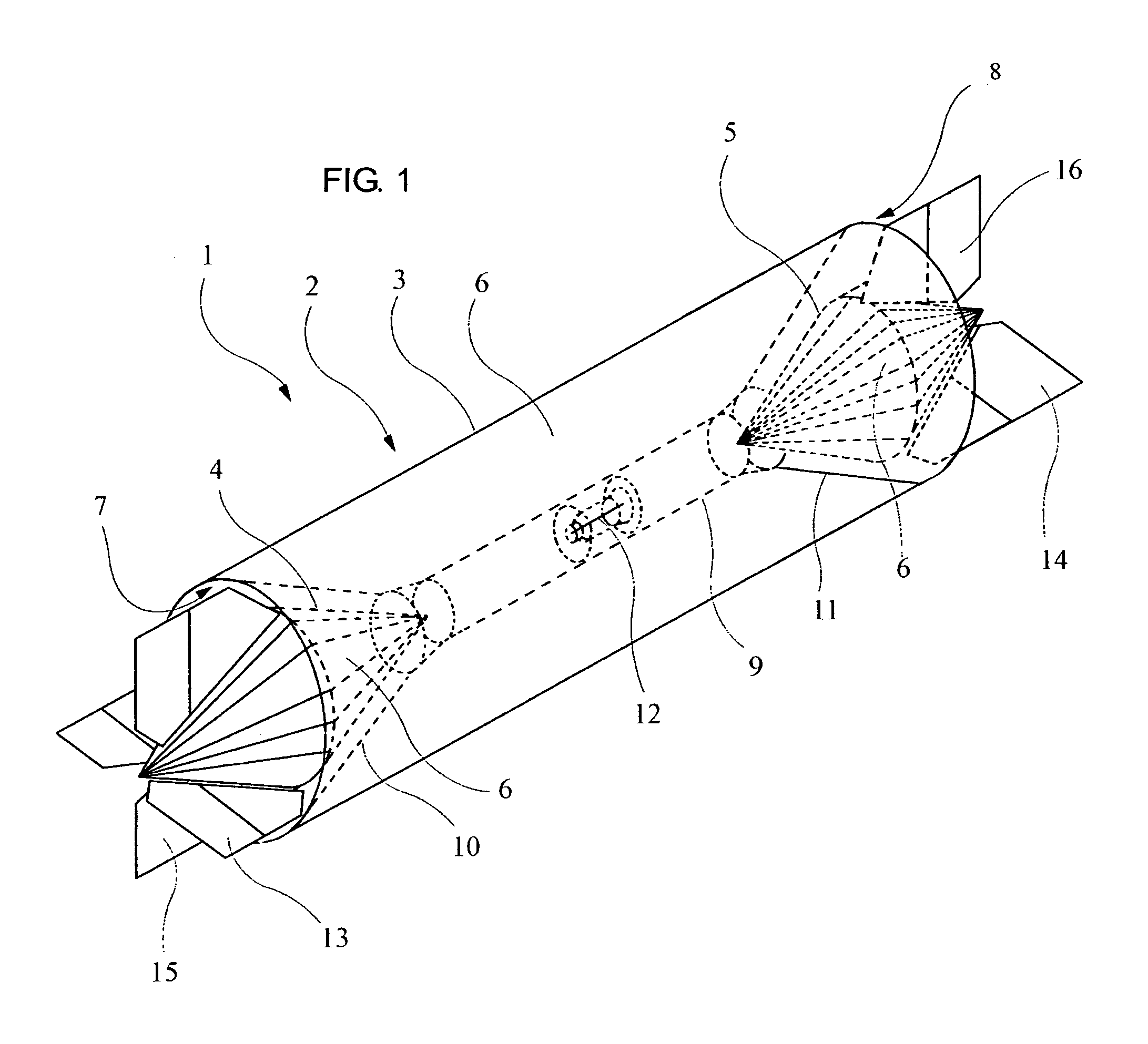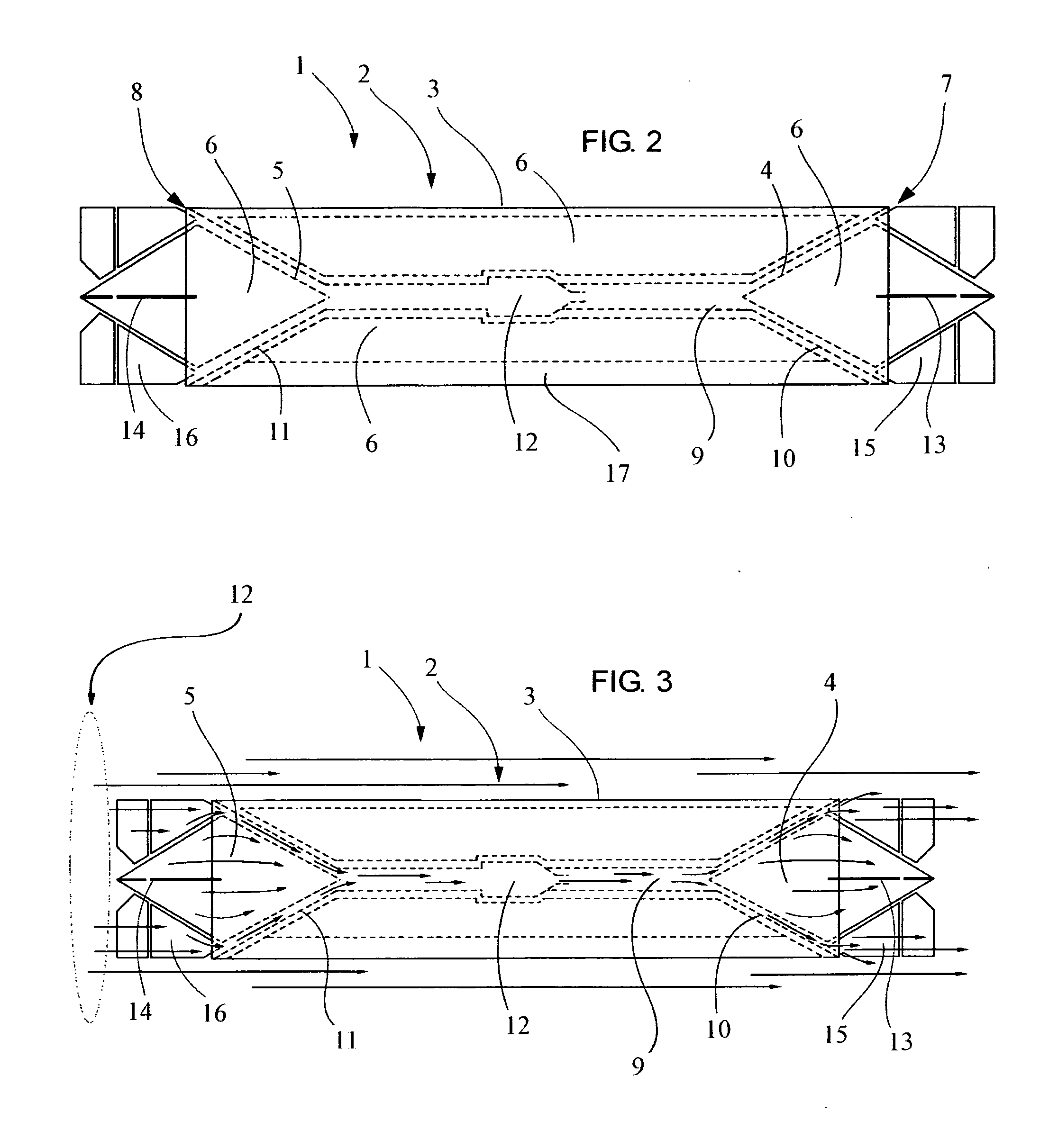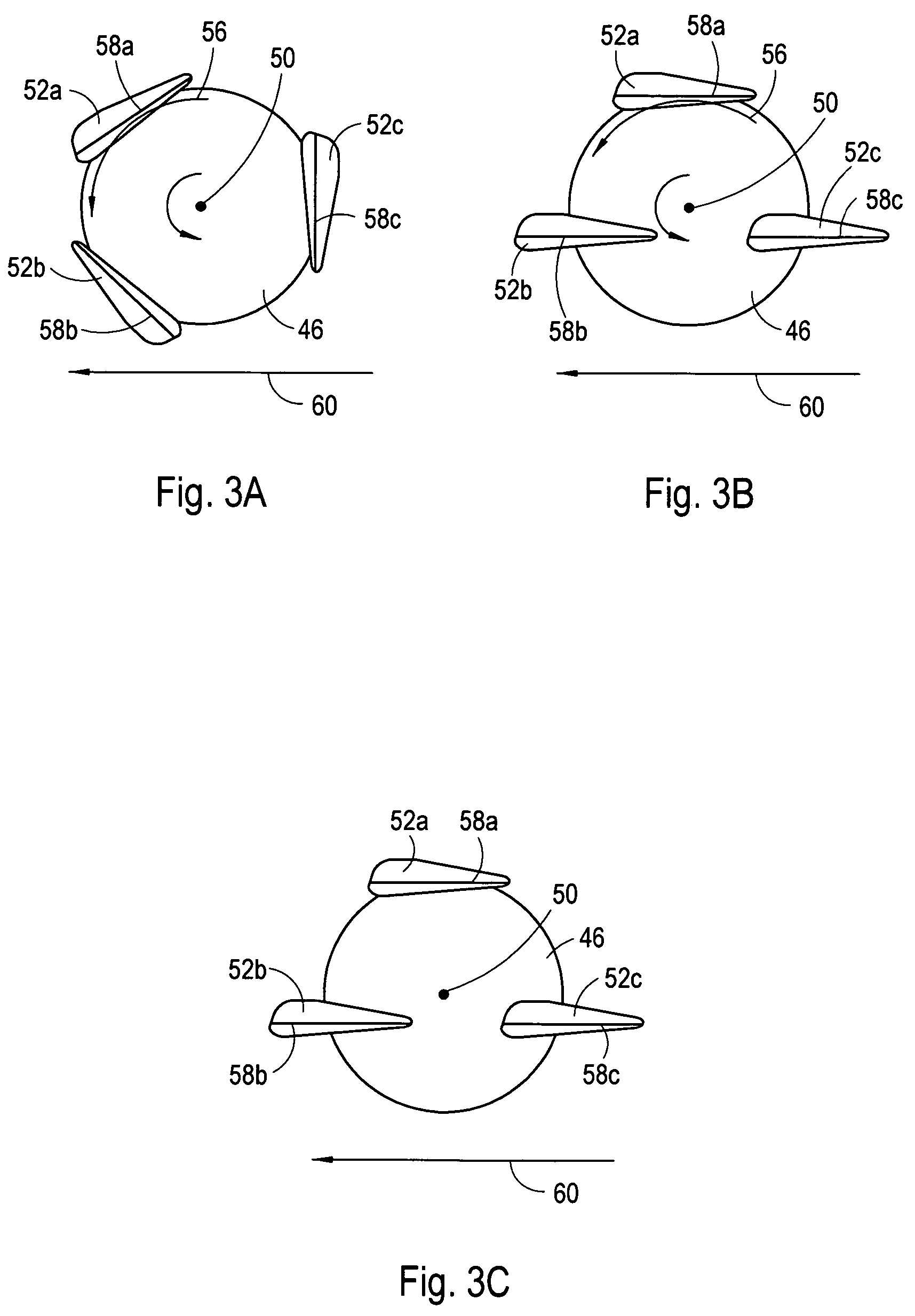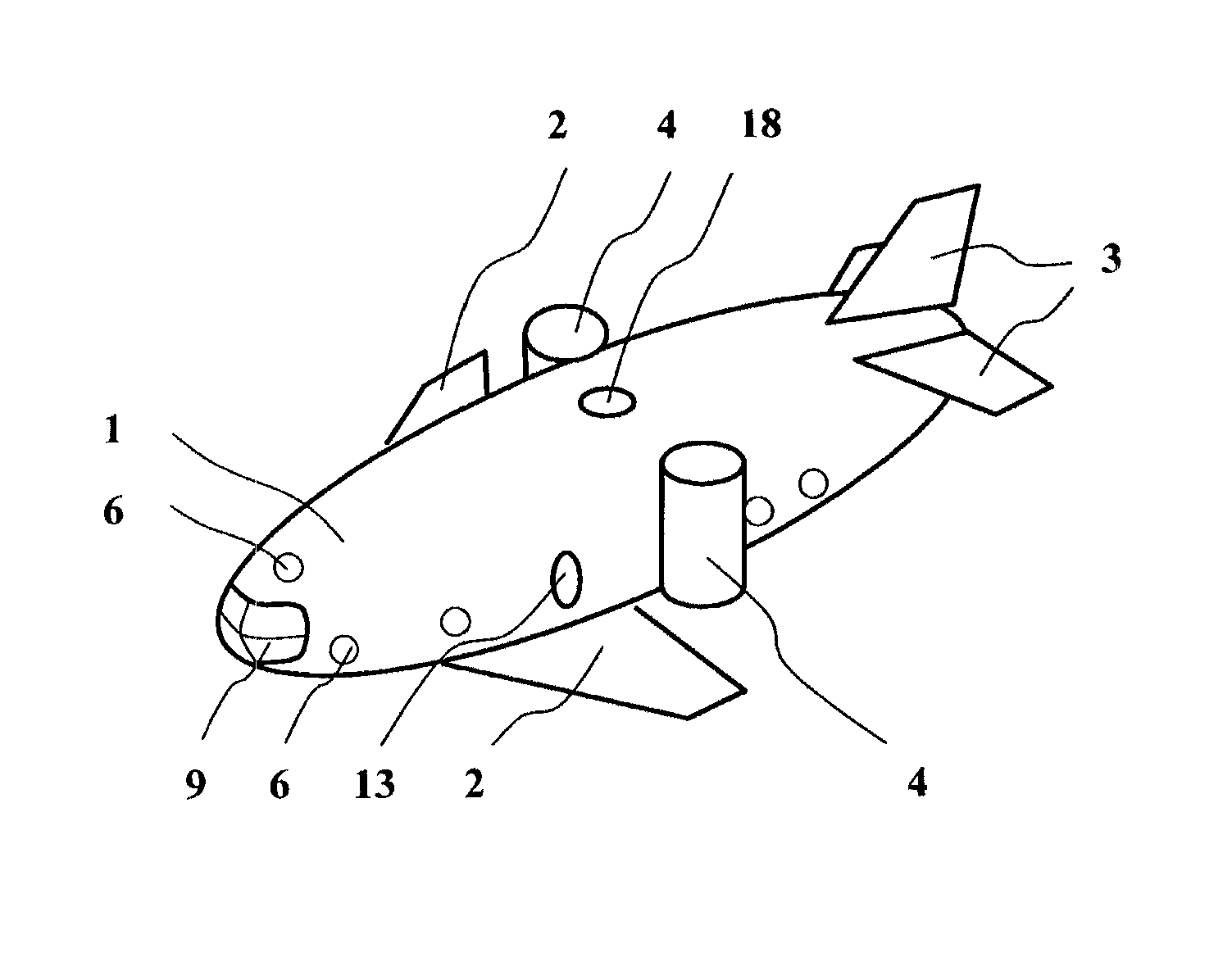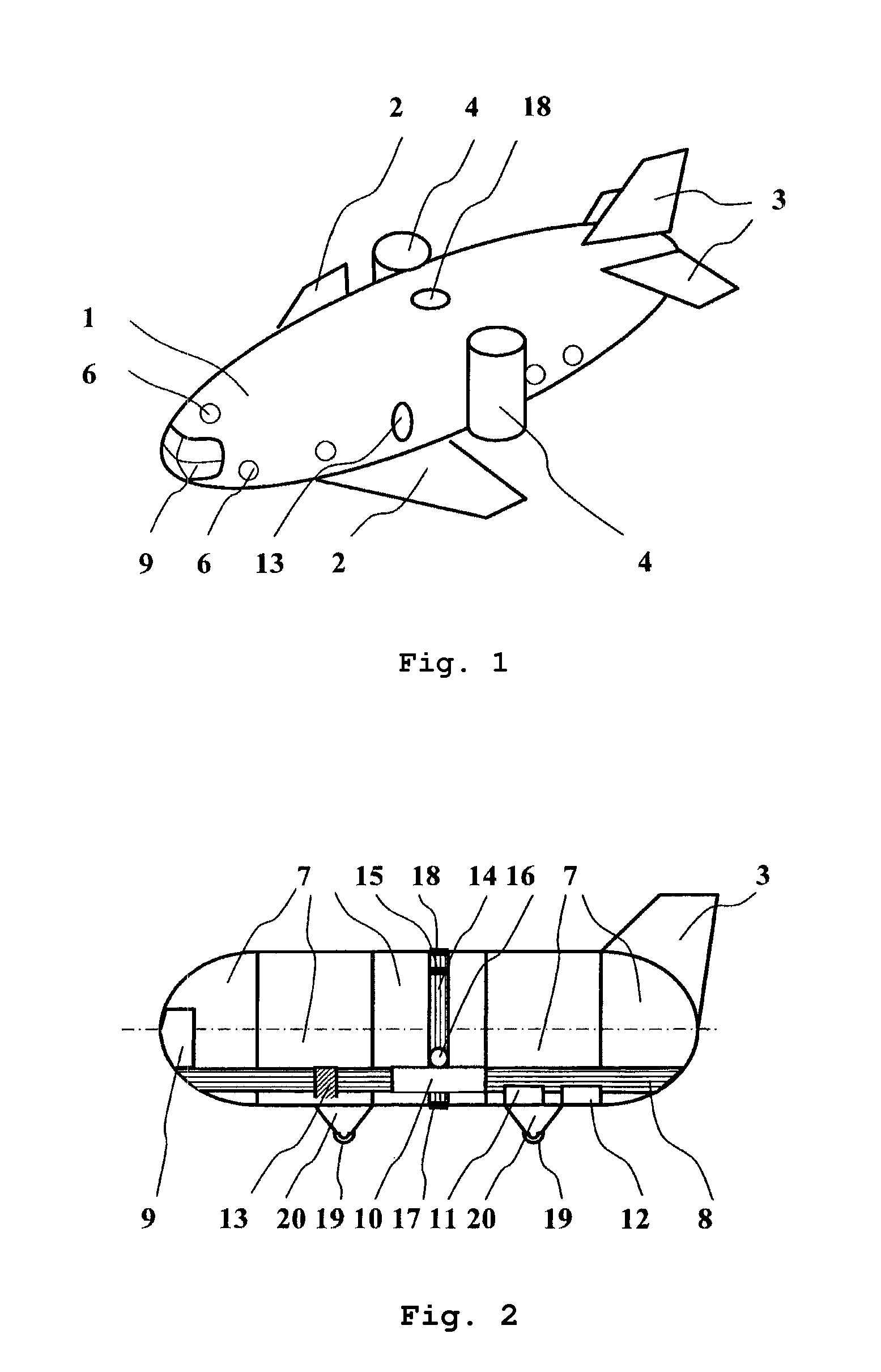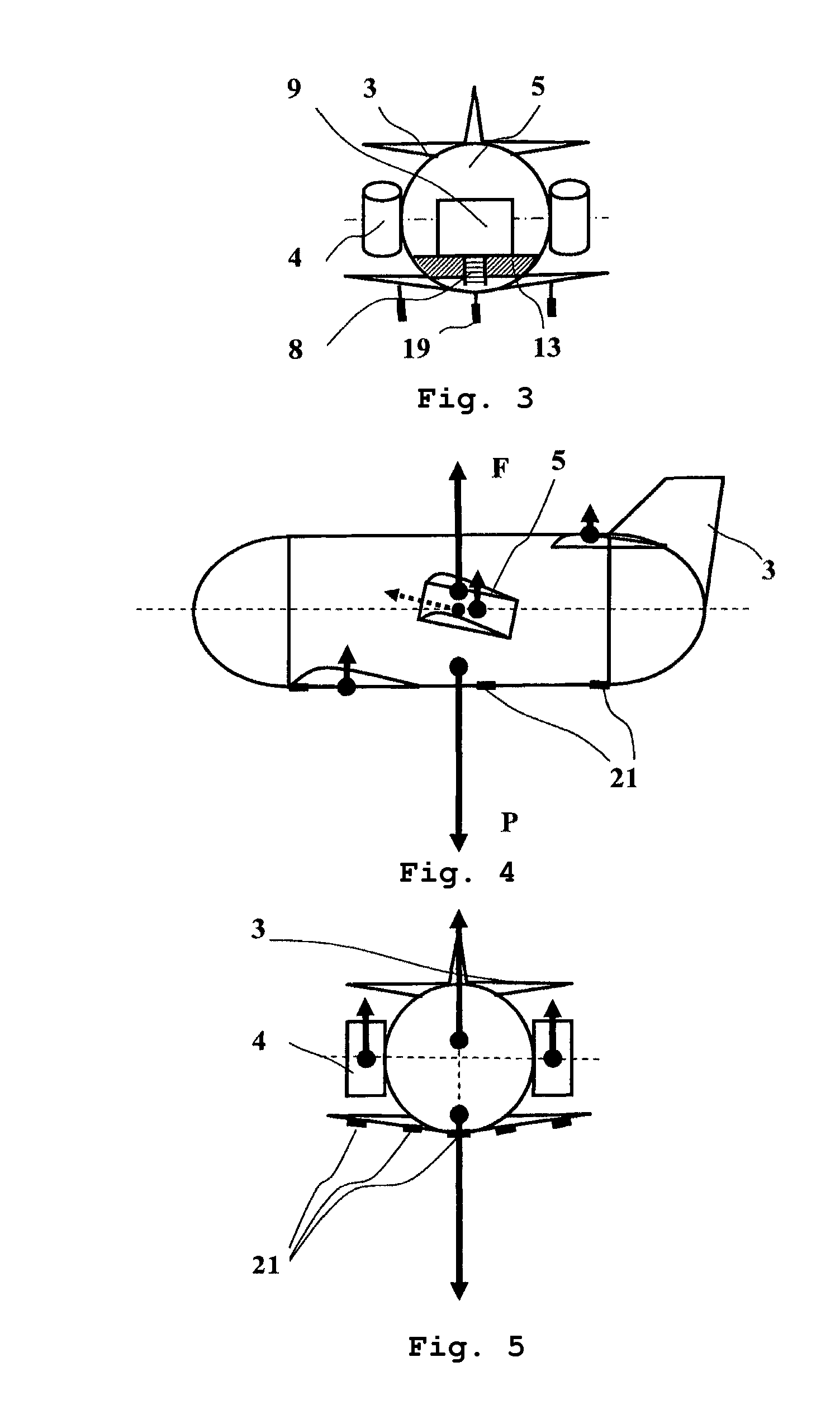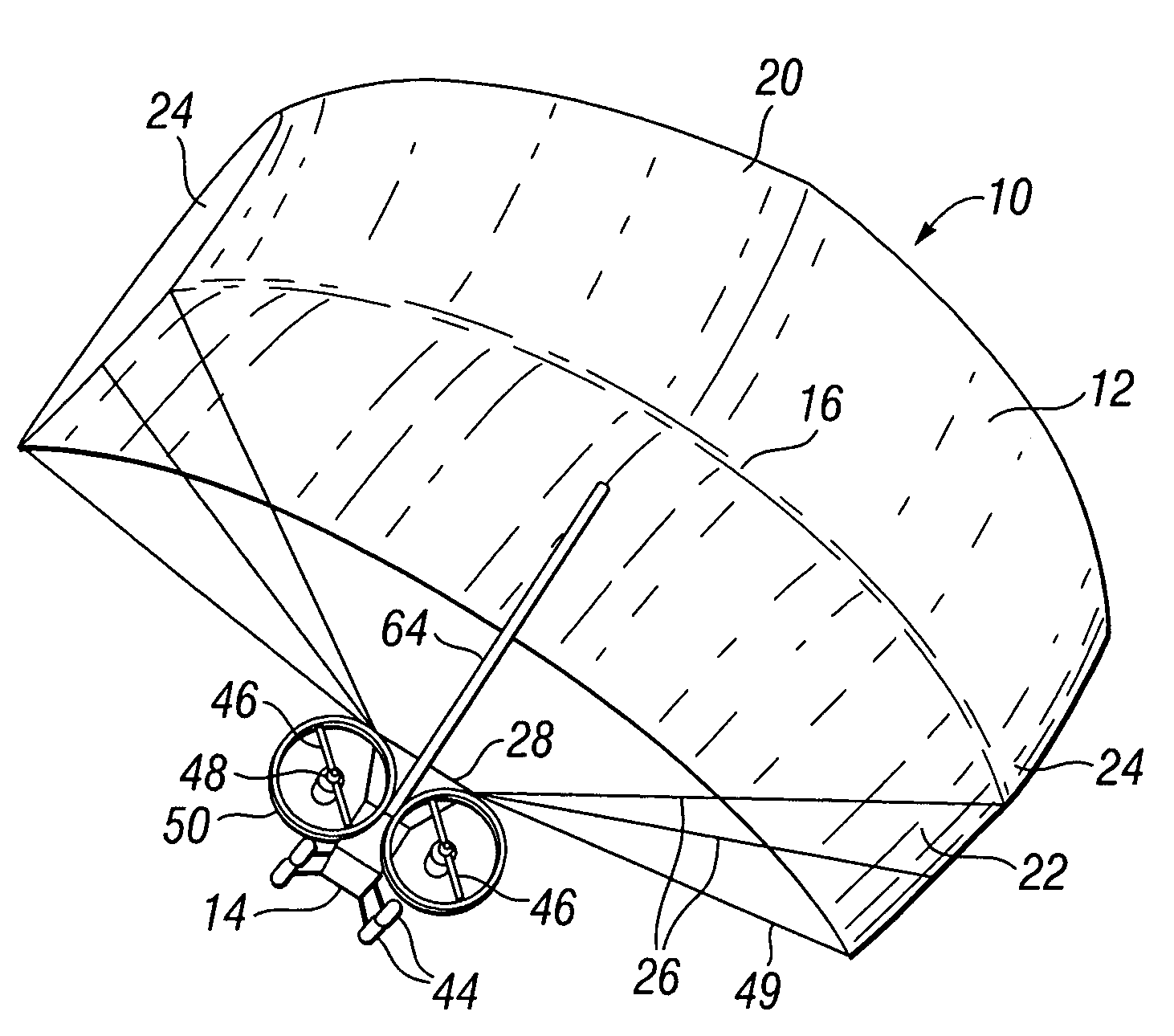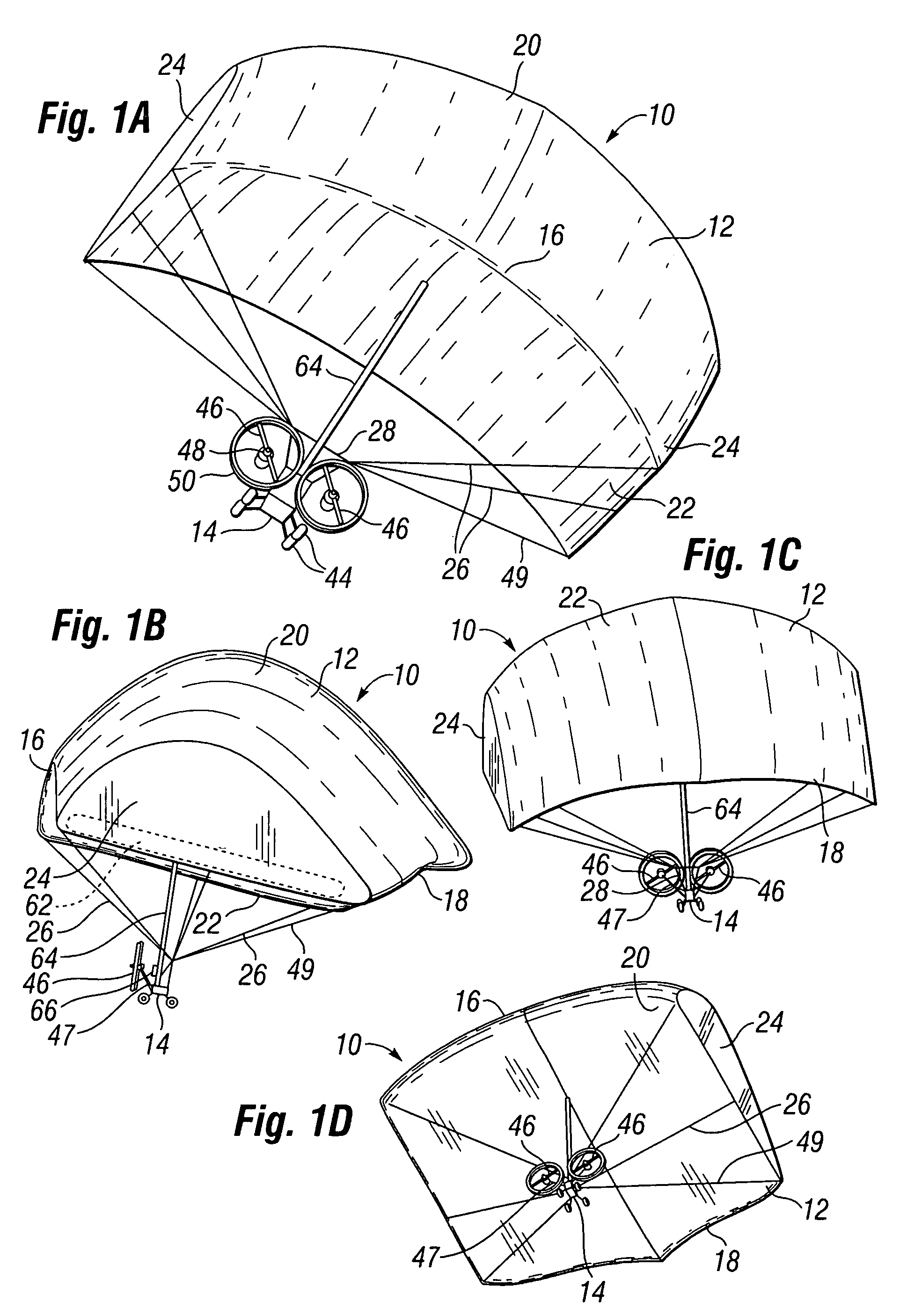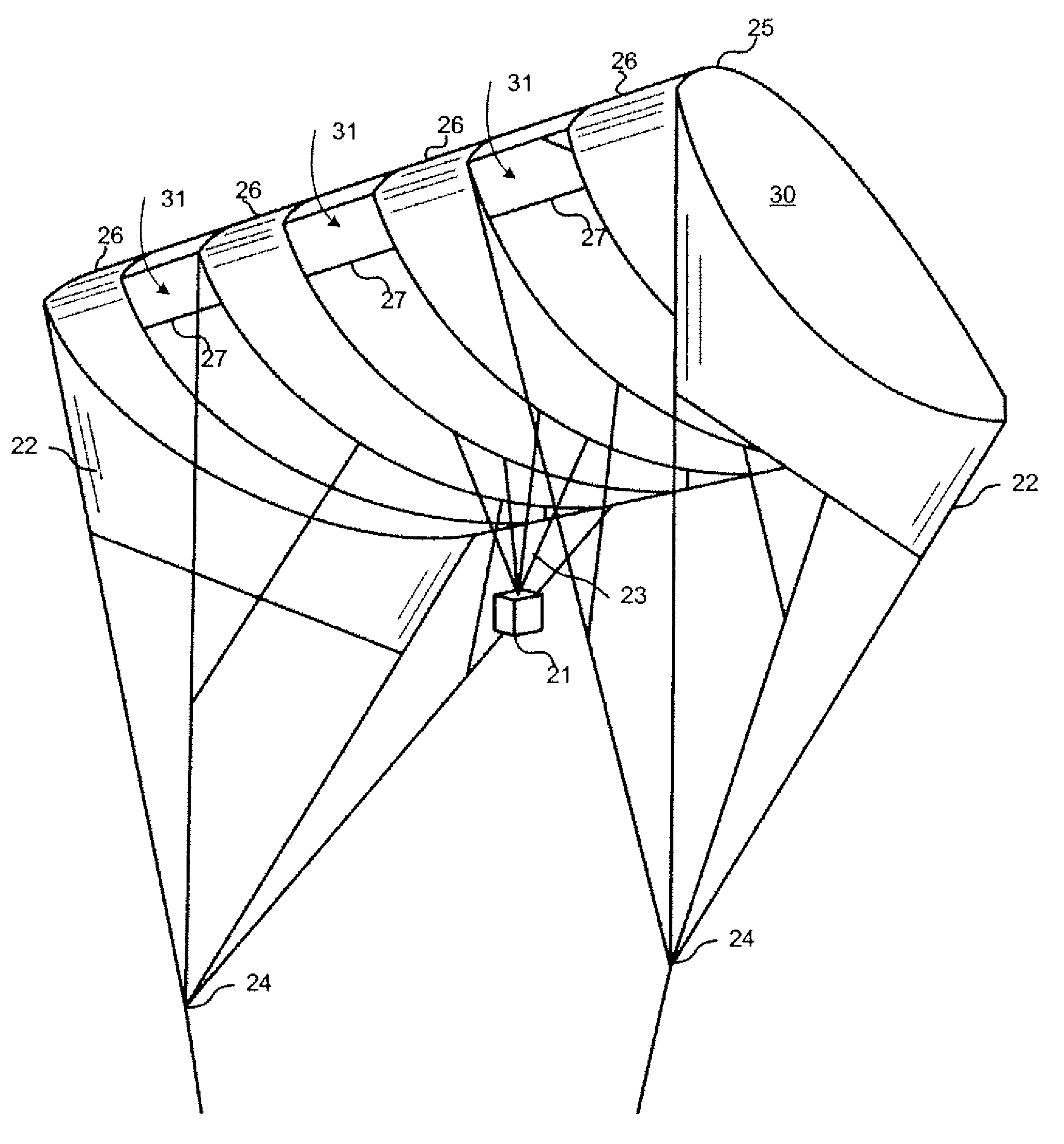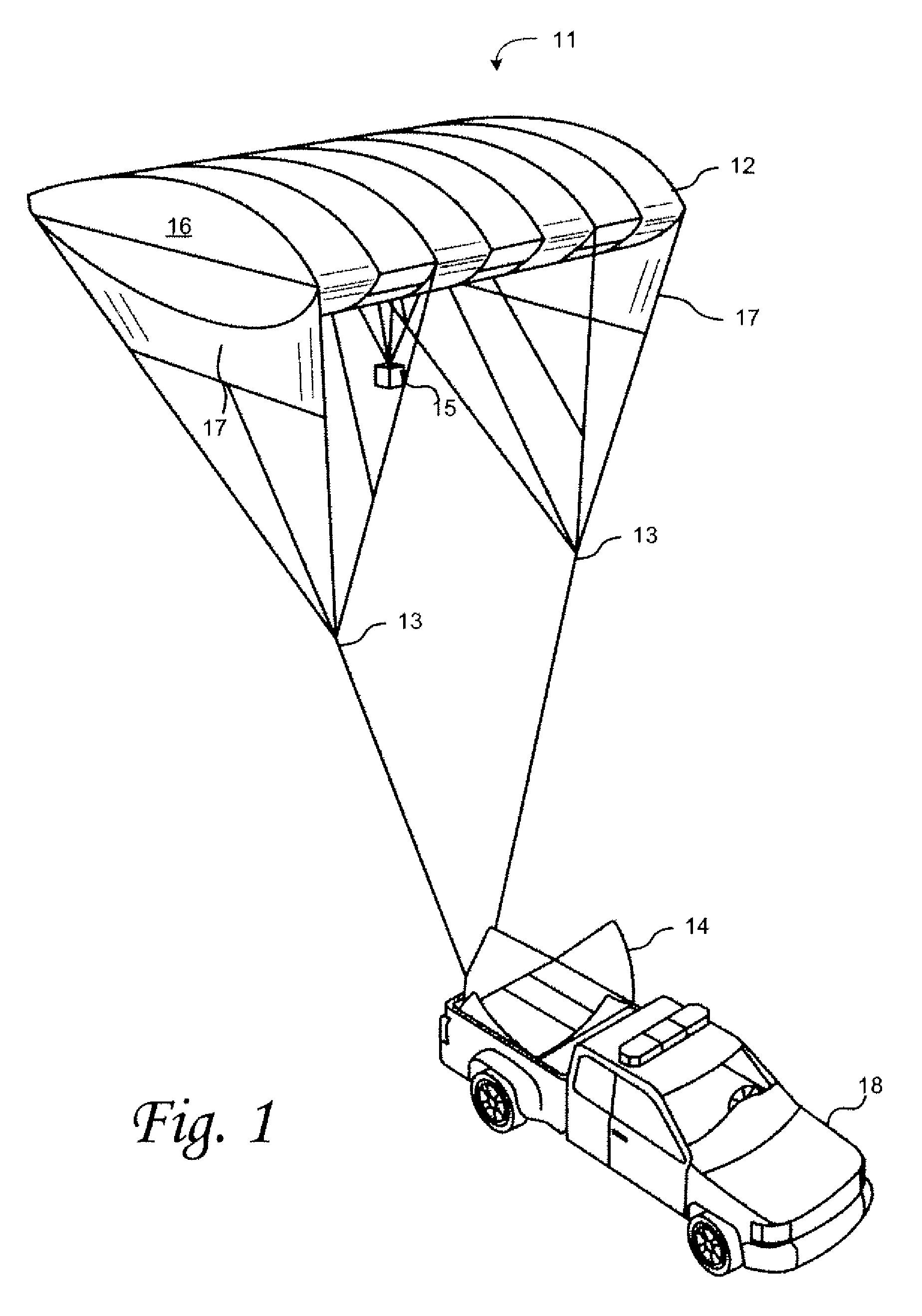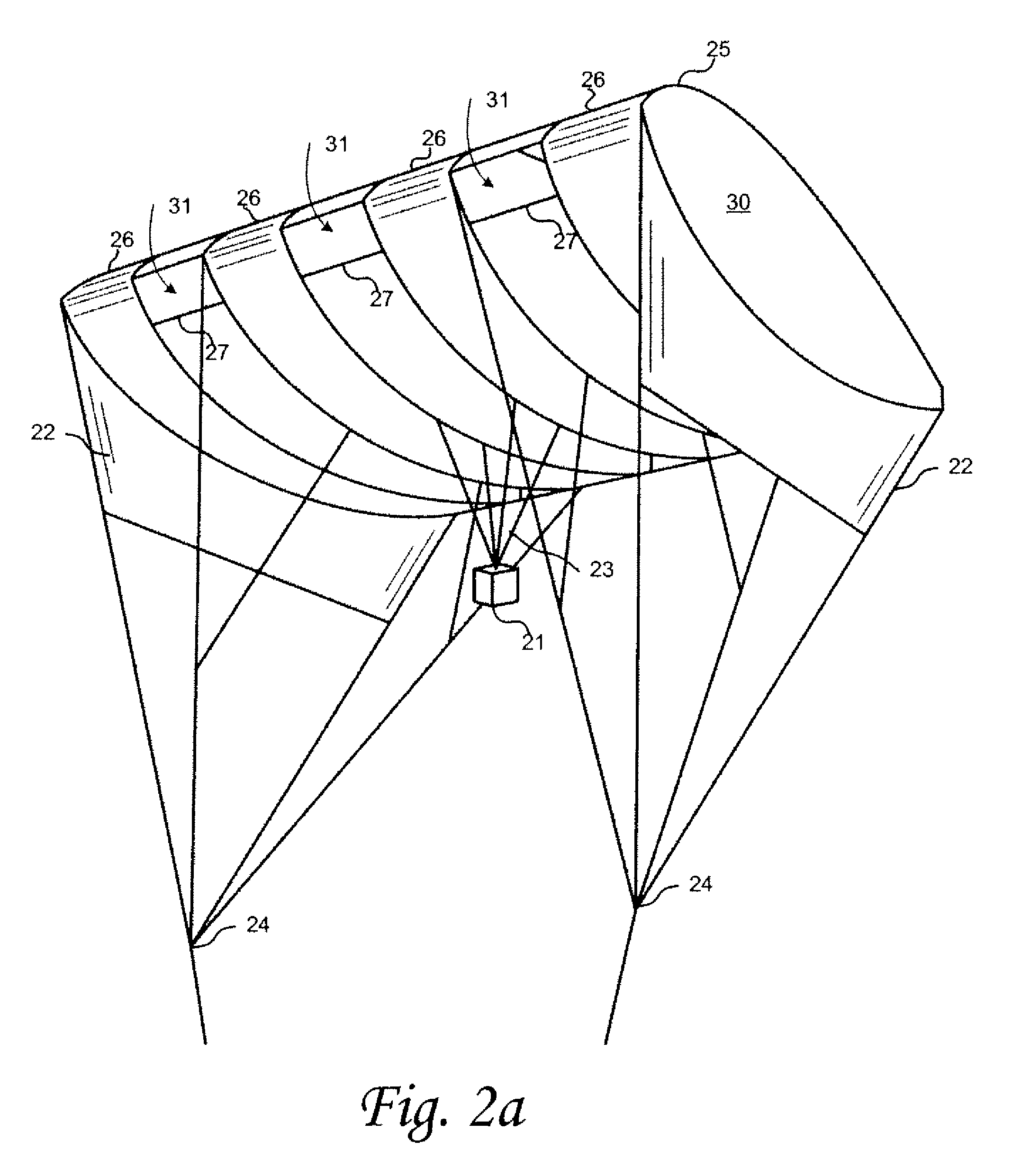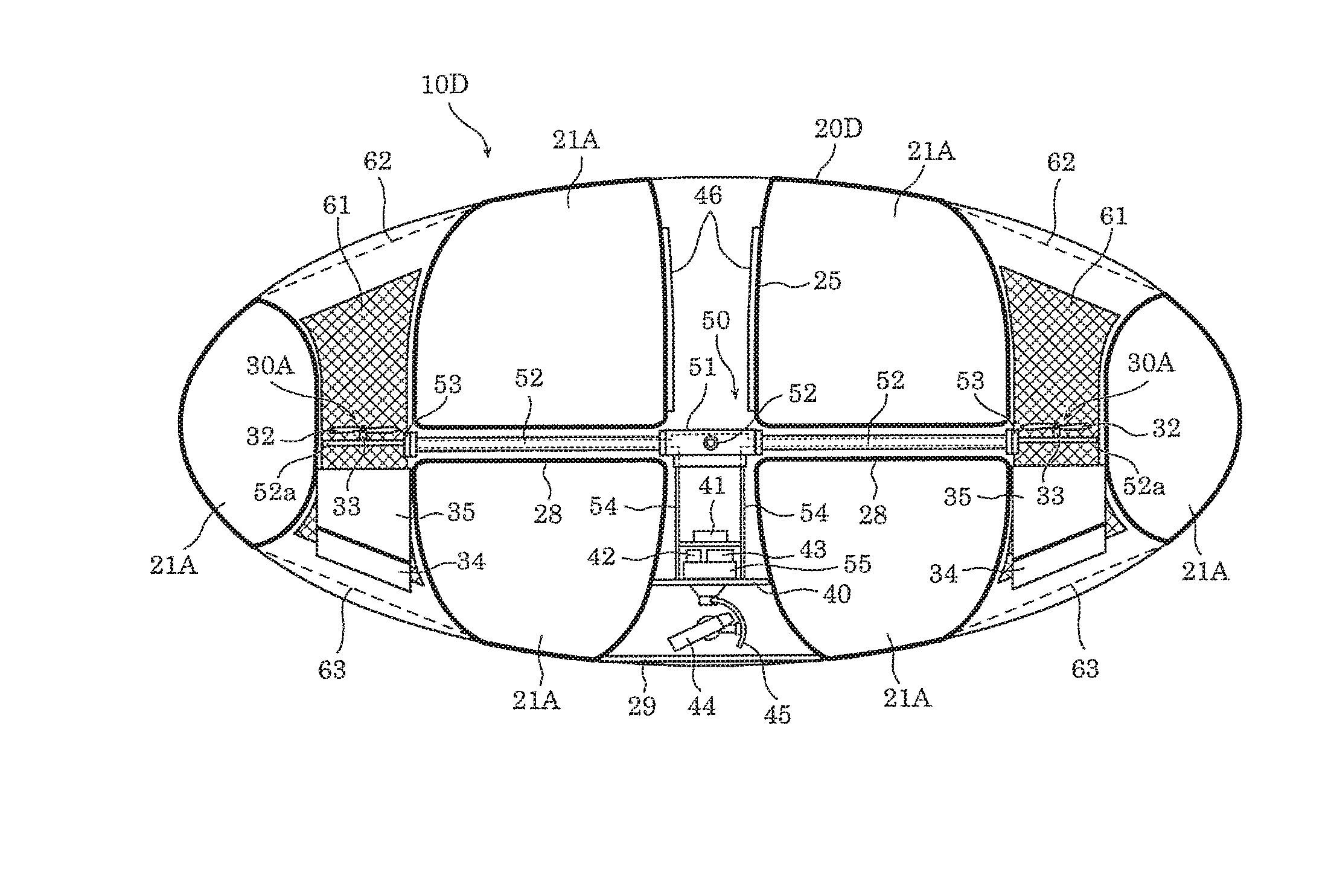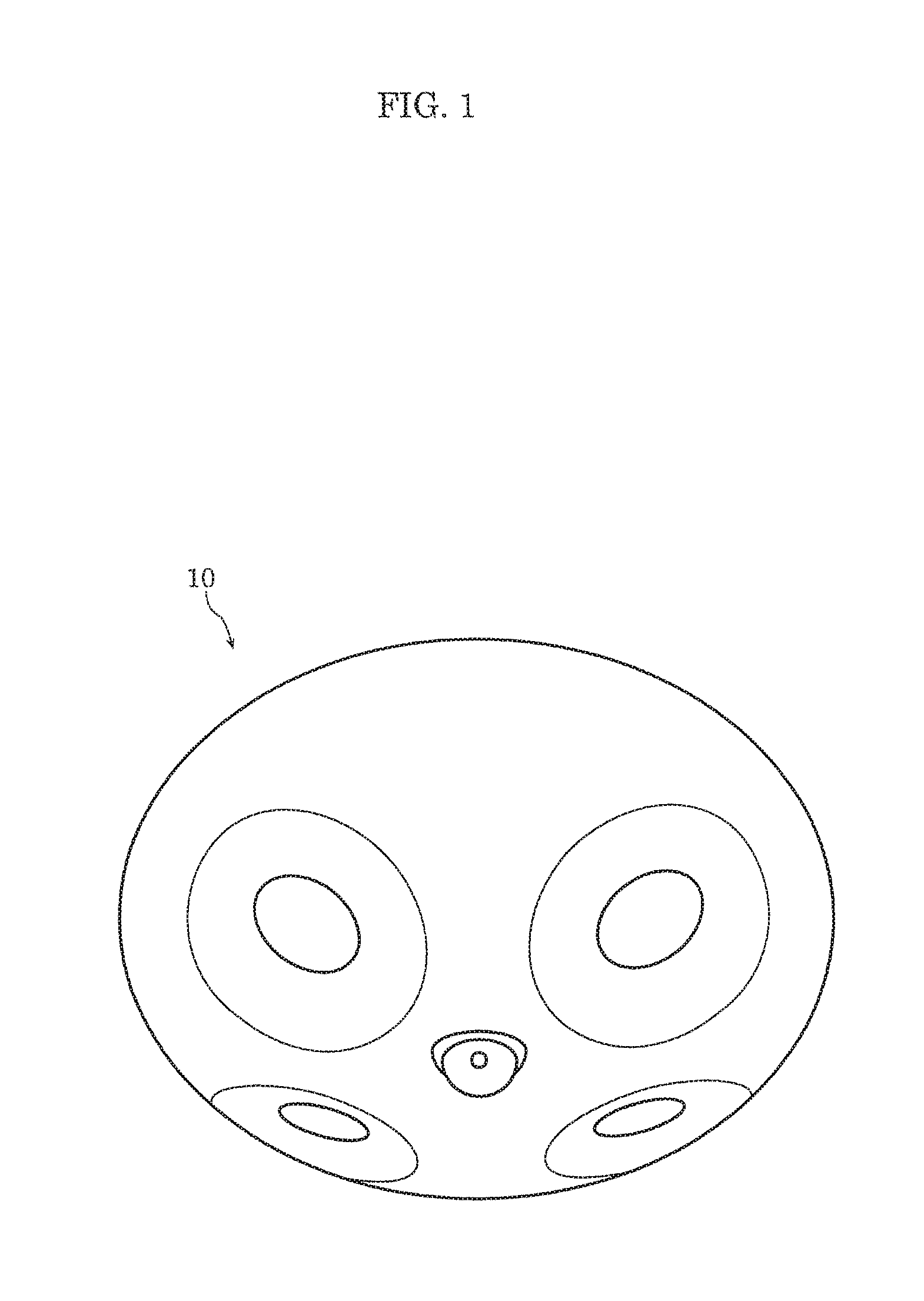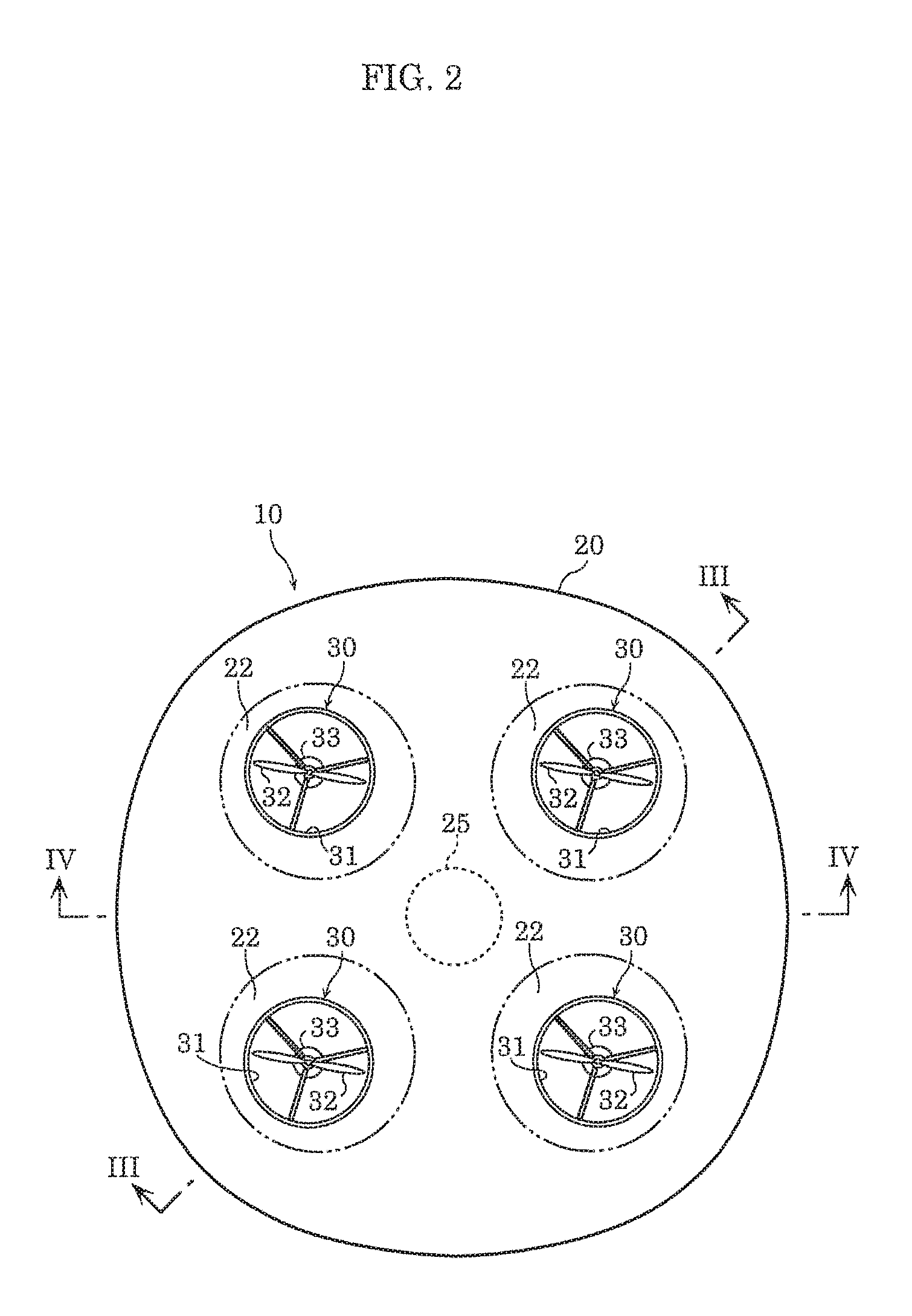Patents
Literature
Hiro is an intelligent assistant for R&D personnel, combined with Patent DNA, to facilitate innovative research.
100results about "Hybrid airships" patented technology
Efficacy Topic
Property
Owner
Technical Advancement
Application Domain
Technology Topic
Technology Field Word
Patent Country/Region
Patent Type
Patent Status
Application Year
Inventor
Hybrid airship-drone farm robot system for crop dusting, planting, fertilizing and other field jobs
InactiveUS20160307448A1Increase the areaIncrease productionRemote controlled aircraftRobotRobotic systemsHectare
Modern farming is currently being done by powerful ground equipment or aircraft that weigh several tons and treat uniformly tens of hectares per hour. Automated farming can use small, agile, lightweight, energy-efficient automated robotic equipment that flies to do the same job, even able to farm on a plant-by-plant basis, allowing for new ways of farming. A hybrid airship-drone has both passive lift provided by a gas balloon and active lift provided by propellers. A hybrid airship-drone may be cheaper, more stable in flight, and require less maintenance than other aerial vehicles such as quadrocopters. However, hybrid airship-drones may also be larger in size and have more inertia that needs to be overcome for starting, stopping and turning.
Owner:BEE ROBOTICS
System, method, and apparatus for hybrid dynamic shape buoyant, dynamic lift-assisted air vehicle, employing aquatic-like propulsion
InactiveUS20080087762A1Economic securityEasy to operateNon-rigid airshipsDrag reductionMorphingMarine propulsion
A method and system for air flight is shown. The blended lifting body system includes a lift module, a propulsion module, a payload module and a control system. A conventional control system morphs the other modules through variable buoyant lift, internal structures and a flexible exterior, and varies bio-inspired oscillation in the propulsion module in order to facilitate takeoff, flight and landing. The hybrid dynamic / morphing shape buoyant, dynamic lift-assisted (hybrid) air vehicle, employing aquatic-like (e.g. fin) propulsion was discussed, with many variations and examples.
Owner:HOLLOMAN RICHARD +1
Hybrid flying wing
InactiveUS6860449B1Reduce restrictionsLow intensity of pressureAircraft navigation controlAircraft stabilisationJet aeroplaneLighter than air
An aircraft has a flying wing and two wingtip hulls installed on the wingtips of the flying wing. Both of the wingtip hulls contain lighter-than-air gas to generate static lift. These wingtip hulls not only contribute to lift-generating but also help the aircraft achieve roll stability and control. Forward propulsion systems are installed at the upper-front positions of the flying wing. When vertical and / or short take-off and landing (V / STOL) capability is required, one or more lift-fan propulsion systems can be installed on the flying wing. The lift-fan propulsion systems can either be driven by their own engines or by the power transmitted from the forward propulsion systems. Payload can be carried inside the flying wing or be hung under or held above the flying wing.
Owner:CHEN ZHUO
Delta-winged hybrid airship
ActiveUS20050258306A1Long flight enduranceHigh altitudeEnergy efficient board measuresAll-wing aircraftHigh energyVolumetric Mass Density
In one aspect, a hybrid airship including an outer shell, a plurality of helium filled gas envelopes, and an all-electric propulsion system may have the shape of a delta-wing. In some embodiments, the hybrid airship may be launched using buoyancy lift alone and aerodynamic lift may be provided by the all-electric propulsion system. In one aspect, a photovoltaic array and a high energy density power storage system may be combined to power the propulsion system making the propulsion system regenerative. The delta-wing shape can provide a surface area large enough to accommodate very large circular or elliptical transmission devices. By continuously recharging the power storage system, the hybrid airship in accordance with some embodiments can stay aloft at an operational altitude of at least about 85,000 ft for months or even years. The hybrid airship may function as an airborne military communications relay platform.
Owner:THE BOEING CO
Delta-winged hybrid airship
ActiveUS7093789B2Long flight enduranceHigh altitudeEnergy efficient board measuresAll-wing aircraftHigh energyVolumetric Mass Density
In one aspect, a hybrid airship including an outer shell, a plurality of helium filled gas envelopes, and an all-electric propulsion system may have the shape of a delta-wing. In some embodiments, the hybrid airship may be launched using buoyancy lift alone and aerodynamic lift may be provided by the all-electric propulsion system. In one aspect, a photovoltaic array and a high energy density power storage system may be combined to power the propulsion system making the propulsion system regenerative. The delta-wing shape can provide a surface area large enough to accommodate very large circular or elliptical transmission devices. By continuously recharging the power storage system, the hybrid airship in accordance with some embodiments can stay aloft at an operational altitude of at least about 85,000 ft for months or even years. The hybrid airship may function as an airborne military communications relay platform.
Owner:THE BOEING CO
Inflatable endurance unmanned aerial vehicle
An inflatable endurance unmanned vehicle includes an inflatable hull with at least one inflatable wing extending therefrom. The inflatable wing has at least one spar movable between an extended position and a retracted position. Photovoltaic arrays are used to power the vehicle during daytime operation and power an electrolyzer. A fuel cell powers the vehicle during nighttime operation.
Owner:LOCKHEED MARTIN CORP
High-aspect ratio hybrid airship
InactiveUS7137592B2Long flight enduranceHigh operating requirementsAircraft stabilisationEnergy efficient board measuresHigh energyVolumetric Mass Density
Owner:THE BOEING CO
Inflatable endurance unmanned aerial vehicle
An inflatable endurance unmanned vehicle includes an inflatable hull with at least one inflatable wing extending therefrom. The inflatable wing has at least one spar movable between an extended position and a retracted position. Photovoltaic arrays are used to power the vehicle during daytime operation and power an electrolyzer. A fuel cell powers the vehicle during nighttime operation.
Owner:LOCKHEED MARTIN CORP
Lenticular airship
InactiveUS20080179454A1Power plant arrangements/mountingAircraft controlOblate spheroidVertical plane
An airship may include a hull substantially shaped as an oblate spheroid, one or more frame members defining a support structure, wherein the support structure forms at least a partial support for the hull, at least one horizontal stabilizing member operably coupled to a lower surface of the airship, and at least one horizontal stabilizing member having a first end and a second end. The at least one horizontal stabilizing member may define an anhedral configuration. The airship may also include a vertical stabilizing member having a first end pivotally coupled to the airship and a second end oriented to remain below an upper surface of the airship. The vertical stabilizing member may be configured to pivot within a vertical plane, and the first end of the vertical stabilizing member and the first end of the at least one horizontal stabilizing member may be operably coupled to one another.
Owner:LTA
Inflatable wing flight vehicle
InactiveUS20090108135A1Improved lift characteristicThin atmosphereCosmonautic vehiclesCosmonautic partsNatural satelliteLow speed
The invention is an aircraft having an inflatable wing connected to a base unit, with the inflatable wing inflated with a lifting gas such as helium. The inflatable wing has a series of cell structures, and may be configured with ballonets to selectively introduce and expel outside air within the inflatable wing to vary the buoyancy and / or airfoil properties of the inflatable wing. The aircraft is particularly useful at low speeds and in thin atmospheres (such as at high Earth altitudes and on Mars), and can be used for interplanetary missions to explore planetary bodies, such as moons and planets, having atmospheres.
Owner:SHAW DONALD ORVAL
Hybrid lift air vehicle
InactiveUS20120273608A1Improve aerodynamic efficiencyImprove fuel efficiencyRigid airshipsHybrid airshipsFlight vehicleLighter than air
A hybrid lift air vehicle for carrying and transporting a load, comprising an envelope having a generally ellipsoidal shape adapted to receive a volume of lighter-than-air gas, at least two variable thrust vertical thrusters in secure engagement with the envelope and at least two variable thrust lateral thrusters in secure engagement with the envelope, means for temporarily securely engaging the load to the envelope wherein the volume of lighter-than-air gas has a buoyancy that offsets at least 25% of the weight of the air vehicle when unloaded, wherein the thrust from the at least two vertical thrusters may be varied to raise and lower the air vehicle and the load when engaged, and wherein the thrust from the at least two lateral thrusters may be varied to maneuver and transport the raised air vehicle and the load when engaged.
Owner:JESS PETER E +1
Vertical Lifting of Airplanes to Flying Heights
InactiveUS20070187547A1Reduce fuel consumptionEmission reductionLaunch systemsCosmonautic partsJet aeroplanePropeller
Lifting “ferries” having rotatable wings with propeller engines can lift airplanes vertically, during takeoffs, in a quieter and safer manner with reduced fuel consumption and carbon dioxide emissions. Four rotatable wings are used, to provide balanced lifting force, and to prevent downdraft or propwash from blowing directly against the wings of an airplane being lifted. An optional buoyant aircraft such as a zeppelin can also be used to provide lifting force. Such buoyant aircraft should have adjustable internal struts, to convert it into a streamlined shape for moderate-speed flight and descent. Alternately, a zeppelin can be provided directly with four large rotatable propeller engines, to create a single-unit buoyant lifting ferry.
Owner:KELLY PATRICK D
Lenticular airship
An airship may include a hull substantially shaped as an oblate spheroid, one or more frame members defining a support structure, wherein the support structure forms at least a partial support for the hull, at least one horizontal stabilizing member operably coupled to a lower surface of the airship, and at least one horizontal stabilizing member having a first end and a second end. The at least one horizontal stabilizing member may define an anhedral configuration. The airship may also include a vertical stabilizing member having a first end pivotally coupled to the airship and a second end oriented to remain below an upper surface of the airship. The vertical stabilizing member may be configured to pivot within a vertical plane, and the first end of the vertical stabilizing member and the first end of the at least one horizontal stabilizing member may be operably coupled to one another.
Owner:LTA
Solar-powered aircraft
InactiveUS20070034741A1Weight of to shiftPower installationsEnergy efficient board measuresHydrogenFuel cells
A solar-powered aircraft uses solar energy to electrolyze on-board water to produce hydrogen. The hydrogen fills various on-board tanks, causing the aircraft to become lighter than air. The hydrogen is also used to operate a fuel cell which provides power for electrical equipment, including a motor for turning a propeller. Water produced as waste by the fuel cell is recycled for use in the production of hydrogen. When hydrogen is removed from the tanks, either because it is consumed by the fuel cell or because it is compressed and pumped out of the tanks, air returns to the tanks, and the aircraft becomes heavier than air. The aircraft can thus be made to climb and descend by making it lighter than air, or heavier than air. The aircraft emits no harmful substances into the environment. The aircraft can remain aloft indefinitely, limited only by an insignificant amount of leakage of hydrogen and water.
Owner:FULLER HOWARD J
Hybrid air vehicle having air cushion landing gear
InactiveUS6880783B2Efficient aerodynamic liftSimple interfaceFloatsNon-rigid airshipsJet aeroplaneFlight vehicle
A hybrid air vehicle having a gas-filled contoured flattened hull including a pair of longitudinally extending side lobes defining, on the underside of the hull, a longitudinally extending central recess, a payload module received in the central recess and air cushion landing gear units on the underside of the side lobes of the hull. The landing gear units are spaced apart on either side of the payload module. The hybrid air vehicle has characteristics of an airplane, a lighter-than-air airship and a hovercraft.
Owner:HYBRID AIR VEHICLES
High-altitude launching of rockets lifted by helium devices and platforms with rotatable wings
InactiveUS7131613B2Safer and less-expensive and efficient launchingEasily reusable subassembliesConvertible aircraftsLaunch systemsFuel tankEngineering
A system is disclosed for lifting a rocket into the upper atmosphere and establishing forward flight at several hundred miles per hour, before the rocket engines are ignited and the rocket is released from the lifting system. The main subassemblies of this lifting system comprise:(1) an array of large helium-filled dirigibles, of a size that can provide hundreds or thousands of tons of lifting force;(2) a tank-holding assembly that will be tethered to the dirigibles, and that will contain pumps and high-pressure tanks, to recapture and store the helium for use in subsequent launches; and,(3) a winged platform, with wings that can be rotated vertically during liftoff, and horizontally to establish forward flight after a desired altitude has been reached, and having conventional aircraft engines on each wing.This system enables safer, less expensive, and more efficient launching of rockets and heavy payloads into space, using easily reusable subassemblies.
Owner:TETRAHEED
Bi-convex airship
InactiveUS20090314880A1Reduce resistanceNon-rigid airshipsRigid airshipsClassical mechanicsMechanics
An airship comprises a shell having a bi-convex shape, wherein the shell encompasses a volume, and a gas storage system located within the volume.
Owner:THE BOEING CO
Hybrid airship-drone farm robot system for crop dusting, planting, fertilizing and other field jobs
InactiveUS9852644B2Increase the areaIncrease productionRemote controlled aircraftRobotRobotic systemsHectare
Modern farming is currently being done by powerful ground equipment or aircraft that weigh several tons and treat uniformly tens of hectares per hour. Automated farming can use small, agile, lightweight, energy-efficient automated robotic equipment that flies to do the same job, even able to farm on a plant-by-plant basis, allowing for new ways of farming. A hybrid airship-drone has both passive lift provided by a gas balloon and active lift provided by propellers. A hybrid airship-drone may be cheaper, more stable in flight, and require less maintenance than other aerial vehicles such as quadrocopters. However, hybrid airship-drones may also be larger in size and have more inertia that needs to be overcome for starting, stopping and turning.
Owner:BEE ROBOTICS
Methods of buoyant and/or semi-buoyant (BASB) vehicles utilizing basb in conjunction with pressurized fluid stream jet (PJET) and variously shaped bodies, wings, outriggers, and propulsion/repulsion configurations
InactiveUS6848647B2Affect liftAffect vehicular stabilizationConvertible aircraftsAircraft stabilisationInternal pressureWind speed
A method wherein a vehicle is capable of movement on or over land, and / or on, over, or under water. Various body, wing, tail, and / or outrigger shapes facilitate movement and develop lift. Buoyancy or semi-buoyancy is developed utilizing various chambers to contain controlled volumes of gaseous or liquid substances. Motion is augmented by propulsion or repulsion mechanisms, including pressurized liquid stream jet (PJET) propulsion. The vehicle is capable of modifying its shape and / or the curvature of various parts, such as wings, tails, and / or outriggers, by manipulating the internal skeleton, the internal compartments supporting the external surfaces, and / or the internal pressure of the shape. Control Agents with mechanized or manual support manage the vehicle's operations controlling various movement particular information, as well as baseline algorithms, such as wind speed, currents, and location.
Owner:BASB DESIGN
Emergency and rescue aircraft
InactiveUS20100096493A1Increase speedBreathing protectionPower plant arrangements/mountingFlight vehicleFuel tank
The invention relates to lighter-than-air vehicles. The inventive aircraft comprises a rigid body with carrier gas-containing shells and propulsers arranged inside aerodynamic modules which are embodied in the form of aerodynamically shaped toroidal bodies of revolution. A longitudinal through passage in embodied in the lower part of the body in such a way that it communicates a crew cabin, a cargo-and-passenger compartment, fuel tanks and accessories and is provided with exit hatches and devices for docking to external objects, an extensible stairway with fences and a demountable carriage. The aircraft also comprises a transversal passage with overwing exits and a vertical passage provided with a cable hoist and devices for lowering and lifting people and cargo. The lower part of the body and hollow wings are filled with a foamed plastic which is used for providing the aircraft with floatability and strength. The aim of the invention is to extend the list of technical means.
Owner:KHAKIMOV BORIS V +3
High-altitude launching of rockets lifted by helium devices and platforms with rotatable wings
InactiveUS20050116091A1Improve pressure resistanceHigh stressConvertible aircraftsLaunch systemsHigh pressureHelium
A system is disclosed for lifting a rocket into the upper atmosphere and establishing forward flight at several hundred miles per hour, before the rocket engines are ignited and the rocket is released from the lifting system. The main subassemblies of this lifting system comprise: (1) an array of large helium-filled dirigibles, of a size that can provide hundreds or thousands of tons of lifting force; (2) a tank-holding assembly that will be tethered to the dirigibles, and that will contain pumps and high-pressure tanks, to recapture and store the helium for use in subsequent launches; and, (3) a winged platform, with wings that can be rotated vertically during liftoff, and horizontally to establish forward flight after a desired altitude has been reached, and having conventional aircraft engines on each wing. This system enables safer, less expensive, and more efficient launching of rockets and heavy payloads into space, using easily reusable subassemblies.
Owner:TETRAHEED
Solar-powered aircraft
InactiveUS7278607B2Weight of to shiftPower installationsEnergy efficient board measuresFuel cellsHydrogen
Owner:FULLER HOWARD J
High-aspect ratio hybrid airship
InactiveUS20050269441A1Long flight enduranceHigh operating requirementsEnergy efficient board measuresEfficient propulsion technologiesHigh energyVolumetric Mass Density
In one aspect, a hybrid airship including an outer shell, a plurality of helium filled gas envelopes, and an all-electric propulsion system can have a high-aspect ratio wing shape. In some embodiments, the hybrid airship may be launched using buoyancy lift alone and aerodynamic lift may be provided by the all-electric propulsion system. In one aspect, a photovoltaic array and a high energy density power storage system may be combined to power the propulsion system making the propulsion system regenerative. The high-aspect ratio wing shape provides low drag, and can allow the hybrid airship to fly at an altitude of at least about 100,000 ft. By continuously recharging the power storage system, the hybrid airship in accordance with some embodiments can stay aloft for months or even years. The hybrid airship may function as a military intelligence, surveillance, and reconnaissance and communications relay platform.
Owner:THE BOEING CO
Airship
ActiveUS20130256459A1Improve speed performanceEasy to operateCosmonautic vehiclesCosmonautic propulsion system apparatusAerodynamic dragRocket
An improved airship having a plurality of resilient gas bags & gas containers, a straight fuselage tubular hull, with an inner air passageway & propulsion means located therein, connecting air inlet, & outlet funnels fore, & aft, with air deflector cones axially positioned therein; further, propulsion, reverse, & directional rocket-thrusters, additionally to typical airship components; furthermore, said airship having improved speed, maneuverability, efficiency, & adverse weather capability, reduced forward air resistance, & rearward drag in the air; and propulsive, attitudinal, & directional control in space.
Owner:BARBER PHILLIP R
Variable buoyancy lighter than air glider
InactiveUS20160052614A1Digital data processing detailsNon-rigid airshipsControl systemLighter than air
A payload delivery and recovery system, having a payload including a data collection device arranged to collect data, and a controllable ascent vehicle comprising a controllable lighter than air (LTA) mechanism detachably coupled to the payload and used during an ascent phase to deliver the payload to a pre-determined altitude. The payload delivery and recovery system also having a controllable descent mechanism releasably attached to the controllable ascent vehicle and that can be used during a descent phase for reducing a rate of descent of the payload subsequent to release of the payload at the pre-determined altitude and including a control system for navigating the payload to a desired ground location during a recovery phase.
Owner:AETHER IND
Cycloidal hybrid advanced surface effects vehicle
InactiveUS7219854B2Drag minimizationMaximize vehicle liftPropellersWaterborne vesselsCycloidFixed wing
A “wing in ground effect” aerial vehicle includes a wing mounted on a fuselage, and two cycloidal propulsion units for providing lift, thrust and longitudinal control. Additional lift is provided by a lighter-than-air gas such as helium contained in the fuselage. Operationally, the two cycloidal propulsion units and the volume of lighter-than-air gas are concertedly regulated to achieve “wing in ground effect” flight. Importantly, the two cycloidal propulsion units may operate in one of several modes, to include a curtate mode, a prolate mode, and a fixed-wing mode. Additionally, the vehicle may hover. Also, a thruster unit is mounted on the fuselage for providing forward thrust in combination with, or in lieu of, the two cycloidal propulsion units.
Owner:BOSCHMA RES
Emergency and rescue aircraft
A rescue aircraft having a rigid body with gas-filled envelopes and propulsion devices located inside rotatable aerodynamic toroidal modules. A longitudinal through passage in the lower part of the aircraft connects a crew cabin, a cargo-and-passenger compartment, fuel tanks, and accessories. The aircraft has exit hatches, mooring devices, and a gangway with railings and a removable cart. The aircraft also has a cross passage with exits onto its wings and a vertical passage with a pulley and other devices for lowering and lifting people and cargo. The lower part of the aircraft and hollow wings are filled with a foamed plastic for buoyancy and strength.
Owner:KHAKIMOV BORIS V +3
Inflatable wing flight vehicle
InactiveUS8104718B2Improved lift characteristicThin atmosphereCosmonautic partsArtificial satellitesNatural satelliteJet aeroplane
The invention is an aircraft having an inflatable wing connected to a base unit, with the inflatable wing inflated with a lifting gas such as helium. The inflatable wing has a series of cell structures, and may be configured with ballonets to selectively introduce and expel outside air within the inflatable wing to vary the buoyancy and / or airfoil properties of the inflatable wing. The aircraft is particularly useful at low speeds and in thin atmospheres (such as at high Earth altitudes and on Mars), and can be used for interplanetary missions to explore planetary bodies, such as moons and planets, having atmospheres.
Owner:SHAW DONALD ORVAL
Aerial payload deployment method
The present invention provides a method, comprising: providing an aerial platform having an outer shell; disposing a gas containment system within the outer shell; attaching the aerial platform to an object using a tether system; and inflating the aerial platform and lifting a payload; wherein the aerial platform is configured such that it may be completely collapsed when deployed.
Owner:SOFCOAST
Aircraft
ActiveUS20170029097A1Stable flight of aircraft <b>10Soften impactRemote controlled aircraftAircraft lightsPropellerAirplane
An aircraft includes: a plurality of rotor units each including a propeller and a motor that drives the propeller; and a shock absorber covering the entire vertical length of lateral sides of the plurality of rotor units.
Owner:PANASONIC INTELLECTUAL PROPERTY MANAGEMENT CO LTD
Features
- R&D
- Intellectual Property
- Life Sciences
- Materials
- Tech Scout
Why Patsnap Eureka
- Unparalleled Data Quality
- Higher Quality Content
- 60% Fewer Hallucinations
Social media
Patsnap Eureka Blog
Learn More Browse by: Latest US Patents, China's latest patents, Technical Efficacy Thesaurus, Application Domain, Technology Topic, Popular Technical Reports.
© 2025 PatSnap. All rights reserved.Legal|Privacy policy|Modern Slavery Act Transparency Statement|Sitemap|About US| Contact US: help@patsnap.com
